Insights
Research
Advisory
Events
KC Open Select
Company
KuppingerCole's Advisory stands out due to our regular communication with vendors and key clients, providing us with in-depth insight into the issues and knowledge required to address real-world challenges.
Compare solution offerings and follow predefined best practices or adapt them to the individual requirements of your company.

Meet our team of analysts and advisors who are highly skilled and experienced professionals dedicated to helping you make informed decisions and achieve your goals.

Meet our business team committed to helping you achieve success. We understand that running a business can be challenging, but with the right team in your corner, anything is possible.
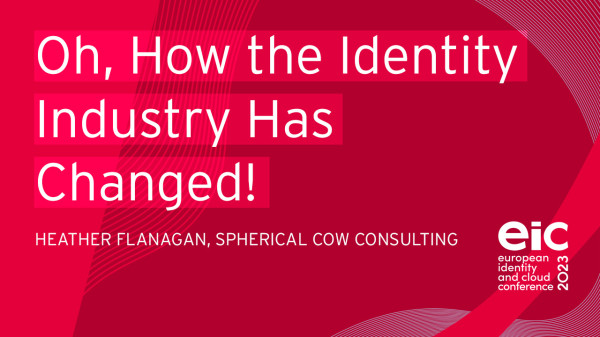
|
Since IDPro began its skills survey in 2018, we have seen technologies rise and fall and how IAM practitioners continue to struggle to feel proficient in their field. From the decline in directories to the power of personal identity, the IAM field is certainly not boring! |
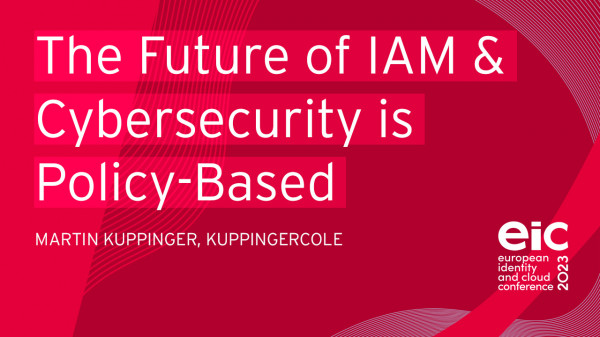
There are several sessions at this year’s EIC looking at the roles of policies in IAM, for modernizing and efficiency gains in IGA, for authentication and fraud detection, and for authorization. In his keynote, Martin Kuppinger, Principal Analyst at KuppingerCole Analysts, will take a broader perspective and look at why the future of IAM and cybersecurity must and will be policy-based. This involves policies in IGA, policies in cybersecurity, hierarchies of policies, policies for application developers and IaaS administrators, policies in Zero Trust, overcoming static entitlements, policies in the context of DID (decentralized identities), and other topics. He also will discuss what needs to be done where, such as Policy Governance, Data Governance, and Policy Lifecycle Management, and why the shift to policy-based approaches requires a multi-speed approach, with policies in new digital services coming faster than policies for modernizing legacy IAM.
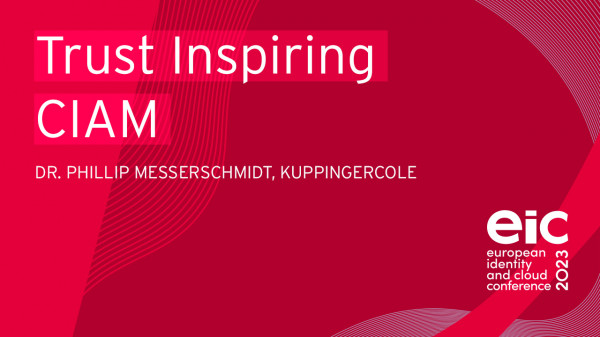
Confusing Customer Identity Management (CIAM) with traditional Enterprise IAM comes at a high price: Applying internal regulatory compliance requirements and heavy security challenges to customer-focused interactions could easily limit user experience in a way that it measurably affects your digital business success, with dropped or interrupted transactions. Building Identity & Access around your customers' needs requires a profoundly different approach, which is on the one hand a trust-driven interaction experience with your brand, and on the other hand, complies with KYC and Cybersecurity requirements. In this session, we will give you an overview on the current state of CIAM and future developments you should include in your considerations before deciding on how to move forward.
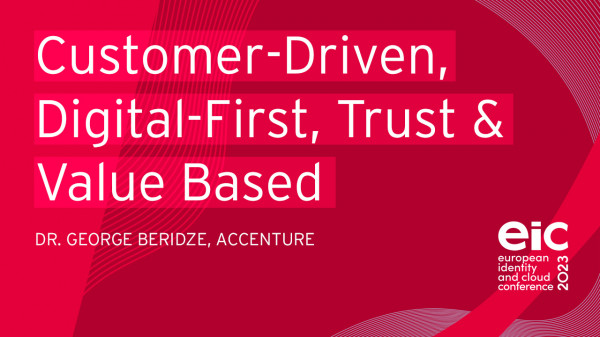
Data is Power. And as a popular comic superhero said, with power comes more responsibility. For companies offering digital services, the responsibility lies in storing the customer data securely. Growing number of global privacy regulations underpin this responsibility.
More and more organizations are using specialized Customer Identity and Access Management (CIAM) solutions which enable them to consolidate the data of existing customers while offering new and innovative ways to acquire new ones. CIAM tools can be used to prevent fraud, monitor suspicious activity as well as generate important business reports and statistics.
CIAM market is growing yearly but remains the most innovative in various IAM disciplines in to meet the fast-changing digital business demand. Utilizing modern, flexible, and scalable CIAM platforms will enable organizations to combine good customer experience with strong data security. Certainly, a recipe for a successful online enterprise!
This talk will give insights on how to strategize your CIAM journey and shed light on some pain points companies face when embarking on this exciting adventure.
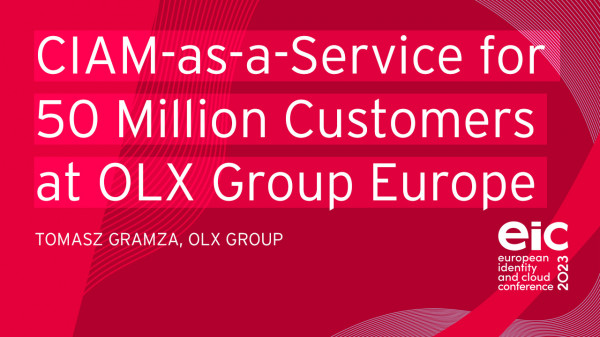
Still developing CIAM in-house? Discover the realities of serving 50 million customers using Hosted Customer Identity and Access Management (CIAM) as a service (SaaS) from a vendor.
Customer Identity and Access Management is one of the most critical platform components. How big of a risk would it be for the large enterprise to delegate it to the vendor solution? And how much risk would it be to not do it?
In 2019 our Eastern Europe business was struggling with Accounts Takeovers where botnets of 1 million IPs total size were involved in massive credential stuffing attacks. And we decided to replace all our legacy auth with a vendor solution.
In this session we will go through the key moments of such transition and the key learnings from the past 4 years. We won’t miss the aspect of value proposition, customer experience, real cost and return on such an investment.
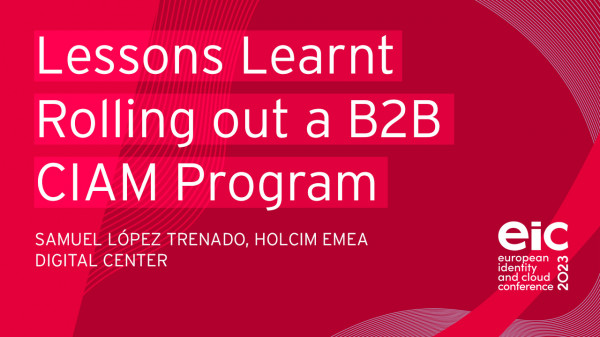
Holcim is the Global leader in innovation and sustainable and building solutions and we are offering different digital solutions to the partners (Customers, suppliers, carriers...) making business with us. The identity among those solutions definitely need to be centralized under a CIAM solution mainly focused in the Business to Business setup in order to improve management, customer experience and compliance with regulations. During this session, it will be shared the main pain points and the lessons learnt after more than one year rolling out a CIAM program.
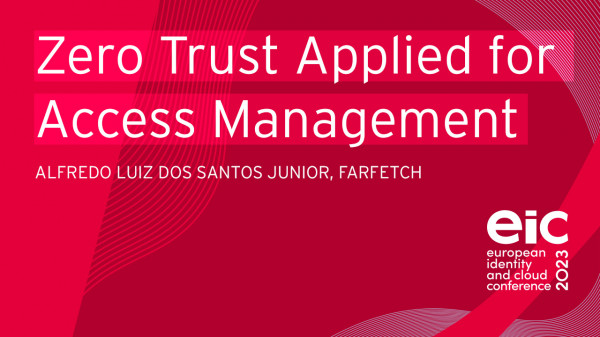
UX with Security in Corporate and Customer Access but including a huge monitoring approach to have the effect of Zero Trust for the users. I will Mix CIAM, Access Management, IAG and UEBA
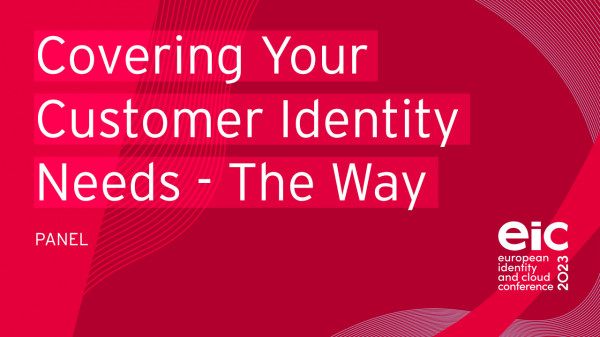
The Art of CIAM is to converge user Experience (UX) , security and privacy in a way that is seamless and unobtrusive for the user. In this panel session we will discuss the role of decentralized technologies, biometrics, and AI in Digtal ID, allowing for more secure and efficient authentication processes.
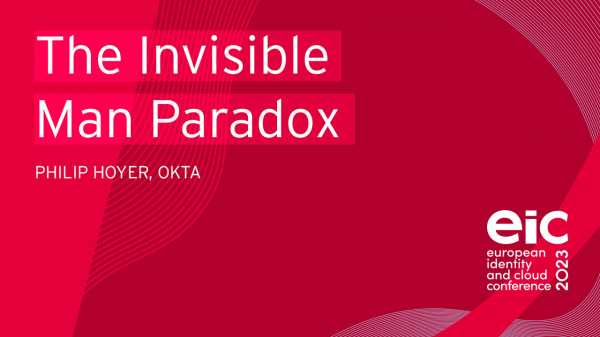
How changing requirements for a seamless yet secure customer experience affect your Customer Identity solution
Today's consumers live parallel lives, with one foot in the physical world and the other foot leaving many digital footprints across the internet. In the physical world, trust is easier to build and identity is easier to validate. In the digital world the consumer is The Invisible Man - more difficult to interact and connect with but wanting a simple, effortless digital experience with impeccable security.
In this session, we will explore how identity is the link between both worlds and is the centre of every great customer experience. From providing delightful experiences to ensuring security and privacy, we will show how the right Identity Solution resolves the Invisible Man paradox, building connection and trust in the digital world.
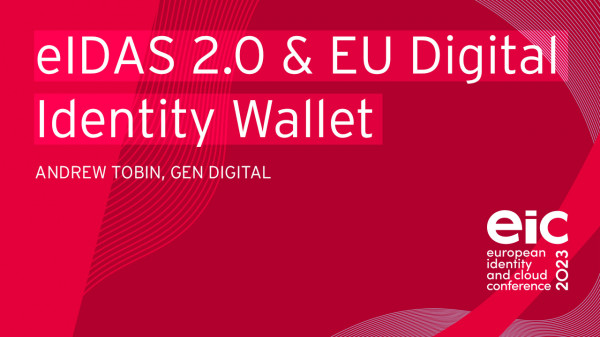
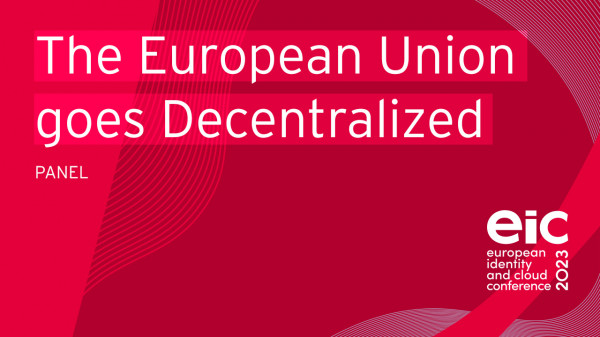
The European Union’s regulation on Digital Identity, eIDAS, is currently being overhauled to adopt decentralized identity principles. The goal is to provide all citizens and residents across the EU with highly secure and privacy preserving digital wallets that can be used to manage various digital credentials, from eIDs to diplomas to payment instruments. Decentralized identity principles aim at giving freedom of choice and control to the end-user. Ensuring security and interoperability, however, will be challenging — especially in the enormous scale in terms of users and use cases the EU is aiming at. The choices made in eIDAS will have a huge impact on digital identity in the EU and beyond.
The so-called “Architecture and Reference Framework” (ARF) defines the technical underpinnings of eIDAS v2. Many experts from the member states and the Commission have been working on this framework over the last year, trying to select the best combination of technologies and standards out of the enormous number available in the market today. This talk will introduce the ARF and explain what architectural patterns and technical standards are adopted and how the challenges mentioned above are addressed in order to leverage on the vision of the eIDAS v2 regulation.
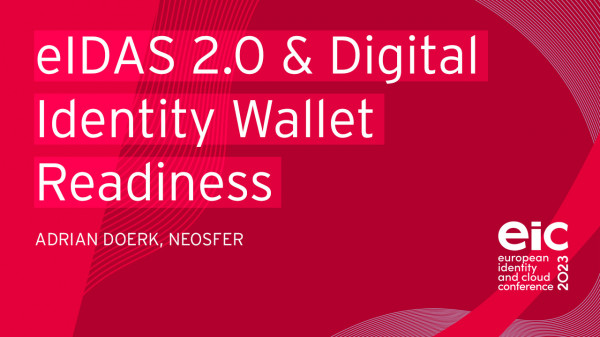
The revision of the eIDAS regulation introduces new requirements, challenges as well as opportunities for organisations. In this talk Adrian Doerk provides a structured guidance of aspects organisations need to be aware of to be well positioned in the market. After a general introduction to the eIdAS ecosystem, the focus will be on organisations who want to issue and verify qualified electronic attestation of attributes to/from the European Digital Identity Wallet.
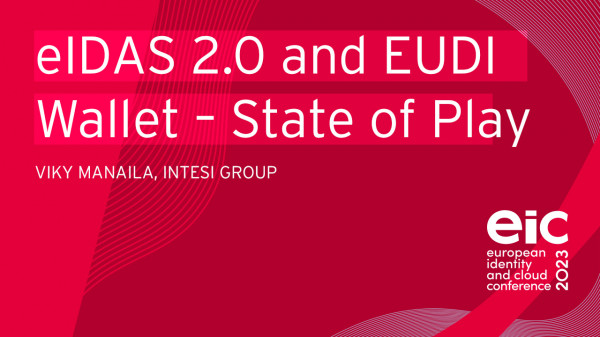
While eIDAS 2.0 is still under legislative process, closing to the end, the European Commission prepares the framework for the EUDI Wallet reference implementation, and standardization bodies are working on developing new technical standards.
There is a real need for updated information on all efforts around eIDAS 2.0, as the implementing deadlines are very tight.
The session will shed light on latest developments and impact on the market.
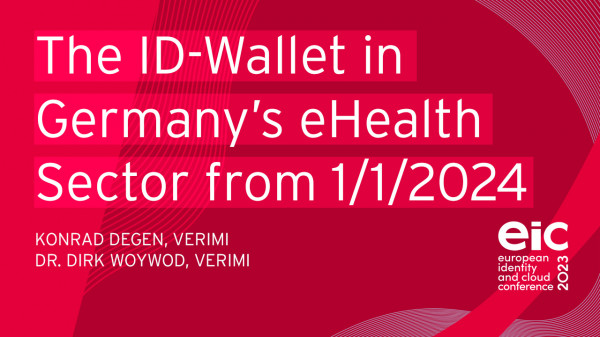
Germany's healthcare sector will introduce its own ID wallet called "Sectoral IDP" for all statutorily insured persons on 01.01.2024. The issuers of the wallet are the health insurance companies, and approval will be granted in accordance with the extensive specifications of gematik (the regulatory authority). The ID attributes are issued by 2 issuers: PID and health insurer. The sectoral IDP is based on the OpenID Connect (core and Federation), Open Authorization 2.0 (OAuth 2) and JSON Web Token (JWT) standards. The presentation will describe the specific gematik requirements for product and operations of the ID wallet as well as their possible implementation. Despite the closed system in eHealth (Telematics Infrastructure) by definition, bridges to developments of ID wallets outside the sector such as EU, AML and eIDAS will be shown.
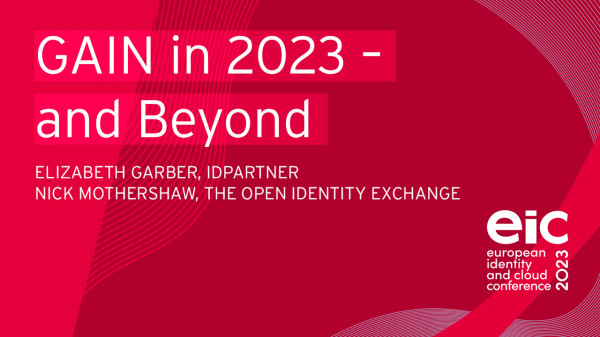
This session will share how the concept of a Global Assured Identity Network (GAIN) has evolved since 155 identity experts proposed it in 2021. It summarizes a recent paper by the non-profits that guide the GAIN vision.
GAIN remains a call for collaboration toward globally interoperable identity assurance at-scale - a purpose that underpins the goals of governments, intergovernmental agencies, and private industry. It has inspired multiple working groups and continues to unite six non-profits - even (and especially) as the technical and policy landscape evolves to include emerging standards (e.g. MDLs, DIDs, VCs) and regulation (e.g. eIDAS 2.0).
This talk reflects on GAIN's relevance in today’s landscape and shares progress. It includes a deep dive into the technical community group at the OpenID Foundation, which has built a prototype that demonstrates cross-network trust and high-assurance identity data exchange. It now turns its attention to digital wallets, verifiable credentials, legal entity identifiers, and government-issued IDs.
It also reviews forward-thinking policy work by the Open Identity Exchange, which paves the way for Smart Digital IDs. Their Global Policy Metadata Framework proposes the standard publication of policy characteristics. In this world, policy metadata is shared between each trust framework through trusted wallets.
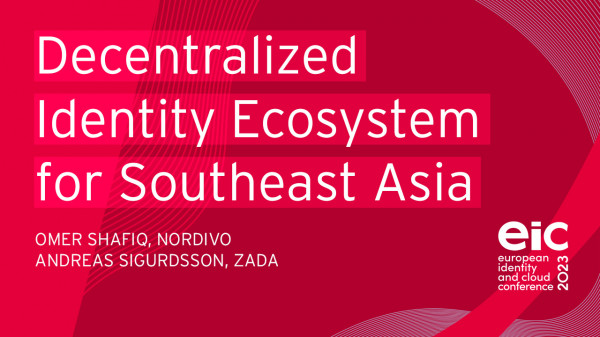
Decentralized identity has made its waves in the EU with European Blockchain Services Infrastructure (EBSI) and in the US with various funded projects. A vast market in south-east Asia stays untapped. We have enabled our partner organization ZADA to build a decentralized identity ecosystem that connects various southeast Asian countries with numerous cases like 'Decentralized Vaccination TravelPass', 'Employment IDs', and 'Government issued Educational Credentials'. The journey of a decentralized identity platform from ideation to MVP and to a scalable production system can bring tremendous insights. We were able to successfully enable the public sector in Myanmar to engage with self-sovereign identity and bring value to its citizens by issuing over more than a quarter million digital credentials. Monetization of these credentials was an essential factor for us. These self-sovereign identity credentials varied in use cases and were verified by Singapore immigration, Public sector hospitals, the Education Ministry of Myanmar, the Health Ministry of Myanmar, and various other private sector vendors. Our journey covers various use cases in EdTech, HealthTech, IAM, and KYC. Explored right, these cases can help us dive into how enterprises can engage with the southeast Asian identity market.
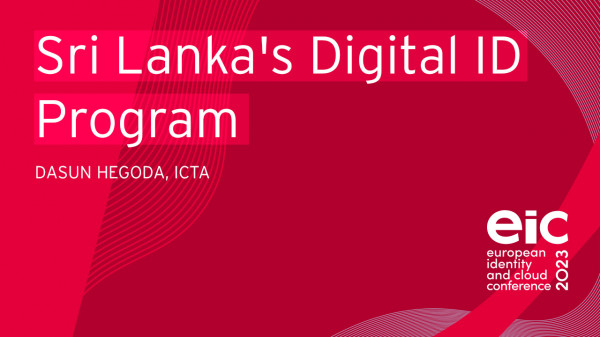
|
Sri Lanka has successfully implemented a Digital ID POC based on the MOSIP platform. |
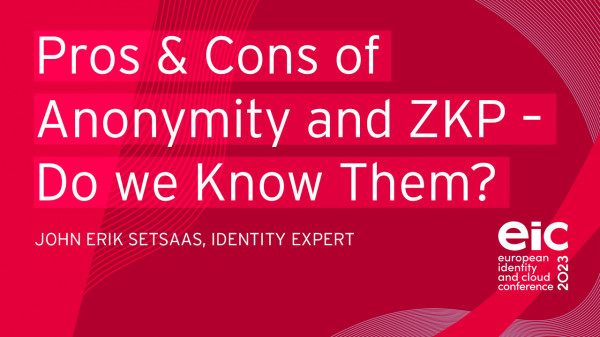
Within the digital identity wallet-movement (and especially SSI), there is a lot of focus on proving something about yourself, without revealing anything else, also known as ZKP (Zero-Knowledge Proof). It is important to realize that if we build this into the future identity systems, we will also grant any criminal the right to full anonymity.
While there are some marginal use cases (buying beer and adult materials) where we might want this, using ZKP also excludes accountability, unless there is a way to reveal the identity behind the proof. This would then be pseudonymity, and the challenge here, is who is authorized to reveal this, and how to prevent mis-use.
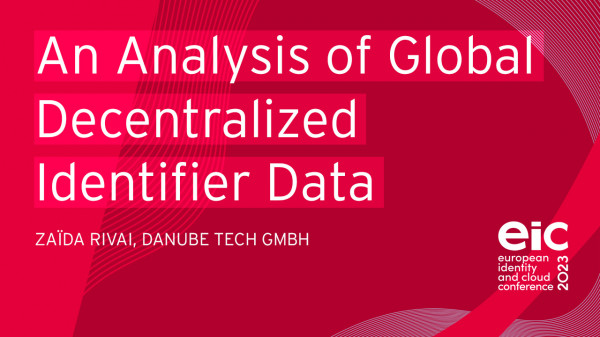
Decentralized Identifiers (DIDs) offer a unique solution for digital identity verification, allowing individuals to have complete control over their own identity and eliminating the need for a centralized registry or authority. In this session, we will explore the insights that can be gained through the analysis of global DID data. At Danube Tech GmbH, we have developed version trackers that monitor various DID methods, such as did:indy, did:ebsi, did:ion and others, collecting and storing data on DID transactions in our database for analysis. During this session, we will present the results of our latest analyses, including trends in DID transactions over time, distributions across different verification methods, and errors found in DIDs and DID documents. This information can be valuable for businesses looking to understand and utilize DIDs in their operations, as well as for individuals seeking to use DIDs for their own digital identity management.
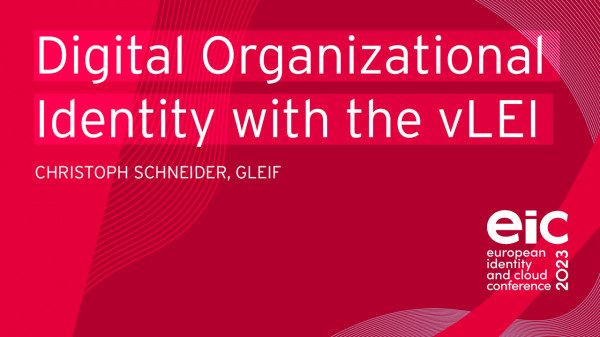
|
With heightened reliance on remotely delivered services and transactions, the need for safer and sounder digital identification and verification is required and will become the norm in the future. This especially is true looking forward to mandates for the adoption of zero trust frameworks in which digital credentials will be issued and then used for identification and operational purposes. GLEIF is committed to making concrete and lasting improvements to the process of identity verification by leveraging the Legal Entity Identifier (LEI) in digital tools. GLEIF has made the LEI verifiable by creating the vLEI (verifiable LEI) with digital credentials that deliver decentralized identification and verification for organizations as well as the persons who represent their organizations either in official or functional roles. GLEIF has made much progress on developing the governance, credentials and infrastructure since introducing the vLEI in 2020 and will share an updated at this progress in this session. |
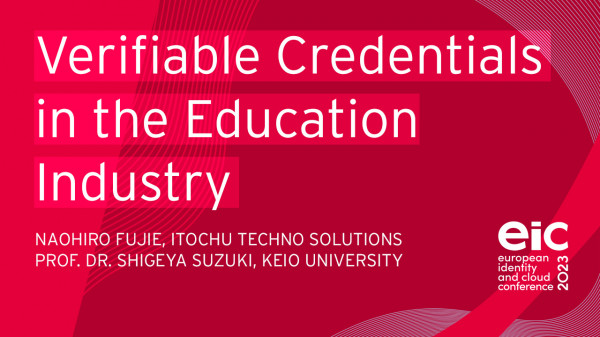
I will talk about lessons learned from several projects which tried to adopt verifiable credentials as learning credentials in educational institutes such as interoperability with the OpenBadge credentials.
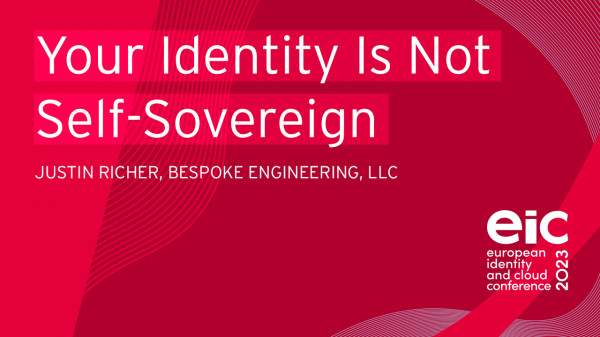
Are we really in control of our identities, are they merely assigned to us, or is there something else at play?
The promise of a "self-sovereign identity" seems great: you know who you are, and through the magic of technology you can prove to everyone around you that you are who you say you are. The technology to enable this is being built and deployed, but is it the right solution? Even more fundamentally, is it the right model at all?
In this session, we'll examine the core concept of "self-sovereign" identity in the light of how society has historically viewed identity and how our digital systems have modeled identity in different ways over time.
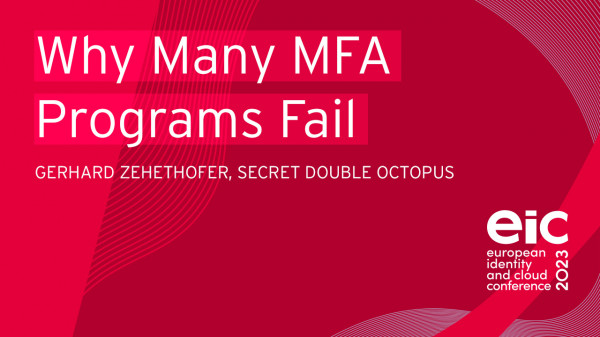
Like many businesses, you started the MFA journey and might even consider it at a level of maturity. Yet, when questioned to rate compliance coverage or cyber insurance requirements for strong authentication business-wide, do you have a moment?
Workforce identity workflows are complicated, with an extensive portfolio of assets and legacy applications that create gaps in strong authentication coverage. However, organizations need to trust nothing and no one - and have to prove strong authentication is in place to regulators and cyber insurance underwriters.
In this session we will explore ways to strengthen your authentication system and fill coverage gaps:
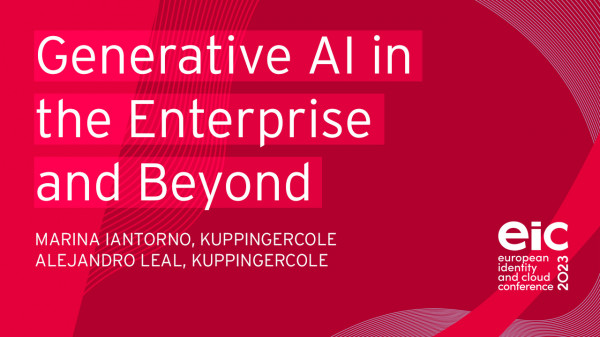
Generative artificial intelligence (AI) has the potential to revolutionize a wide range of industries and applications, from creating realistic images and videos to generating natural language responses. This Future Enterprise Use of Generative AI Deep Dive session will explore the current state and future trends of Generative AI technologies. Attendees will gain a comprehensive understanding of Generative AI technology and its current and future applications in various industries.
Over the last years, Generative AI has presented significant advancements in industries such as software development, finance, insurance, education, healthcare, government, manufacturing, etc. It is expected that in the coming years Generative AI will enable businesses and organizations to create more personalized and engaging experiences for customers, optimize operations, and make more accurate decisions.
However, with great progress comes great responsibility. The growing sophistication of these algorithms also raises concerns about their impact on society, such as the potential for misuse, bias, and the displacement of human jobs. Generative AI poses significant challenges as well as opportunities. It is therefore essential to balance the development of Generative AI with responsible research and ethical considerations to ensure that its advantages can be harnessed while minimizing its potential disadvantages.”
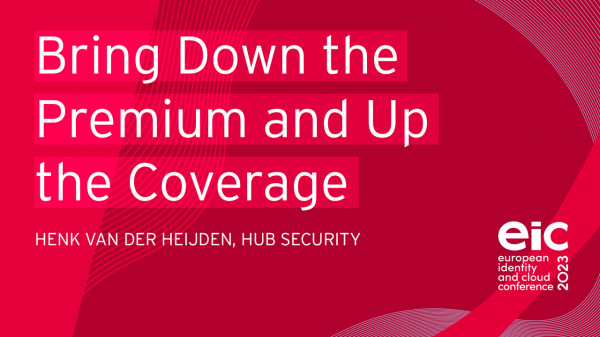
More and more it becomes difficult to Insure yourself against a Cyber attack. Understanding all the different vectors of your risk posture, the flood of different tools and checklists that need to be taken into account and the way to consolidate this risk into an overarching risk dashboard is an immense challenge for CISO's, Risk Managers and their senior leadership. Because of this major challenge and a non-standard way of calculating the risk; more and more Insurance companies are putting a high demand on the information provided in order to get a proposal for a Cyber Insurance and then, if and when a Cyber Insurance is offered, the premiums and coverage become another big challenge and financial burden on companies.
The presentation will highlight these challenges and will provide hints and tips on how to deal with this problem, ensuring to get Cyber Insurance at the lowest possible premium and with the highest coverage.
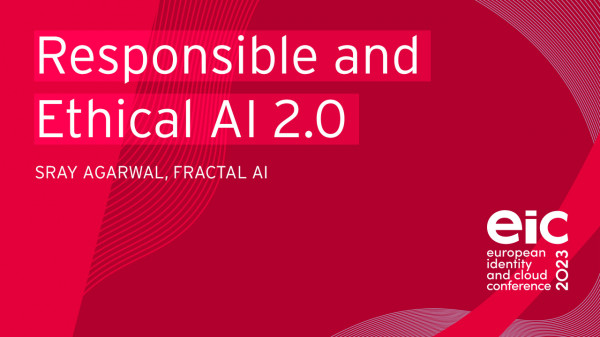
In the last 10 years machine learning has become ubiquitous and touches all lives in ways that was unimaginable before. The machines can make decisions that required considerable human effort at a much faster speed and reduced cost with a little human oversight. As a result, machines don’t just have a higher than before influence in shaping our lives but are also under increased scrutiny by both regulators as well as user rights advocates.
The adage “with great power comes great responsibility” has long been used – from French revolution to superhero comics. It has never been truer as the great power that machine learning wields is now in the hands of almost anyone making a software product. It ranges from giving people access to the funds that can alter their lifepath, medical diagnosis that can increase their life expectancy or reduce it dramatically to their social media feed that cannot just provide them the content that keeps them engaged, but also polarise their beliefs by feeding them information that reinforces their existing notions.
With the growing influence of AI technologies and the corresponding scrutiny, the way AI development happens is beginning to change. The full data science lifecycle needs to incorporate the elements of responsible AI and the professionals who know how to design and implement these will be the ones that employers will look for.
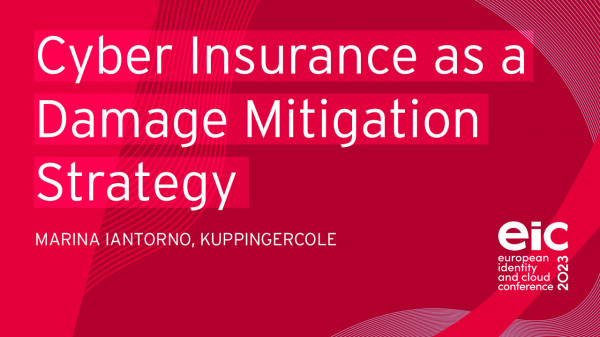
Digital transformation came with a wide range of advantages, but it also opened the door to potential cyberattacks. Every organization faces the risk to be the target of a cybercrime, but the transition to business digitalization leaves a greater room to present vulnerabilities in the system, and if attackers happen to identify them, the attack will occur. The world is changing rapidly, and companies must change with it, and so insurers see their possibility to break into the market. Is it worth to have a cyber-insurance policy? Does it cover all the damages? What is the extent of insurers responsibilities and the company one? Could these cases go to court and under what conditions?
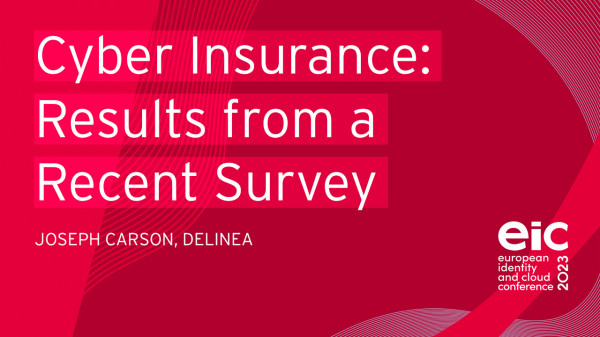
After several tumultuous years, the cyber insurance safety net is in question as costs rise and coverage contracts. Research conducted with IT security professionals to understand the real-life experiences companies have in obtaining and using cyber insurance.In this session we’ll unpack the survey findings and put them in context. Join the discussion to prepare for your next cyber insurance assessment so you end up with coverage and rates that accurately reflect your organization’s risk profile.
Joe Carson will talk about
And help you find answers to these questions
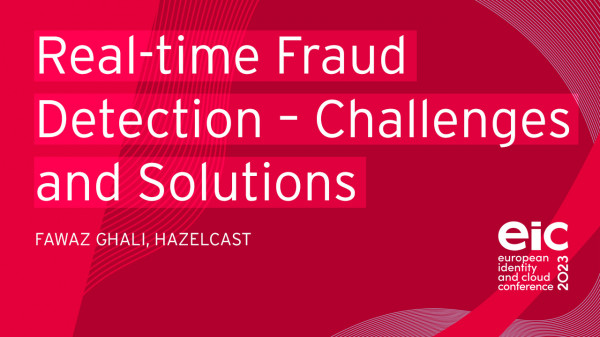
Fraud can be considerably reduced via speed, scalability, and stability. Investigating fraudulent activities, using fraud detection machine learning is crucial where decisions need to be made in microseconds, not seconds or even milliseconds. This becomes more challenging when things get demanding and scaling real-time fraud detection becomes a bottleneck. The talk will address these issues and provide solutions using the Hazelcast Open Source platform.
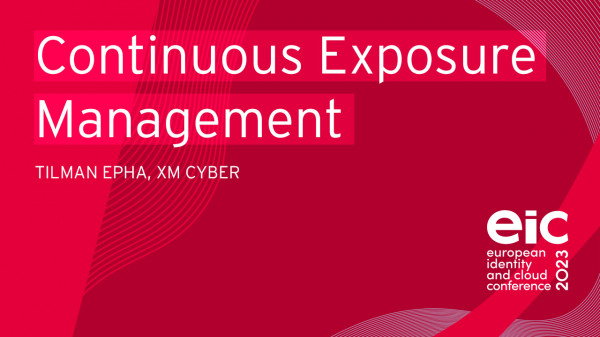
Companies are facing increasingly complex security threats. Many are struggling to assess their own security risks due to an inability to address potential issues as they arise, due to the breakneck pace at which issues are disclosed, and teams' ability to address said issues as they accumulate and because the huge number of security tools in use create diagnostic fatigue.
Vulnerability management programs rarely ever match the overall scale of the organization, boosting the number of potential points of exposure. What's more, besides vulnerabilities, attackers are increasingly leveraging exposures such as misconfigurations and stolen credentials to gain access to companies' core business. Because of this, attack paths to critical assets are often overlooked or identified too late.
Instead of looking at vast numbers of isolated issues, XM Cyber aggregates them into an attack graph to proactively identify hidden attack paths and weaknesses in both the cloud and on-premises. XM Cyber helps organizations efficiently address the issues that can have the greatest impact on organizational risk. Then teams can eliminate attack paths at critical junctures, i.e., choke points, in order to achieve ultra-efficient risk remediation.
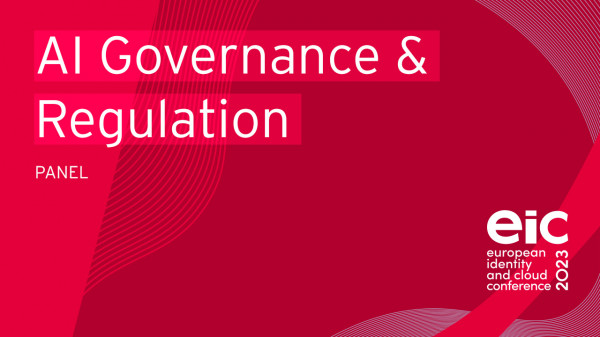
For many years public concern about technological risk has focused on the misuse of personal data, with GDPR, most hated and loved at the same time as one of the results. With the huge success of LLMs and generative AIs such as ChatGPT, artificial intelligence soon will be omnipresent in products and processes, which will shift regulator´s attention to the potential for bad or biased decisions by algorithms. Just imagine the consequences of a false medical diagnose, or of a correct diagnose created by an AI and then not accepted by the doctor. Not to mention all the other fields where bad AI can be harmful, such as autonomous cars or algorithms deciding on your future credibility. Inevitably, many governments will feel regulation is essential to protect consumers from that risk.
In this panel discussion we will try to jointly create a list of those risks that we need to regulate the sooner the better and try to create an idea on how this future regulation will impact the way we use AI in our bsuiness and private lives.
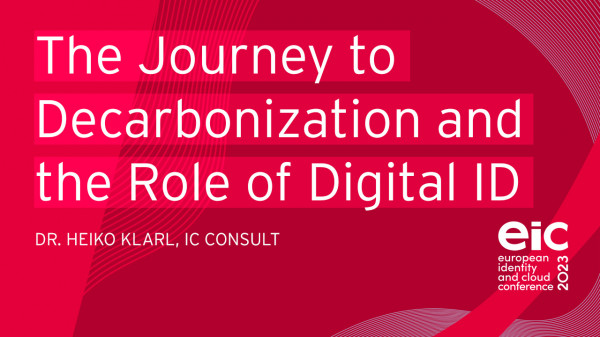
In this session, we will explore how technology is playing a crucial role in decarbonization efforts. We will discuss how Customer Identity and Access Management (CIAM) can enable digital transformation and support the energy transition. Additionally, we will delve into the benefits of using Centralized Entity Management to provide customers with a single ID across all digital channels, improving the user experience and enabling personalized interactions. Finally, we will emphasize the importance of a secure customer journey and persona composition to protect sensitive data, ensure customer trust and regulatory compliance, such as GDPR. Join us to learn how these key components can help drive a sustainable and customer-centric future.
Learn about:
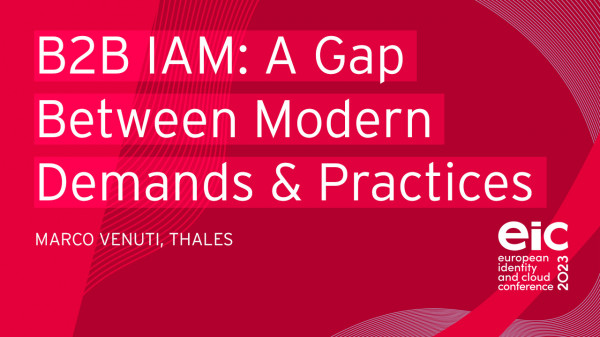
Most enterprises nowadays need to grant access to multiple business partners daily as they heavily rely on online interactions (online relationships) with one another.
Thus, an ever-expanding, interconnected digital ecosystem emerges, the complexities of which frequently result in operational inefficiencies, security risks, increased administrative costs, and unintuitive user experiences.
These challenges are long lived in the B2B identity management space. Yet still today, many organisations continue to struggle using outdated, homegrown and oftentimes error prone centralised IAM systems.
This session will unwrap modern, decentralised solution trends in the fast-growing segment of IAM using real-life use cases. It will also explore best practices for digital access and delegation management for business partners - seamlessly and securely at scale.
Vertical risk management and complete identity governance can only be achieved through integration of critical platforms with other systems and applications in use and by either integrating existing point-solutions or reducing their number altogether. Integration of the identity-platform with SAP is one of those major challenges for many organizations today.
One Identity’s approach to this challenge is through a unifying, standard integration into SAP as well as other systems and applications to establish a common GRC framework and security concept. Which includes preventing isolated environments. To establish SAP-internal governance and minimize risk within the platforms privilege landscape most organizations use specialized embedded tools like ECS (Easy Content Solution) from IBS-Schreiber Solution. Integrating the identity management platform with the SAP rule-set administration allows SAP Rule sets to be applied directly, run SoD-analysis fast and efficiently and extend them to other systems and applications, such as MS AD, AAD. The potential value of this approach is significant as it allows a preventive risk-assessment throughout the whole SAP-stack.
This integrative approach also extends to the SAP Firefighter concept for it to be applied to the rulesets and extend these into other systems. The objective is clear: Simplify risk assessment and management, establish a unified identity administration framework and as baseline - reduce cost.
In short – it lays the foundation and framework for solid Governance.
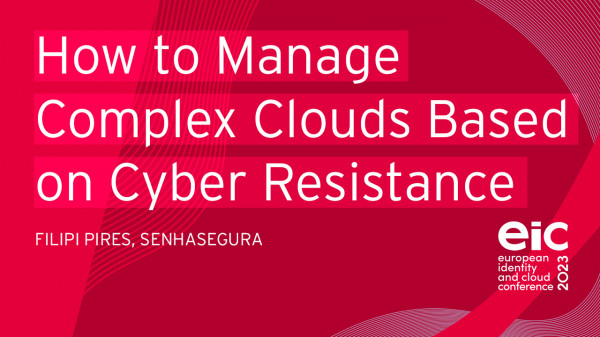
You have probably heard about Cyber Resilience, and how about Cyber Resistance? What should be the differences between the two terms in the context of Cybersecurity? Cyber Resistance is the same or not?
Prioritizing where to focus efforts first when attack scenarios are almost endless is a complex task. There are often millions of potential attack paths. Most organizations do not know what those paths are or how to prioritize which ones to close first if they can be closed at all.
During this presentation, we will be understanding the differences between Cyber Resistance and Cyber resilience, and how we can apply both concepts to our current technology landscape, besides understanding how we can identify the High-Value Target (HVT) in your organization.
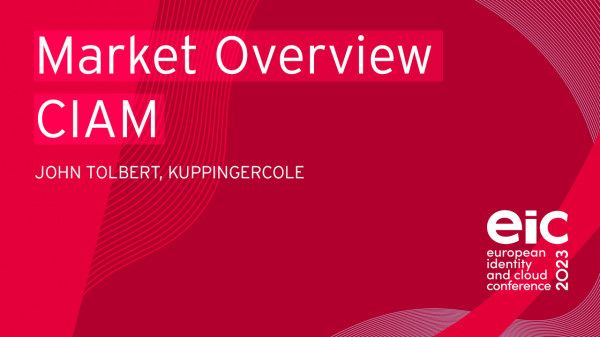
This session provides an overview of the CIAM solution market and provides you with a compass to help finding the solution that best meets your needs. In a recent Leadership Compass, KuppingerCole´s Senior Analyst John Tolbert examined the CIAM market segment, product/service functionality, relative market share, and innovative approaches to providing SOAR solutions.
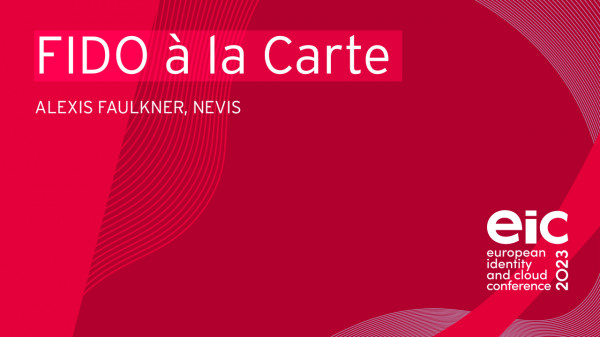
Finding the right passwordless solution can be a daunting task. Searching the web for a passwordless authentication solution will present many options for various use cases. With so many options, how do you choose the solution that best meets your requirements?
This presentation will help guide you through the different FIDO standards, Passkeys and provide real-world examples of how they are being used today. We'll explore the benefits of FIDO, including increased security and improved user experience, and discuss the challenges and limitations.
If you're ready to say goodbye to passwords and embrace the future of passwordless authentication, join us and learn how to find the right FIDO solution for your passwordless needs.
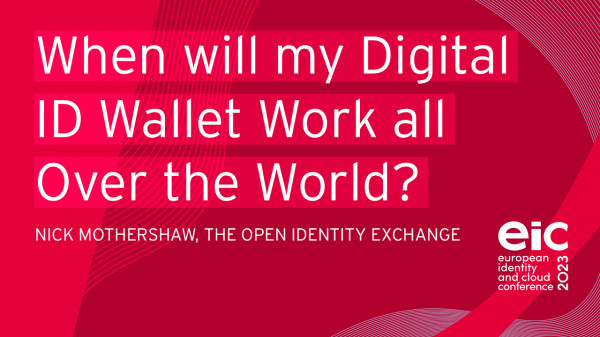
When I travel aboard or do business with someone from outside my country, my payment cards and phone work across international boundaries. When will my Digital ID do the same?
This presentation will share how OIX’s work on Global Interoperability, part of the GAIN initiative, is defining how this will be possible through smart digital IDs or wallets that dynamically adapt to the policy rules of each new trust framework they encounter in a way that works seamlessly for the end user.
So, when I fly to the EU from the US my Digital ID from my US based wallet provider reads the rules of the EU trust framework and simply adapts. I don’t need to get a new local Digital ID for my visit to the EU. The EU trust framework policy rules will be described using a new globally applicable Open Policy Rules Exchange Framework that allows all frameworks to publish their policy characteristics in a standard machine-readable way.
My digital ID wallet contains key ‘golden credentials’ that should be accepted all over globe: passport, driving licence, bank account, telco account and my digital national ID card. Each trust framework will value these differently in its own Assurance Policy, which can also be published via the policy rule exchange framework. To make this work, new proofing and data content standards for some of the golden credentials will be required.
Technically, exchange of policy rules will be a decentralized approach, where policy rules are shared directly from each trust framework only to wallets they trust. The presentation will also outline the technical architecture to underpin this, and how the Open Policy Rules Exchange Framework will fit as a policy component as part of the Open Wallet Foundation architecture.
OIX is working with and analysing various trust frameworks around the global to create the Open Policy Rules framework, including the UK, Canada, EU, Australia, Singapore, MOSIP and Bank ID Sweden.
Come and find out more about how OIX’s vision of allowing us all to have a trusted Digital ID that can be accepted anywhere in the world can be achieved.
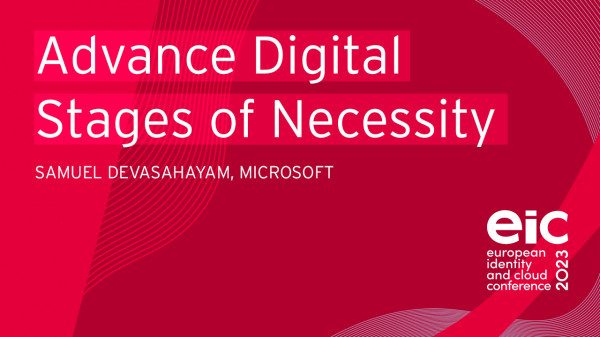
Samuel Devasahayam will discuss the past decade of identity sights through Microsoft’s lens, demonstrating that security in a digital age remains valuable, and detailing what these insights imply for the next decade to continue building customer trust and resilient infrastructures.
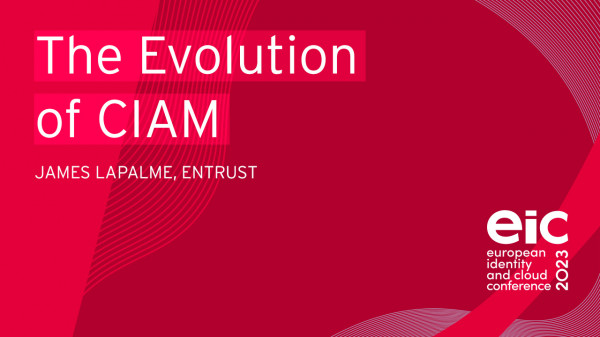
With digital transformation continuing to change the way customers interact with businesses, organizations need to provide a personalized, seamless and friction free experience to their customers to increase engagement and retain subscribers. All of this amidst a rapidly increasing threat landscape and a growing awareness of data privacy and ownership. Join James Lapalme from Entrust, to learn about the evolution of CIAM to meet the customer expectations of today, while looking ahead as to what the future of Identity holds.
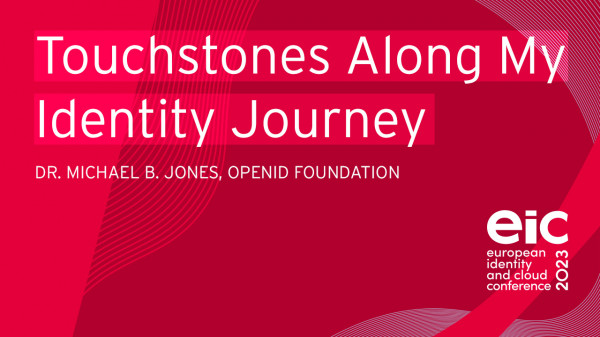
In 2005, Kim Cameron excitedly told me about digital identity and set my life on a course to “Build the Internet’s missing identity layer”. In this talk I’ll tell key stories from my identity journey – stories of the people, ideas, and lessons learned along the way. I’ll speak of technology and collaboration, usability and business models, solving problems people actually have, and building new ecosystems. Come with me on this journey of exploration, trials, triumphs, and humor as I recount touchstones of the human endeavor that is digital identity.
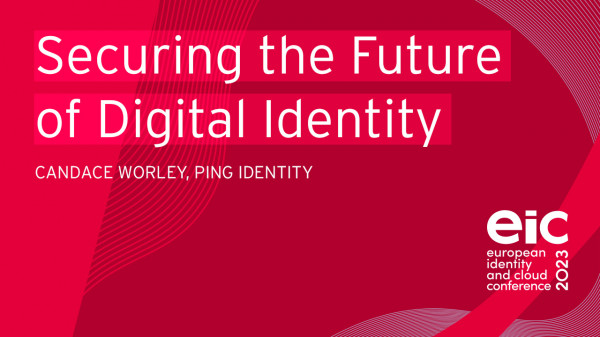
Today’s identity systems are a centralized collection of user data, and have become the #1 target for attackers. According to the Verizon DBIR, more than 80% of breaches start with compromised credentials.Decentralized identity represents a massive paradigm shift to a safer, more secure future by making the user's device the transport mechanism for that single user's data. In other words, no more “trusted” third parties. Decentralized identity eliminates the need to build connections into federation systems, and reduces the amount of personally identifiable information organizations must collect.In short, we’ll discuss how shifting to a decentralized identity model reduces risk for organizations while simultaneously improving users privacy.
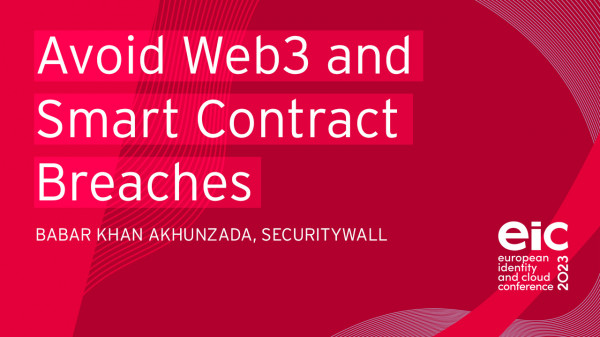
Web3 is a revolutionary changing aspect of technology in the current era but protecting Web3 will be a challenge considering how smart contracts are challenging. New businesses utilizing blockchain technology are more focused on business while their different assets need eyes, such as the most vulnerable DApps and Web3 services.
Decentralized applications, commonly referred to as dApps, are not controlled by a single point of authority. Instead, they run on a blockchain or a P2P network, making them more complex and riskier than traditional applications.
In this talk, we'll discuss how hackers are utilizing their techniques to attack web3 and smart contracts and what are best practices for enterprises to prepare for the challenge.
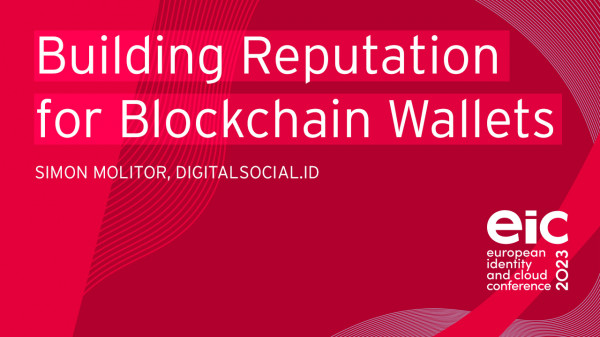
There has been a heated discussion between how (not) to use verifiable credentials, decentralized identifier and soulbound tokens for building better digital identities. We believe there is room for both or even a merge of on- and off-chain technology.
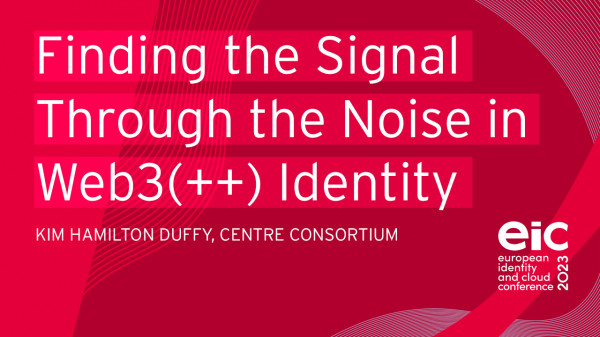
2022 brought a lot of activity in web3/crypto identity solutions: Soul Bound Tokens, Verifiable Credentials, and even web5?! In this year-in-review we'll examine the varying approaches, the problems they were trying to solve, and discuss how this can inform all of our user-centric identity efforts.
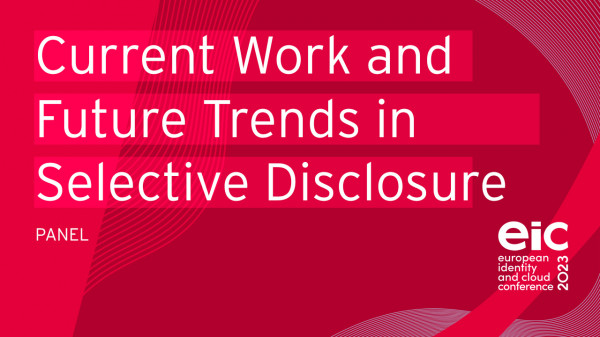
There’s a lot of foundational work happening in the space of Selective Disclosure (SD) right now. Selective Disclosure enables you to have a token with many claims (say, an ISO Mobile Drivers’ License (mDL)), and only release the claims necessary to the interaction – for instance, your birthdate but not your home address. Selective Disclosure enables Minimal Disclosure. This is sometimes realized using Zero Knowledge Proofs (ZKPs) but that’s not always necessary.
In decentralized identity ecosystems, users hold their own credentials to share them with others when needed. One key requirement for these credentials is selective disclosure: instead of sharing the entire credential, users should be able to share only the minimal amount of information necessary for a given use case. This is where SD-JWT comes in.
SD-JWT (Selective Disclosure JWT) is a new format for enabling selective disclosure in JWTs. It is based on the JOSE family of standards for signing and encryption, making it easy to understand and implement.
Developed by the IETF OAuth Working Group, SD-JWT is not limited to verifiable credentials, but can be used universally to provide selective disclosure for any JWT.
Due to its simplicity, SD-JWT has quickly gained traction, with several implementations already available and ongoing adoption as an important building block in both commercial and public projects. In this talk, we will introduce the concepts behind SD-JWT and provide a detailed overview of its capabilities and benefits. We will also discuss the current state of SD-JWT adoption and future directions for its development.
Some of the current work pertinent to Selective Disclosure is:
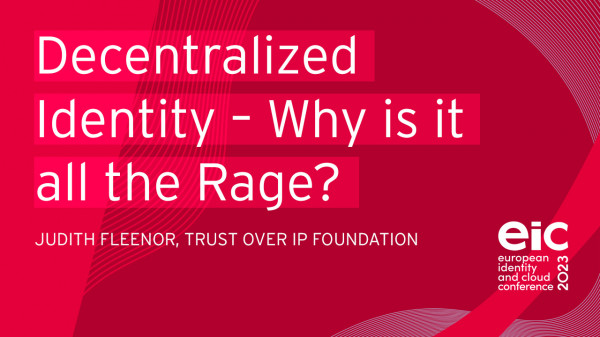
From digital identity to full scale digital trust, this session is perfect for anyone new to identity, as well as identity professionals who are trying to get a handle on what decentralization is all about and why it is so important for Internet-scale digital trust.
In this session, we will cover a brief history of how the identity landscape has gone through an evolution from the dreaded username and password, through centralized, federated and social logins, to now the need for decentralized solutions that support digital trust for both human and objects.
We will explain the various actors involved in a decentralized identity trust triangle, what role technology plays (e.g., digital wallets and digital credentials), and how governance of an ecosystem fits in to create the trust diamond. We will discuss various technical components that may be employed and what is required — and more importantly what is not? We will also present how decentralized trust solutions can support the trust of objects that have nothing to do with human identity, but are necessary to create a digital trust landscape that enables digital transactions to happen seamlessly, efficiently, and automatically.
We’ll also touch on how the traditional identity solutions and emerging decentralization can co-exist in context appropriate settings.
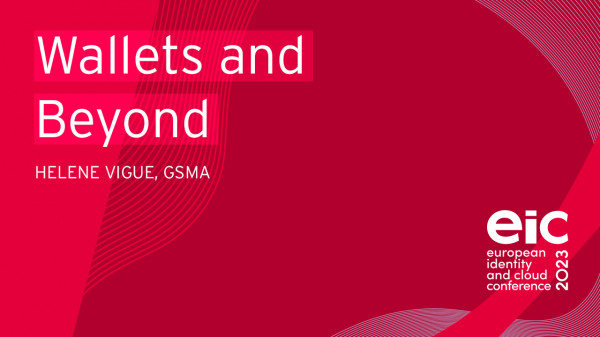
The digital identity paradigm looks set to evolve. Citizens might rely on digital identity wallets within a few years. As the metaverse and Web 3.0 take shape, users will need more than ever to trust who they interact with and be protected against fraud. How are mobile operators approaching these evolutions? This session will bring GSMA perspective on the mobile industry’s contribution to securing digital services, as the identity landscape shifts. Helene Vigue will share how tomorrow’s digital identity may build on mobile operators’ assets and services.
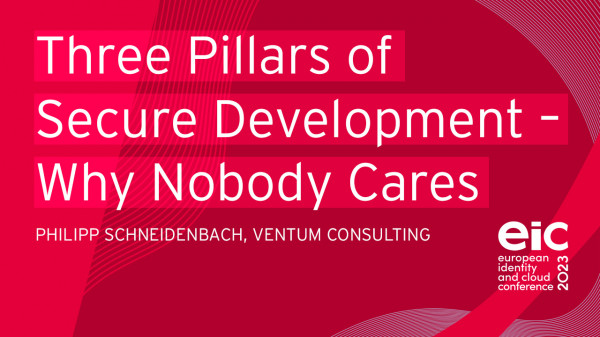
Speed to market, extensive use of so-called standards and the quest for low cost: Successful product development is using lopsided metrics. That comes with a big penalty - from physical product safety and cyber security, companies around the world spend big money on fixes that often come too late. Learn about three often overlooked pillars of successful, resilient product lifecycles and what leverage unexpected skills like penetration testing can apply.
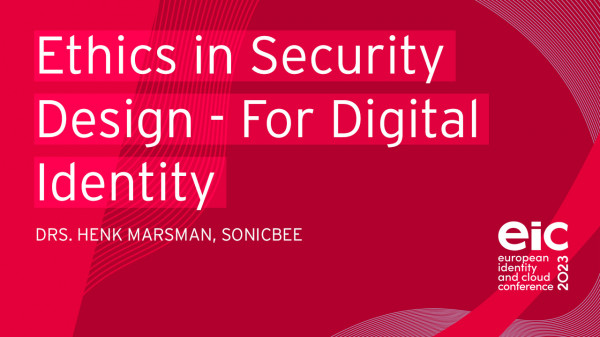
Digital Identity and Security solutions impact our environment, typically in a positive and securing manner. However research shows that increasingly digitization of identity services, for digital identity, also exclude and harm individuals.
In this presentation Henk will detail his research into the impact of digital identity solutions on nation state level and how to start involving ethics in the design and implementation of these solutions.
The findings also apply to designing and implementing security solutions for other purposes than digital identity.
The approach to engage with ethical conversations during design will be explained theoretically, linking to the background of Value Sensistive Design (https://en.wikipedia.org/wiki/Value_sensitive_design) and made practical by case studies of Ethics in Security Design.
Henk has been researching the ethics of digital identity at Leiden University, NL, in 2022.
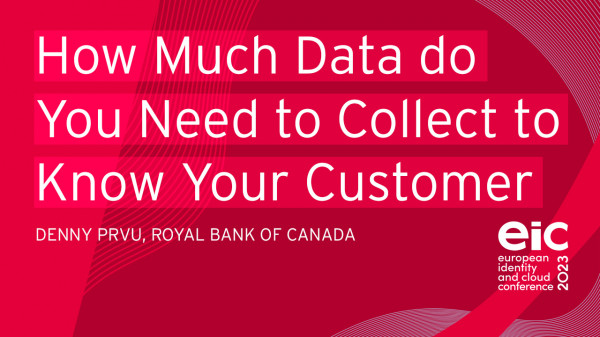
Overview of types of data and how it can be used as well user consent models that organizations should consider with consumer facing services
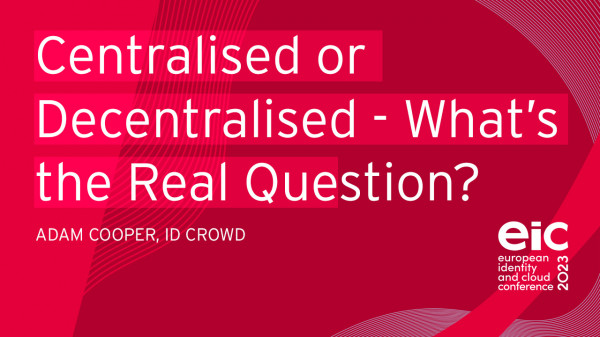
There are clear battle lines drawn between the centralised and decentralised worlds, but how much of this is ideology and how much is simply a misunderstanding of how services are delivered, rights protected, and trust established? Both models have advantages and disadvantages but that doesn’t mean that one should simply replace the other.
Governments need data about us to plan services such as where schools and hospitals should be built or where the most vulnerable in society are so that they can be supported. That data can also be used to cause harm, but technology alone will not solve the problems of control, protection of basic rights, and the delivery of fair and fraud resistant services.
In this session Adam Cooper seeks to identify the real questions we should be asking and provides his own insights based on over a decade of working with governments, citizens, and the private sector to deliver better outcomes for all of us.
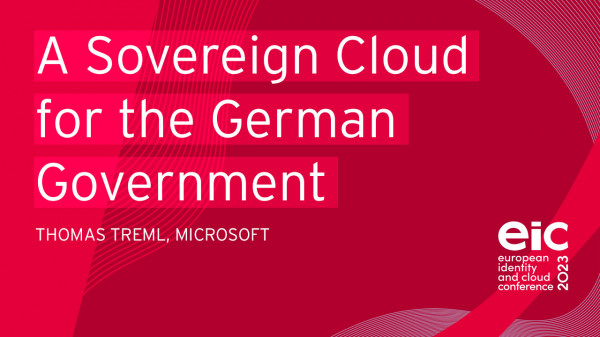
You will learn about the Sovereign Cloud for the German Government, this solution is based on Azure and operated by Delos Cloud Gmbh
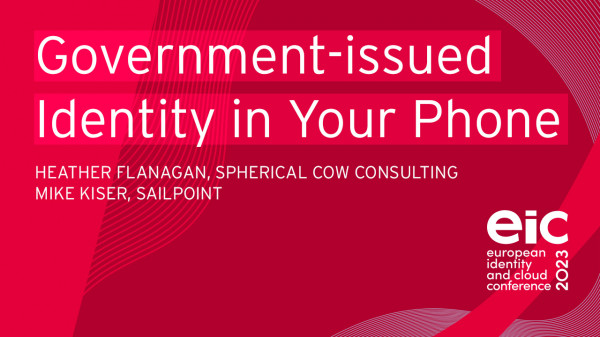
This decade may well be labeled “the decade of the digital credential.” From COVID passports to mobile driver’s licenses, digitized credentials transforming to “born digital” credentials, and governments and large tech companies developing their own wallets, personal information has never been easier to share with the wave of a device. The convenience is amazing, and the privacy implications are terrifying.
Even scoping the issue down to government-issued credentials or credentials directly derived from government data, there are a variety of requirements feeding into this growing ecosystem:
In this session, Heather Flanagan and Mike Kiser will discuss the outcomes of the recently released white paper on government-issued credentials and the privacy landscape (publication date expected in April 2023). The issues at hand are not solely about policy, nor are they only about technology. It is about closing the policy and protocol gaps that exist between today’s disparate solutions and services and providing a vision of a privacy-preserving, globally viable privacy landscape.
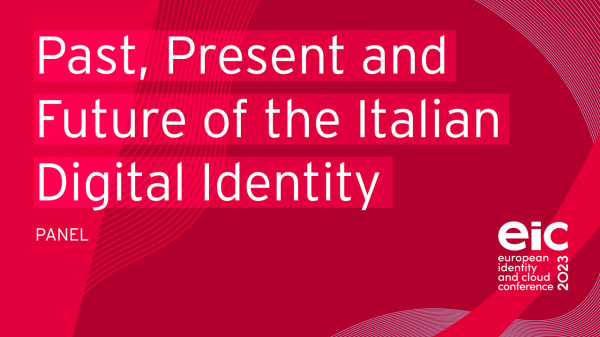
Italy has two National Digital Identity schemes, namely: SPID and CieID (leveraging the national ID card). Both of them are based on SAML2 and are on their way to supporting OpenID Connect. The reasons for this decision are numerous, and they are primarily related to OpenID Connect Core features such as flexibility, ease of implementation, better support for mobile applications, and widespread adoption, particularly in the private sector. To manage this transition, we considered several documents by the OAuth working group describing security best Current Practices and the OpenID Foundation specifying a profile for iGov and a framework for federation. In particular, the latter defines a hierarchical federation model with high security, interoperability, scalability, and transparency based on dynamic delegation mechanisms; Italy is an enthusiastic early adopter.
In this talk, we introduce the Italian OpenID Connect profile based on the iGov and federation profiles and explain the main security measures that we considered within our design from the aforementioned standards and available best current practices. We also discuss how the Italian OpenID Connect profile contributes to the iGov and OpenID Connect Federation documents. We conclude the presentation with a brief discussion of eIDAS 2.0 and some of the ongoing preliminary works in the context of the Italian digital identity ecosystem to move toward an SSI-based solution using the Italian OpenID Connect profile as a starting point.
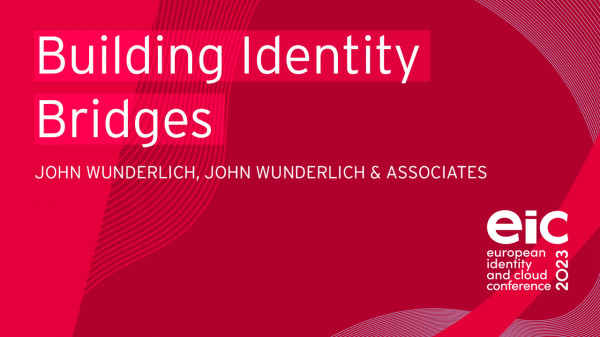
This presentation will bring together and report on experiences in developing identity and privacy standards that are technically feasible but that also address the lived experience of people trying to negotiate a complicated digital identity space.
This will include an update on the Kantara Initiative Privacy Enhancing Mobile Credentials Work Group, as well as identity consideration in some recent virtual care and electronic health records standards. This will consider the impact of self-sovereign identity on the possibilities for reclaiming individual autonomy.
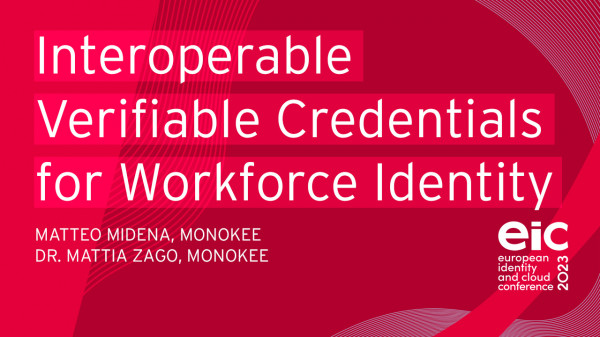
The past few years have seen a startling increase in decentralized technologies for Digital Identities. So far, much of their adoption has been limited to academic or proof-of-concept integrations (barring some shining examples) rather than consolidated production-ready use cases.
Generally, there isn't an enforced link between real-world and digital identities, and rightfully so. Still, enterprises' policies and regulations mandate companies to ensure restricted access to reserved data and undeniable attribution, which collides with general anonymity and distributed principles. Albeit SSI technologies aim at filling this gap with trusted-yet-privacy-preserving solutions, companies still need to consolidate digital identities and collapse them into a well-defined entity. We will talk about a hybrid approach to classic IAM for workforce management including W3C native credential integration with solidified and well-established SSO federations. In other words, delegate to the end users the choice of which identity technology to use as long as they can provide a trust chain that the companies can verify.
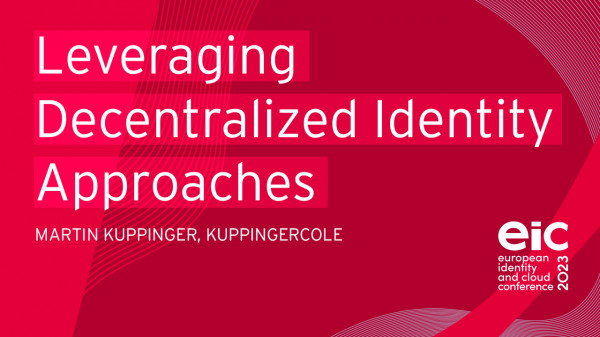
In this session, Martin Kuppinger, Principal Analyst at KuppingerCole Analysts look at the potential of utilizing DID approaches within the enterprise. This session will look at the business benefits, the steps involved, important considerations, challenges, pitfalls, and recommendations for implementing decentralized identity. Martin will explain the potential and look at how this will impact existing technologies such as IGA, PAM, and Access Management, and how this relates to other trends such as WfA, BYOD, Policy-based Access, and more. He also will outline where interoperability and standards must further evolve to enable organizations in re-inventing their IAM, without ripping everything apart. He will discuss the steps involved, important considerations, challenges, pitfalls, and recommendations for implementing decentralized identity in the enterprise.
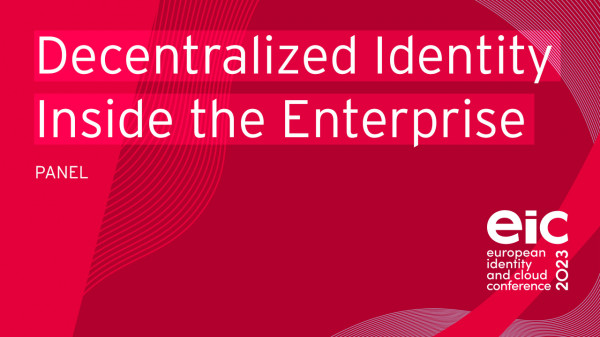
Decentralized Identity is about to change the way we do IAM in enterprises. It is not just about the C-identities (consumers, customers, citizens). This raises two questions: What do to differently in IAM, to leverage the potential of decentralized identities? And what not to do anymore, because it is becoming legacy? IAM, without any doubt, will change fundamentally. But is it about rip-and-replace of IAM and in particular IGA, or about complementing it? In this panel, we dive into this decentralized lake of innovation, new standards, products, vendors and start-ups in order to find out how to benefit from DIDs in the enterprise.
Are there interoperability models and how could a longer-term migration scenario look like? What about Identity Workflow Orchestration? Join this great panel session to discuss the way forward for workforce identity.
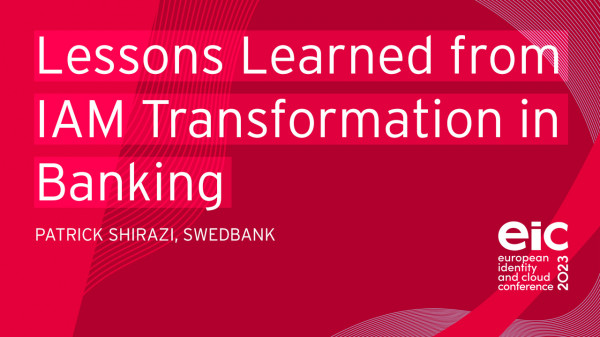
Legacy IAM cannot be just "improved". It needs a "Transformation". But how an IAM transformation could be successful in the financial sector, especially banking? In this presentation I would like to share the top lessons learned from such a transformation.
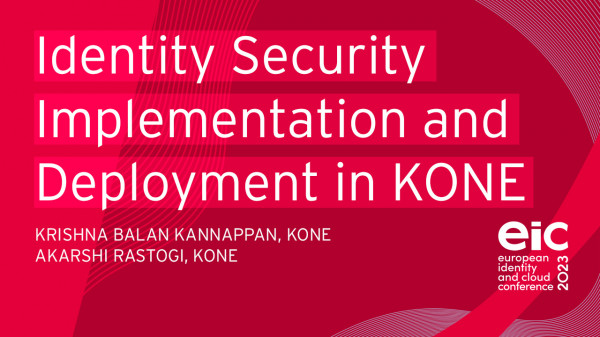
In this talk, Krishna Balan Kannappan will describe Kone´s path to a holistic and integrated Identity Security infrastructure.
Privilege Access Management:
DevSecops model is used for Development, automated deployments, Security Scans and automated Testing.
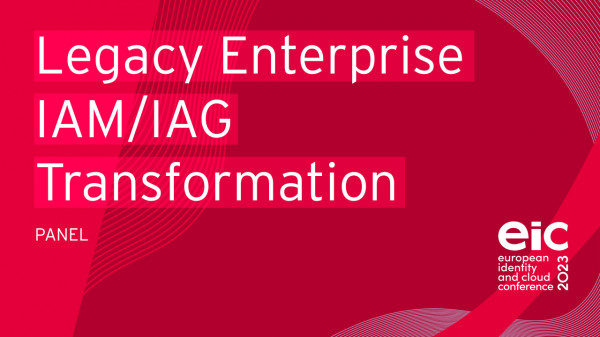
Enterprise IDM/IAG and gardening do have much in common. Usually, if the general architecture and setup of the garden is done and completed, only minor changes and adjustments will be done over the years. But still: The yard will look different after a few years, not only because the trees and plants have grown, but also because of replacements, adjustments and optimizations over the years.
Sometimes, calling a bulldozer for a more complete ‚redesign‘ and restart from scratch is considered, but still limited by the boundaries of the property (and the budget of the landlord).
Whether you plan to bulldoze your legacy IAM/IAG Program, or replace a few elements just as you would replace plants, trees and flowers because of their age or cost: In this panel we will discuss the options, do‘s and dont‘s, stories from failed ‚gardening projects‘ and many more related to modernizing your legacy IDM/IAG set of tools.
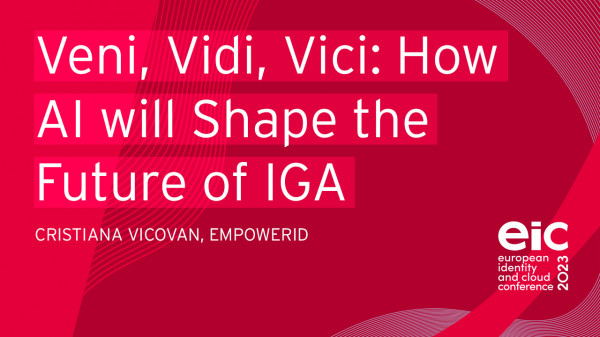
Imagine a world where security risks are identified and mitigated before they even happen. Imagine if access and auditing recommendations were made with the precision of a computer algorithm. Imagine the power of artificial intelligence to revolutionize your organization's identity governance and administration practices. We have reached an inflection point in the world of AI. The release of technologies like ChatGPT is as monumental as the development of the internet or Google as a search engine. AI is going to change the way we think about IGA. With the capabilities of AI, IGA solutions can provide a higher level of granularity, faster data processing, and more complex analysis to better identify and mitigate risks in real-time. This will lead to more effective risk management, smarter access and auditing recommendations, and increased automation of processes and operations. But this is just the beginning. As this technology continues to evolve, we can expect to see even greater benefits from AI-enabled IGA solutions in the future. Imagine a future where your organization's security is not just protected but anticipates and proactively prevents threats before they happen. So I ask you, are you ready to join us in shaping the future of IGA? Are you ready to harness the power of AI to revolutionize your organization's identity governance and administration practices? The future is here, and it's time to embrace it.
In this talk, attendees will learn about the potential for AI to revolutionize Identity Governance and Administration (IGA) practices.
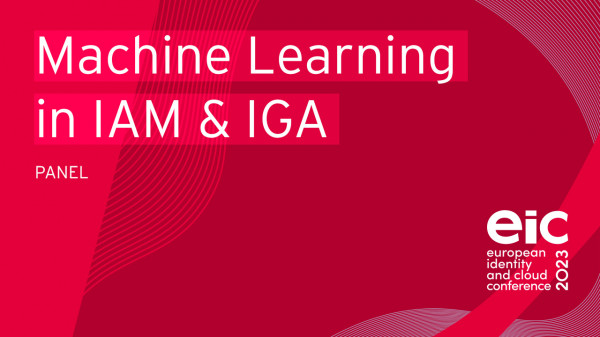
This presentation will provide an overview of the terminology and basics of AI and ML in the context of Identity and Access Management (IAM) and Identity Governance and Administration (IGA). It will explore a number of current use cases for leveraging ML in IAM, demonstrating the benefits of automation and enhanced security that ML can bring to identity management. The presentation will conclude with strategic considerations for using ML in IAM, highlighting the importance of considering business value, available data, and existing technologies when implementing ML-based solutions for identity management.
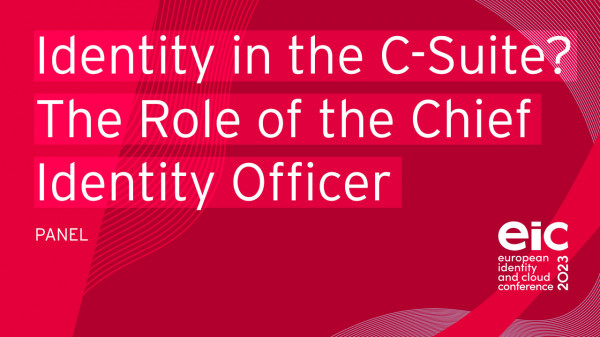
Whereas our Privacy and Security peers have top executive-level access and presence as well as often Board-level access, Identity typically does not.
Should that continue to be the case? Are the conditions right for the establishment of a Chief Identity Office… and is that even a good idea?
In this panel, Drs. Jacoba Sieders, Denny Prvu, and Ian Glazer will debate the pros and cons of the notion of a Chief Identity Officer role. Topics will include:
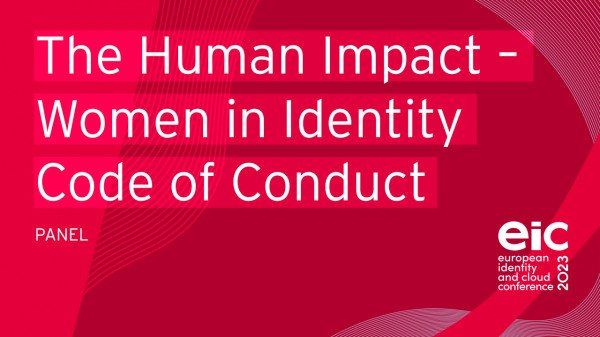
Women in Identity strongly believes there is a need for a global Identity Code of Conduct to address identity exclusion—being excluded from access to identification credentials — that subsequently leads to exclusion from financial services and products.
The Women in Identity team are half way through their research project with the current phase focused on the development of the code of conduct.
This panel will share early look at the guiding principles that will ensure all users of digital identity systems have a consistent and high-quality user experience.
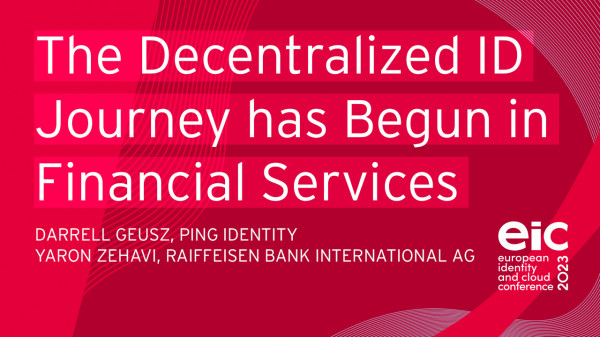
Learn how Raiffeisen Bank International heads toward decentralized identity to empower their customers across Europe and set the gold standard for privacy protection.
The increased mobility of users and their demand for personalized, unified omnichannel access experiences has stretched federated IAM beyond its limits. Meanwhile, the need for organizations to collaborate more to compete, and build communities of trust and value for those same users affordably and securely, cannot be met by existing federated IAM solutions. Learn how Raiffeisen Bank International (RBI) will embrace the new paradigm of decentralized identity to improve existing experiences and create the opportunity for new, valuable user experiences and increased levels of engagement and collaboration withbusiness partners across multiple jurisdictions, without the need to replace their infrastructure. Simultaneously, understand why starting their journey now, enables RBI to future-proof their ecosystem to rapidly support the EU Digital Wallet and official digital credentials that will become available. Get a glimpse into the solution architecture being deployed at RBI and an understanding of the benefits and how they can be communicated to executive leadership and business partners. Yes, decentralized identity may be great for web3 someday; however, learn from RBI how it can also solve today’sproblems in a practical way and work in harmony with existing IAM systems enhancing existing federationplatforms.
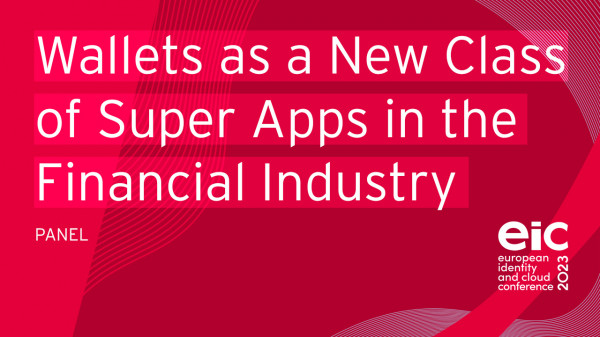
Open banking has changed our world, enabling citizens and businesses to create a holistic view of our financial lives. “Superapps” will combine our digital identities with other domains.
Imagine a future where we can view, add, update, or remove our digital identity attributes as easily as we can manage these credentials in our physical wallets today. Further imagine that through the same lens, we can view and control which people and businesses have access to what identity data, for how long and for what purpose and attend to our financial business. “Superapps” will enable us to do exactly that as well as enable us to minimize attributes shared to suit the situational needs.
Beyond the self-evident value to us in terms of ease of use and control, imagine the efficacy that this approach will have on culling fraud when there is no need to expose all of our details with every interaction in the digital universe. Join the conversation to understand what public, private, and standards initiatives are available today and how these need to expand in support of “Superapps”.
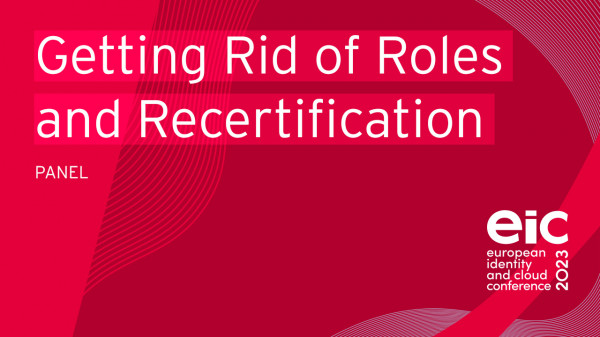
Access control is a key part of cyber security, however traditional approaches do not work well for modern business IT environments that nowadays typically include a mix of applications on-prem and across multiple cloud environments.
Most modern companies tend to struggle with access management for a variety of reasons. These include the fact that it is difficult to make the necessary connections to the many disparate IT systems for which they need to provision access, role-based access management is challenging, static role-based entitlements are difficult to manage and typically require regular recertification processes, and traditional approaches are focused on granting access to resources required by an individual to perform their job function, but do not cover how those rights are actually used to stop any abuse of entitlements.
In addition, course-grained authorization is no longer sufficient because modern applications and sensitive data assets in cloud-native, containerized and DevOps environments require fine grained authorization capabilities that can also supply identity attributes and context variables.
A policy-based approach can address many of the pain points experienced by organizations today by enabling a centralized, consistent, dynamic, on-demand (just-in-time) way of managing access to IT resources. In this panel session we will discuss nothing less than the future of Access Management.
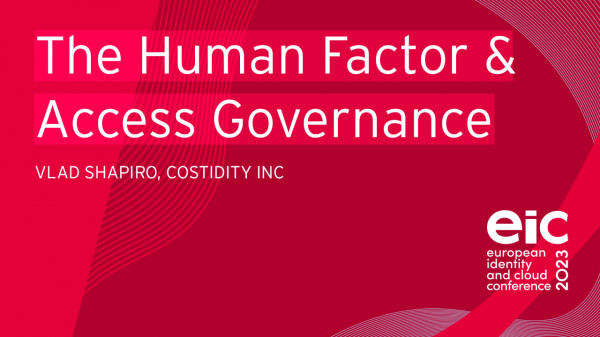
One of the fundamental problems of identity and access governance lies in very unclear relationships between real business needs, access policies and decision making about allowing certain action on the assets. For years we are trying to develop access policies which at the same time corresponds to business expectations, digital security rules and regulations, and people-centric to minimize deviations.
In this session, we will discuss human factor in IGA program and how to provide human factor analytics in access governance using new three-dimensional model called NPR (need, policy and resolution). We will show how NPR reports will help the organization to determine necessary adjustments of the policies and their implementation in Identity Governance workflows and processes to improve maturity, decrease risk of breaches, policy deviations by users and cost of managing and enforcing policies also known as Costidity. We will also show the sample reports based on data from higher education customer.
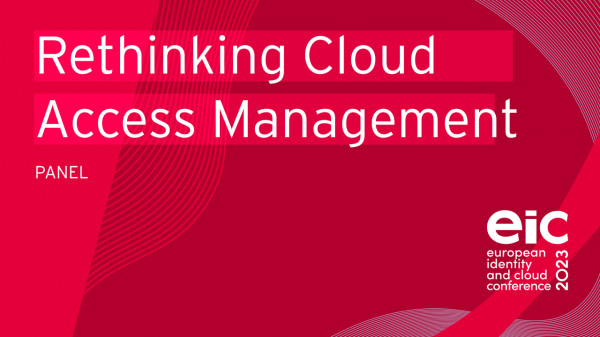
We must secure our organization’s processes regardless of what tech they run on. Originally, security leaders had leverage. We controlled the horizontal. We controlled the vertical. And if people wanted to work, they needed to follow our rules to access corporate apps and services. But then came Cloud apps, and BYOD, and consumerization, pushing security beyond our outer limits. Security happens where psychology and technology intersect. The everyday decisions of employees increase or decrease an organization’s risk.
Employees don’t need us. And by employee, I mean more than end-users. This is a broader conversation; including software developers, IT engineers, DevOps practitioners, and more. To get people to opt in and follow secure practices, we turn to behavior science. IT security leaders must offer them a compelling experience. In this panel we will discuss how to carefully balance the need for security, compliance, and efficient resource management to ensure that your cloud environment is both secure and effective.
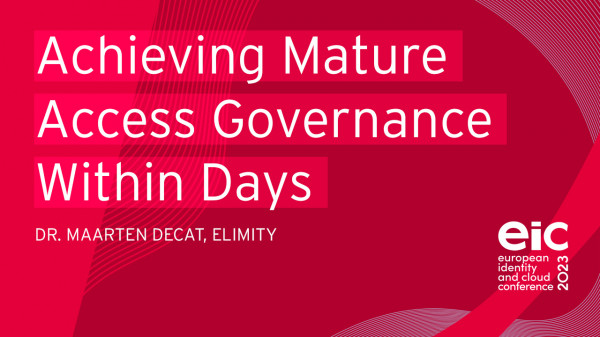
Securing access to data and applications has become a cornerstone of any modern cybersecurity strategy.
User access governance projects however have a history of incurring multi-year roll-outs and requiring specialized personnel, making many companies shy away and bear excessive cyber risk.
For those companies, approaching user access governance as a data problem can provide the answer. This approach effectively trims down user access governance to its essentials: low-effort data collection, user-friendly risk analytics, access reviews and plugging into the existing ITSM processes. This data-driven approach has the potential to let companies achieve mature access governance in a matter of days, not months.
In this session, Elimity CEO Maarten will give an overview of the essentials of user access governance and will showcase how this approach is successfully applied in practice by industry leaders such as Securitas, the Belgian Railroads and Federale Assurances.
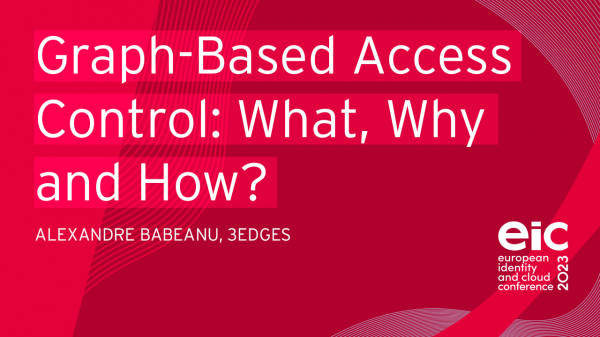
“Graph-Based Access Control'' (GBAC) is a generic term that refers to the use of graphs and networked data to solve Identity and Access Control problems. You may have seen this before through the disguise of acronyms such as ReBAC (relationship-based), KBAC (knowledge-based), PBAC (policy-based), NGAC (Next-Generation), FGA (fine-grained), and even some implementations of ABAC (attribute-based). All of these terms refer to techniques that use graphs to enforce access-control for any level of coarseness.
In this session you will learn why all the latest Dynamic Authorization offerings on the market use GBAC in a way or another, and how you can successfully adopt the technique yourself. Graphs are becoming ubiquitous - one can just look at the rise of the GraphQL API model to witness their popularity first-hand. Through concrete, real-life examples we will showcase the use of graphs to solve common access problems using the same modern and future-proof techniques that you see in the current authorization market.
As a result, storing all identity data in graphs truly unlocks its full potential. Graphs are data-science and analytics enablers, and have the potential to transform the IAM practice from a cost centre to a true revenue generator. We’ll explore how this can happen for you too…
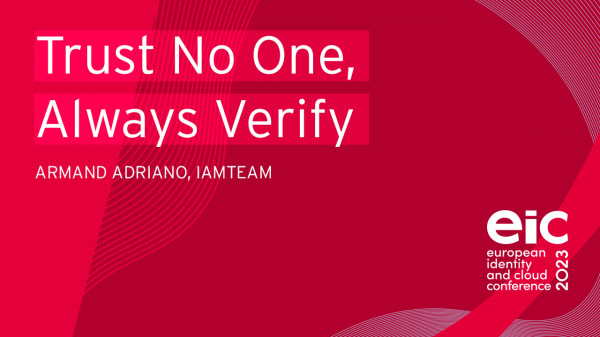
Cybercriminals no longer “hack” in – they simply log in. Once inside, they hunt for privileged accounts. A vast majority of breaches today are due to the abuse of stolen privileged accounts. Privileged accounts are very powerful but at times, anonymous and shared. Learn how to take control of Privileged Access to ensure that your most valuable asset - your data - is protected.
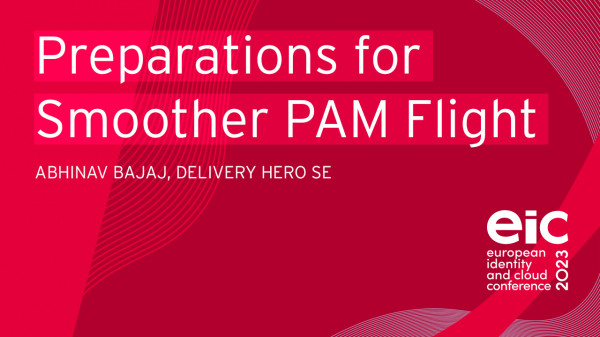
The short abstract of this topic would be "How we can make a proper business case and ROI(Return on Investment) for PAM". Below are some of the preparations we need for a smoother PAM flight:
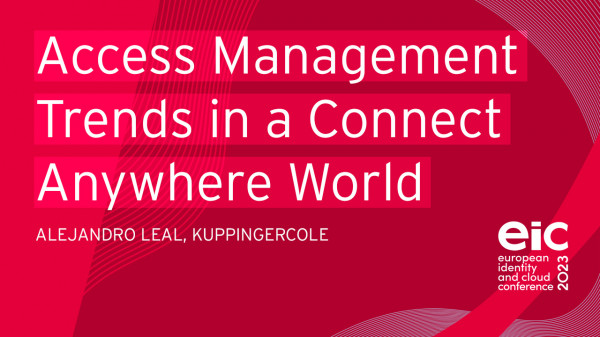
The combined impact of the pandemic driven shift to remote work with a connect-anywhere paradigm and the ongoing digital business transformation has inspired a higher awareness of cybersecurity concerns, requiring a profound change in the way we define Access Management.
New contact-free onboarding experiences from the workforce to the customers; the need for managing human-to-device relationships; passwordless authentication as the new normal; decentralized identities as a new way for dealing with identities; the impact of policy based access; the convergence of IGA and Access Management: All these are just some of the trends we observe. In this session, we will talk about the Access Management trends and provide guidance on how to leverage and extend your existing Access Management towards a future-proof Access Management.
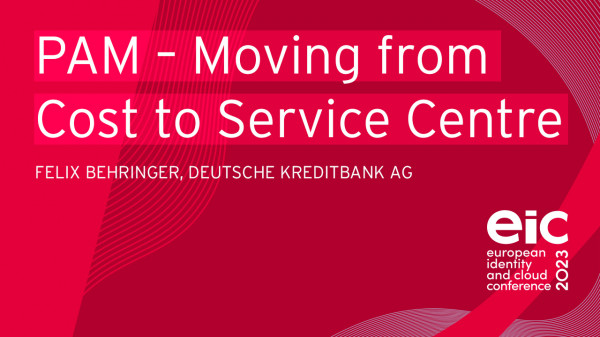
A standardized approach to control privileged accounts can be valued as a profitable internal service.
While implementing Privileged Access Management (PAM) DKB concentrates on what kind of service delivery a PAM implementation can provide to its customers (our employees) to connect benefits for end-users and address identity security at the same time.
We call that Privileged Access Security Service.
From a technical and IAM point of view identity security can only be achieved by securing the respective digital identities and the assigned user accounts in the corresponding target systems.
In the area of IAM/PAM a comprehensive compliance level automatically results in a higher maturity of our information security management. Therefore, we reduce the non-financial risks not only by complying with regulatory requirements but also by adding effective security concepts – such as zero trust or least privilege – to our IAM/PAM ecosystem.
In this session the DKB approach to handle identities and accounts in the context of a Privileged Access Security Service will be presented.
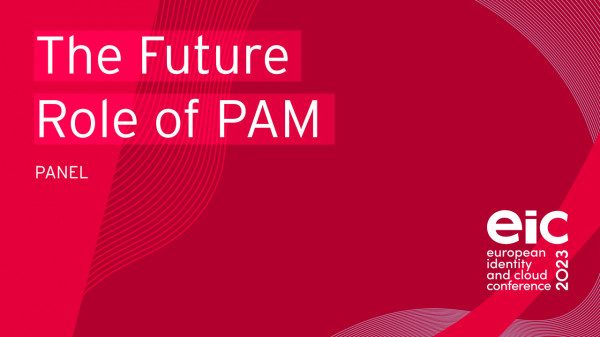
PAM (Privileged Access Management) is one of the established core disciplines within IAM. PAM also is the IAM discipline that is changing most from what it has been in the past.
On one hand, there is the impact of CIEM & DREAM, Cloud Infrastructure Entitlement Management or Dynamic Resource Entitlement & Access Management. This is about the expansion of PAM beyond humans accessing servers and selected applications towards any type of human and non-human (silicon) identity accessing any type of workload, from servers to dynamic cloud resources. This also implies an expansion from serving static data center infrastructures to dynamic workloads in today’s agile IT. PAM is changing, with more parties involved – a “PAMocracy”, as KuppingerCole Analyst Paul Fisher recently named it.
These changes also require expansions in integration to other IT services. There needs to be a dynamic governance approach, where IGA comes into play. It requires rethinking whether PAM tools really should care for authentication. There is no need for authentication point solutions in an age where most organizations have a strong Access Management solution with MFA, passwordless authentication and adaptive, risk- and context-based access in place. Finally, this new PAM must integrate with the DevOps tools chain for permanent updates about new code and the resources used as well as with IT Asset Management for an always up-to-date insight into the ever-changing, dynamic IT landscape that needs to be protected.
Also worth to think about is integration with further security solutions, beyond the standard SIEM/SOAR integration. AI-powered security solutions are one aspect. Integration to Cloud Security Posture Management is another example.
In this panel, the state and requirements on the future PAM will be discussed.
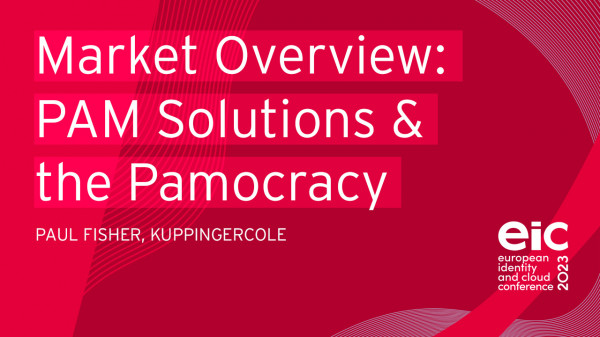
In this session, KuppingerCole´s Paul Fisher will give an overview of the market for Privilege Access Management (PAM) platforms and provide a compass to help buyers find the product that best meets their needs. KuppingerCole examines the market segment, vendor capabilities, relative market share, and innovative approaches to providing PAM solutions. He will also explain how the new Pamocracy is affecting the market.
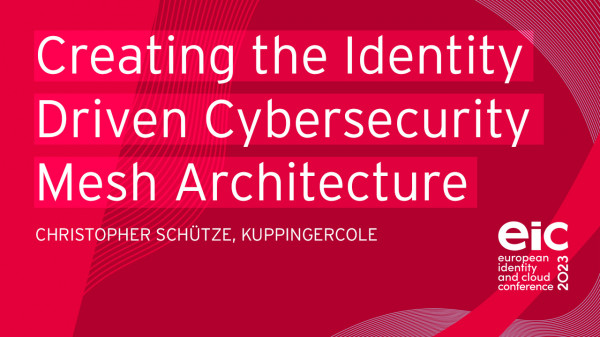
In overcoming the ancient concept of firewalled enterprise perimeters, securing identities has become the core element of a future driven Cybersecurity Mesh Architecture, with a composable approach of interconnected security controls – the Cybersecurity Fabric.
These Cybersecurity Meshes or Fabrics factually are nothing else than the concrete architecture and implementation of the Zero Trust paradigm, making this work in practice. In this session, we will start with a quick overview of these paradigms and their constituents, before showing how to adapt this to your current state of cybersecurity and your concrete cybersecurity requirements. Based on that, we will look at examples of such concrete architectures, the maturity levels, and on how to build your own roadmap towards the cybersecurity mesh/fabric that makes Zero Trust a reality.
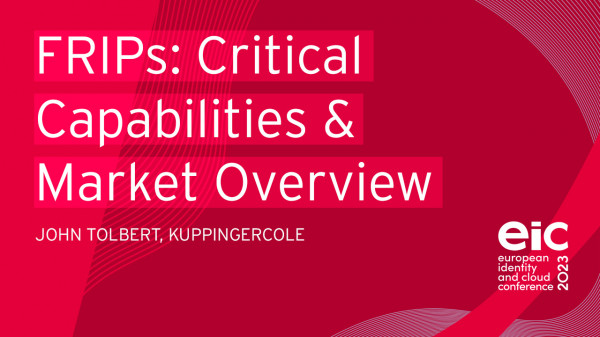
Fraud is a major cost to businesses worldwide. Cybersecurity Ventures estimates that cybercrime costs will reach $10.5 trillion by 2025. Banking, finance, payment services, and retail are some of the most frequent objectives of fraudsters, as expected. However, insurance, gaming, telecommunications, health care, cryptocurrency exchanges, government assistance agencies, travel and hospitality, and real estate are increasingly targeted as cybercriminals have realized that most online services trade in monetary equivalents. In this session we will look at critical capabilities for FRIPs and provide an overview on the solution market.
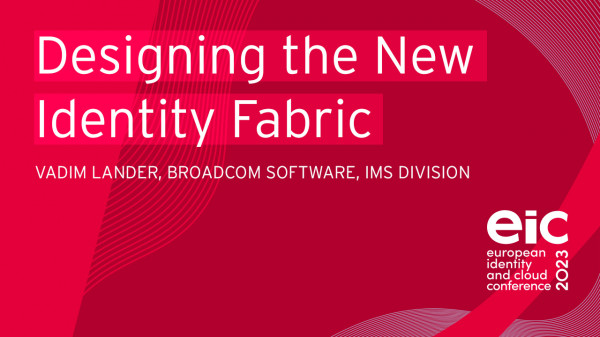
Modern applications and environments are driving a new Identity Fabric. Are you ready to build yours? Join Vadim Lander, Chief Technology Office and Distinguished Engineer at Broadcom Software, as he discusses the design considerations to evolving your Identity and Access Management solution to build a Zero Trust foundation and bridge the identity gap across your hybrid environment.
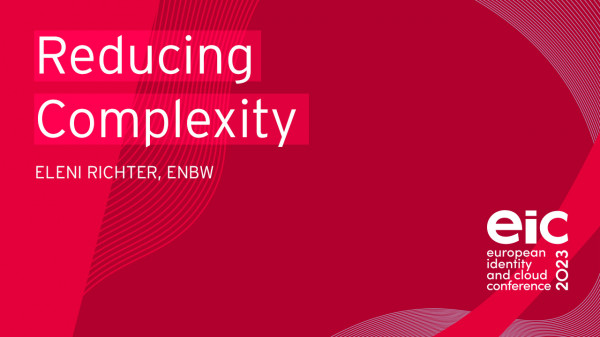
Practical Cyber Security Architecture: Reducing complexity – Introducing a practical model for security classifications. Building and running cyber security in both worlds modern cloud security in combination with legacy on premises introduces extra complexity. Some of the well-known security patterns and models are not applicable in cloud systems while the modern security models like zero trust barely fit in legacy systems. Based on a model for security classification we will explore some practical methods for reducing complexity in modern cyber security.
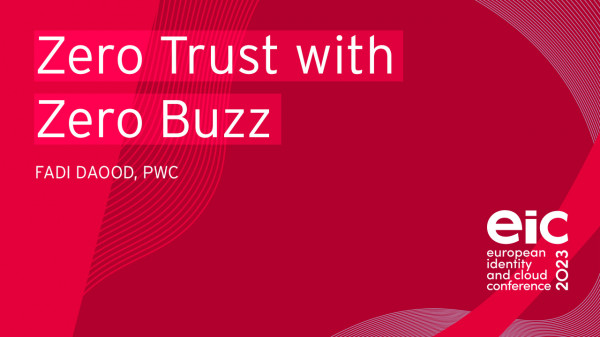
The objective of the talk is to:
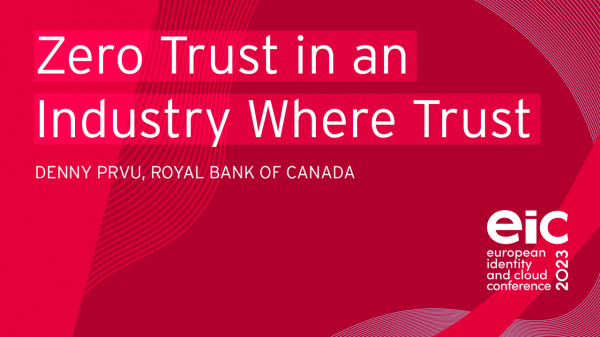
How does a Financial Institution deploy a Zero Trust Model where employees and consumers need access to so much vital data in near real time.
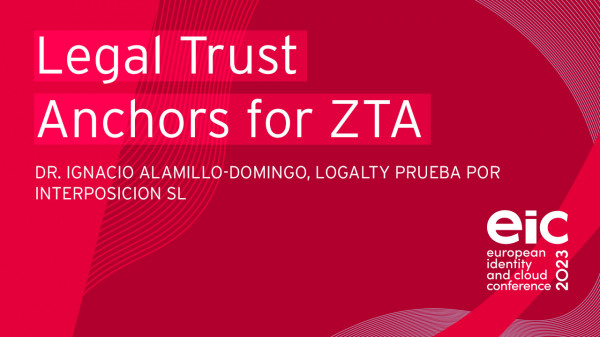
Credential-based ZTA are a promising new approach for strengthening authentication policies, which is specially suitable for a transformed ecosystem where perimeters and boundaries have already vanished, in favour of ubiquitous access to both cloud and edge computing models. The new eIDAS 2 regulation proposal, properly implemented, will provide a legal trust anchor for these new approach, bringing legal certainty and fostering adoption. The roles of distributed ledgers as EBSI will be explored as well.
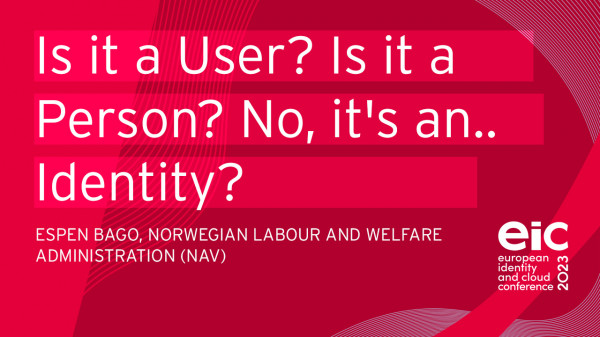
None of us in this industry work with bricks and mortar or other tangible, real objects. Everything we do (in IT, not just Identity and Access) is instead a digital representation, an abstraction, of something that might exist in the real world.
Identity and Access is the glue for many of those digital representations, and this concept of representation may be the most important thing to understand when considering the different possible meanings of words.
People new to Identity and Access quickly find that many of the words they encounter have different meanings than they first thought. Most frequently encountered are probably “user” and “identity” - do they represent the same type of entity or is a difference intended? Do they refer to the physical, real life person or do they refer to a virtual, digital object somewhere within the IT systems? Or both at the same time? And since people are often reluctant to show weakness in front of perceived experts, questions are too often not being asked when unsure.
In any industry, a typical consequence of miscommunication is that the end product or project will have lower quality or take longer to get delivered. This presentation highlight how this problem of misunderstanding may be larger in our industry of Identity and Access than in others, discuss why that is, and what might be done to counter it.
The presentation offers examples of where terms are ambiguous (where definitions seem to vary across the industry) and it discusses ways to perhaps improve the situation.
The presentation is based on a corresponding article in the IDPro Body of Knowledge.
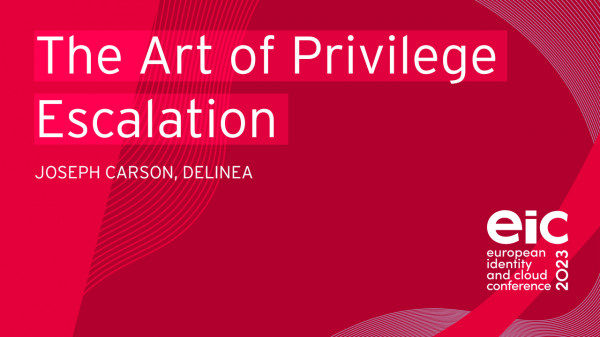
Regulatory bodies, government agencies, and CIOs are mandating Zero Trust as a cyber security framework. What does Zero Trust mean for your security strategy? With a Zero Trust security model, nobody is trusted automatically, even when they’ve cleared the perimeter. Instead, all identities are verified, minimum access is granted based on context, and activities are monitored to make sure controls are working as expected. The Zero Trust model requires multiple security controls throughout an IT environment to protect and manage identities, devices, networks, applications, and data. This session will take you through the reality check of where Zero Trust started, how it has evolved over the years and what does it really mean for your organization today.
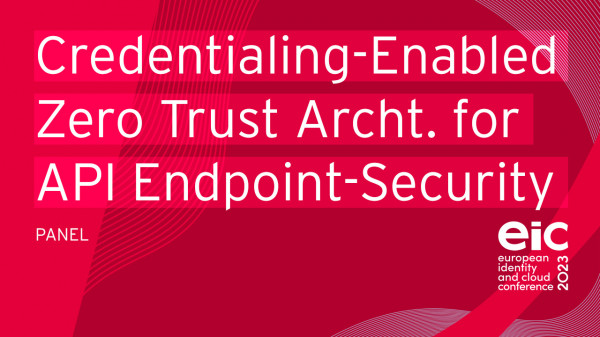
Traditional network security focuses on perimeter defenses, but many organisations, systems and processes no longer have a clearly defined network perimeter.
To protect a modern digital enterprise, companies need a comprehensive strategy for securely accessing their IT resources (e.g. applications, physical access control systems, portals, data resources, and devices) wherever they are located.
APIs in supply chains and cyber-physical systems (CPS) are proliferating exponentially across the technology landscape, creating a huge attack surface that security teams struggle to understand and defend.
Zero Trust Architecture (ZTA) refers to security concepts and threat models that no longer assume that actors, systems or services operating within the security perimeter are automatically trusted, but instead must verify everything and everyone who attempts to connect via an API to their systems resources before granting access.
Hence, ZTA is an important design philosophy to establish security mechanisms at the API layer of each individual IT resource for increasing API Endpoint Security in both, corporate infrastructures and open systems. Identity and authorization credentials as well as policies are a key enabler of securing the API endpoints.
These different ZTA approaches include:
1) ZTA Using Enhanced Identity Governance,
2) ZTA Using Micro-Segmentation, and
3) ZTA Using Network Infrastructure and Software Defined Perimeters.
Our presentation will demonstrate how Trust Frameworks and Identity Governance (1) are the foundational layer for a credentialing infrastructure. With this layer in place credentials can be used enable SW-defined perimeters (3).
We will provide in-depth insides how ecosystems solutions such as the Open Credentialing Initiative and Gaia-X are applying design patters using decentralized identity and verifiable credentials for (3).
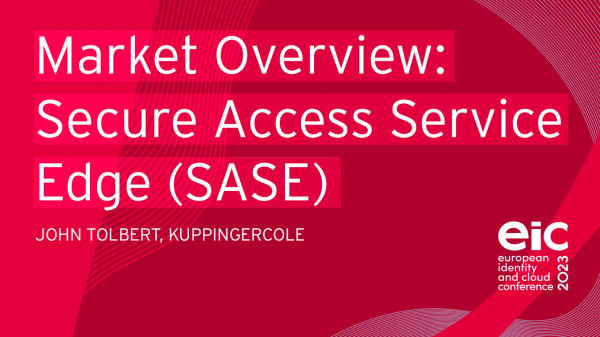
The term secure access service edge (SASE) has become popular in recent months and has been adopted by numerous vendors. SASE stands for a concept that integrates a range of cloud-native security services including cloud access security brokers (CASB), firewall as a service (FWaaS), secure web gateways (SWG), and zero-trust network access (ZTNA), with wide-area network (WAN) capabilities for delivering both directly to any edge computing location. In this session, KuppingerCole´s John Tolbert will give an overview of the market for SASE solutions and provide a compass to help buyers find the product that best meets their needs. KuppingerCole examines the market segment, vendor capabilities, relative market share, and innovative approaches to providing SASE solutions.
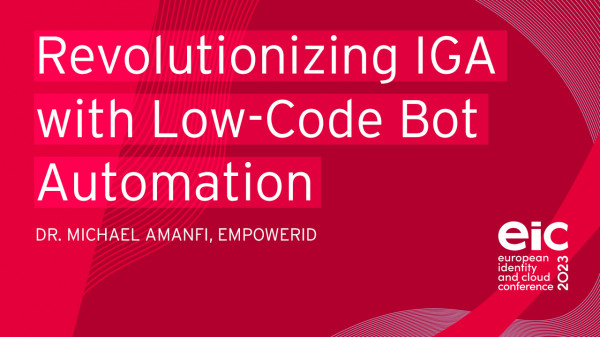
Identity Governance and Administration (IGA) is critical for ensuring the security of an organization, but it can also be a complex and time-consuming process. Join us for an engaging conversation on how Identity Governance and Administration Bot Flow (IGABotFlow) is revolutionizing the IGA field. This new approach combines the power of low-code orchestration, bot technologies, and a visual interface to simplify the management of access to sensitive information and resources while improving security.
"Citizen developers" will learn how to use IGABotFlow to automate complex business processes, including identity-related tasks, with low code visual tools. Additionally, attendees will discover how bots can proactively monitor and respond to events and changes in data, performing tasks and interacting with users without explicit requests. IGABotFlow is a game-changer in the field of identity governance and access management. Attendees will learn about the use cases where this technology could make a difference in their organization.
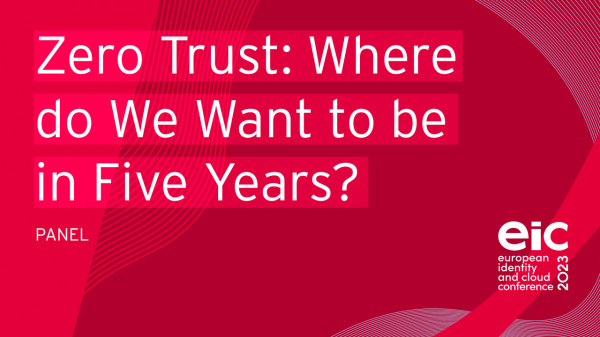
The digital-first customer experience and remote-first workforce pushed zero trust from buzzword to reality. And yet, much of the conversation is still heavy on theory and light on practice. Cyentia completed a global study of high-level practices which measurably contribute to a more successful cybersecurity program based on a rigorous survey of nearly 5,000 practitioners. Within that study, we analyzed commonalities of organizations implementing and operating Zero Trust. Let's look closely at where we are today.
Now imagine it is 2028. You’re five years into your Zero Trust transformation. People like it and usability has improved. Defensibility is better, too, with a number of attacks having been stopped over the past couple years. But then, in 2028, you get the call. There’s been a security breach. What happened!? This session will explore the future with a pre-mortem on how breaches will look under a Zero Trust architecture.
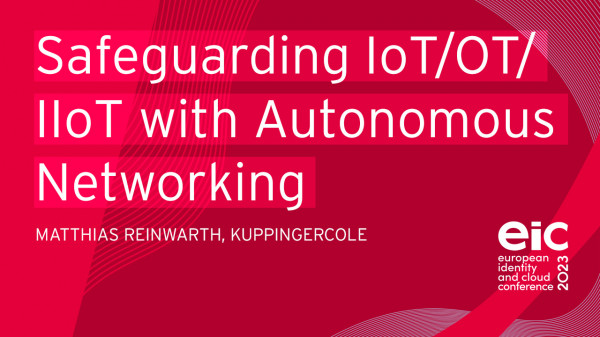
Autonomous networking aims at the appropriate handling of the growing number of devices, machine, sensors and components for which authentication and authorization must be ensured, i.e., identities must exist. The initial provision of such identities, but also the handover and onboarding into the respective operational environment (WiFi, smart home, factory floor) require scalable, automated, end-to-end secured procedures and concepts to facilitate trusted communication, but also e.g., the provision of made-to-measure updates.
Making IoT/OT/IIoT identities and networks secure by design is essential. ACP (Autonomic Control Planes) and BRSKI (Bootstrapping Remote Secure Key Infrastructure) lay one foundation for achieving this.

Let’s do things differently. To start with, let us view logs and traces as no different from any other data. The data an application indirectly generates when in use (the logs and traces) is no different from the data an application directly works with (input and output). So let’s keep them all together in a scalable cloud storage repository. Once it is there, it is just like any other big data. We need to analyze and apply intelligent monitoring to detect situations of interest. So we need to apply trained ML models to a stream of such data for immediate alerting when the traces indicate an unwanted behavior occurring or brewing. This talk will show how to harness existing technologies to do just that.
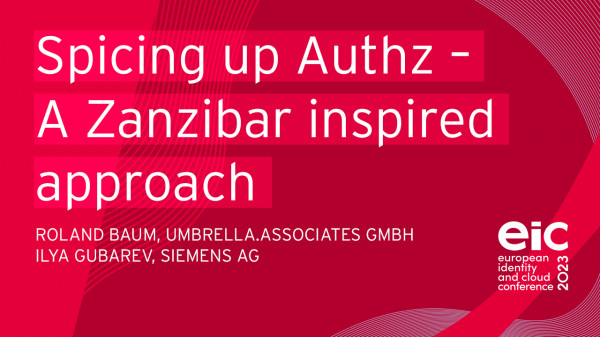
As a global OEM of highly critical and complex industrial devices, managing access to hundreds of millions of IIoT device resources spread across customer sites all around the globe is already a challenging task.
Use cases for providing a digital service platform need to address end customers accessing devices owned by themselves as well as priviledged access for in house and third party analytics applications and serice personnel. A combination of requirements for excelent user experience, authorization management and high performance for cross-tenant queries for endless scenarios can become a nightmare.
The task was to analyze the access requirements, abstract them and then deploy a “Zanzibar” inspired approach to manage access authorizations with a swift and reliable backend architecture, able to handle millions of information assets to be protected against unauthorized access.
Creating a mere access model does not do the full trick - it has to be cleverly designed into data storage structures and queries to achive the required performance goals!
The talk quickly introduces the problem set and then dives deeper into how to implement data storage optimization magic to get quick response times and swift adjustments of authorizations.
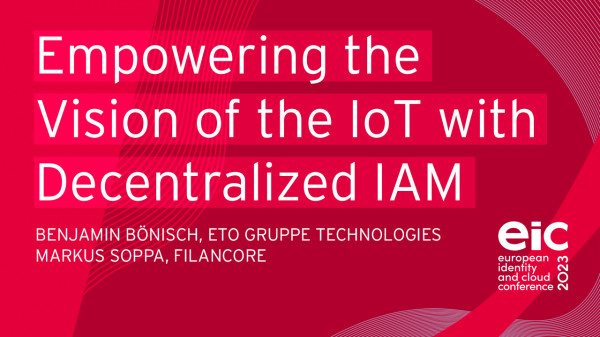
How Self-Sovereign Identity (SSI) enables decentralized Identity and Access management for Things
From SSI zero to hero – ETO`s digital & IoT transformation in practice
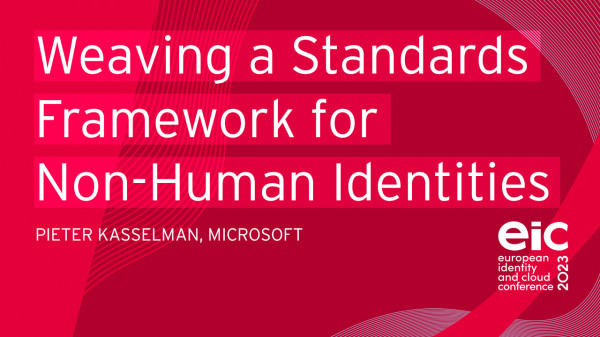
|
We entrust workloads and devices with our most sensitive data, giving them access to far more information than the human on whose behalf it operates, if it is even operating on behalf of a human. Yet, managing these non-human identities and applying Zero Trust Policies to them is a Herculean task complicated by a heterogenous technology landscape, amplified by multi-cloud/multi-hybrid environments, exacerbated by critical skills shortages and magnified by exponential growth in workload and device identities. |
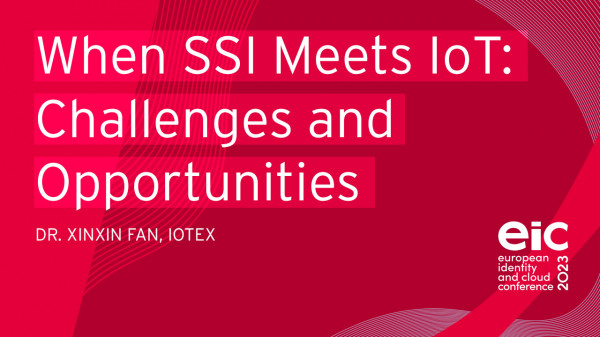
In this session, I will first talk about the design considerations and challenges when applying SSI to IoT, followed by the description of an initiative for creating an embedded SDK for SSI. Finally, I will discuss new opportunities for building decentralized identity and access management solutions for IoT.
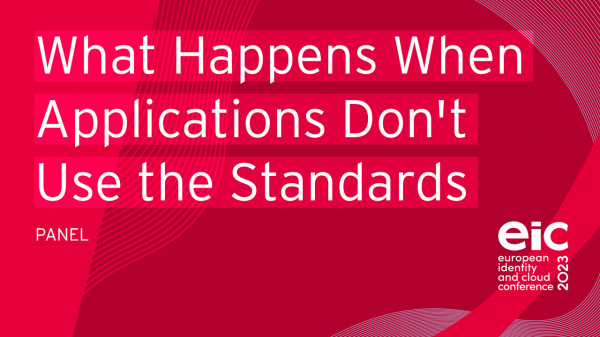
|
OAuth 2.0 is a widely adopted standard for authorization, but it can be complex to implement correctly. It's not uncommon for developers to have difficulty understanding the nuances of the OAuth 2.0 flow and instead rely on simpler approaches such as using API keys in "god mode." |
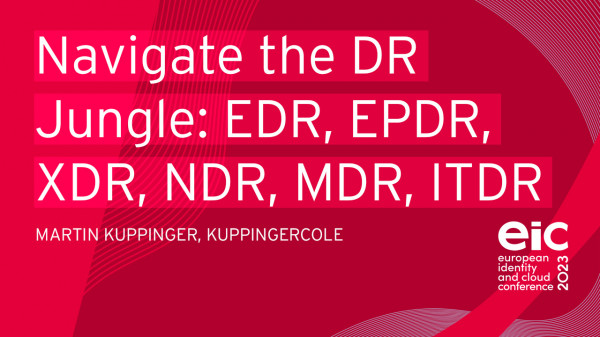
ITDR: Is this really something new, given that around 80% of the cyberattacks are identity-related, from password phishing to bypassing MFA? Is it a separate discipline or just a part of XDR (Extended Detection and Response)? Or a new name for what Access Management and FRIP already do?
As always, there is something new and relevant in this. The fundamental question for many organizations will be on how to address the identity threat challenge best. Does it require new or different tools, or just a different use of what is already there? What to look for specifically? And how to reduce the risk of identity-based attacks? Is ITDR the core, or better identity protection? These questions will be answered in this session to help you navigating through the buzzword jungle.
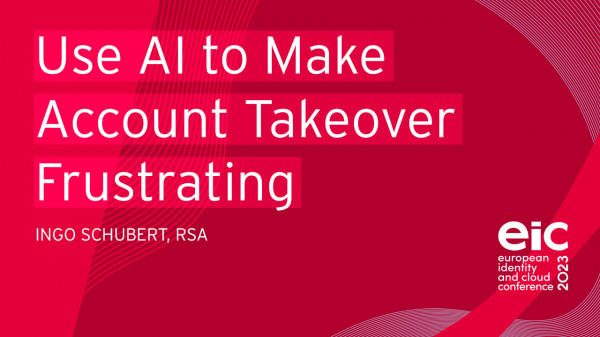
Sure, MFA goes a long way in preventing account takeover but it is only one layer. Using AI to look at identity data to evaluate risk can add an additional layers – not only to prevent takeover but mitigate the impact once a takeover happened.
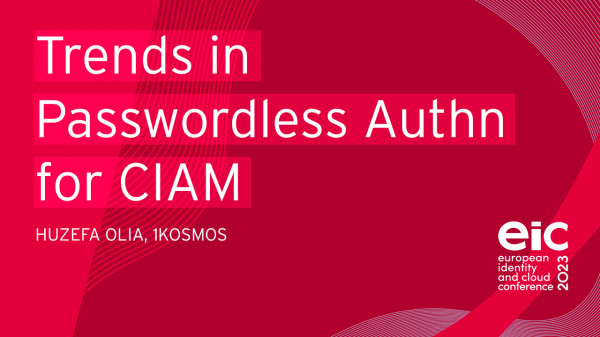
Passwordless helps in reducing ATO fraud, provides better security, and smoother experience. But the passwordless approach for each organization and region is fundamentally different, in large part because the journeys or flows that your customers will take are unique. In this session Huzefa Olia will talk about the various options that an organization can introduce for Passwordless access for their customers.
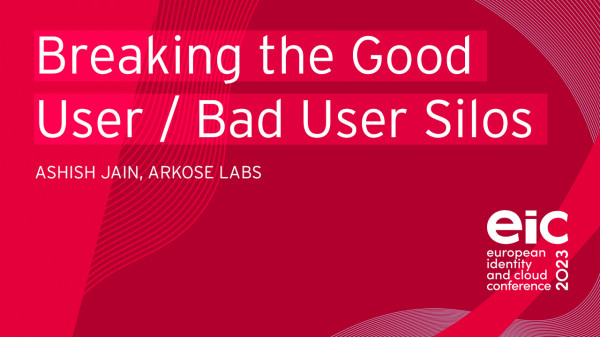
Do you know during the peak holiday season, 75% of the traffic on your site can be malicious or bot?
In 2022, there has been an 85% increase in Account takeover and it results in not only monetary losses but also losing consumer trust.
To address these, the right authentication strategy is a combination of active authentication (SMS, Push Notification, WebAuthn, passkeys) and passive authentication that includes IP reputation, device fingerprinting, and user behavior analysis. This enables a frictionless experience for “good users” without lowering the defenses for “bad users.”
In this session, we’ll explore Dark Web techniques, open-source tools, and services that fraudsters use for credential stuffing, fake account creation, and account takeovers. In addition, we’ll share a practitioner's viewpoint on rolling out various active and passive authentication solutions and how the convergence of identity and fraud can help you build the right passwordless strategy.
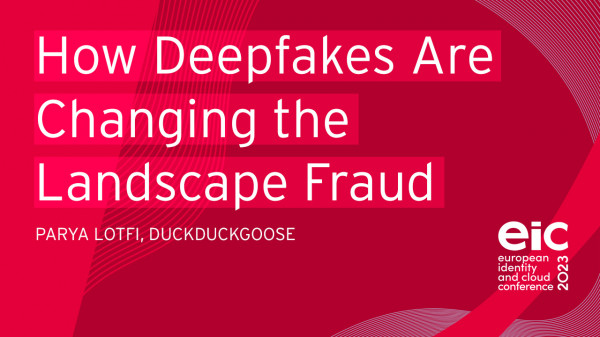
Explore the latest developments in deepfake technology and its impact on identity fraud. With deepfakes becoming increasingly realistic and widespread, it is essential for businesses and organisations to understand the risks they pose and take action to mitigate them. Attendees will gain a comprehensive understanding of the risks posed by deepfakes to the identity verification industry and how to protect their organisations from them effectively. The session will feature expert insights and real-world examples of how businesses and organisations can implement deepfake detection technology and other measures to prevent identity fraud.

Privilege escalation is also one of the most common techniques attackers use to discover and exfiltrate sensitive valuable data. From a hacker’s perspective, privilege escalation is the art of increasing privileges from the initial access, which is typically that of a standard user or application account, all the way up to administrator, root, or even full system access. With NT AuthoritySystem access or on Linux the root account, attackers have full access to one system. With Domain Administrator access, they own the entire network.
• Top Methods of Privilege Escalation on Windows and Linux
• Common Tools used to identify Privilege Escalation
• And more...
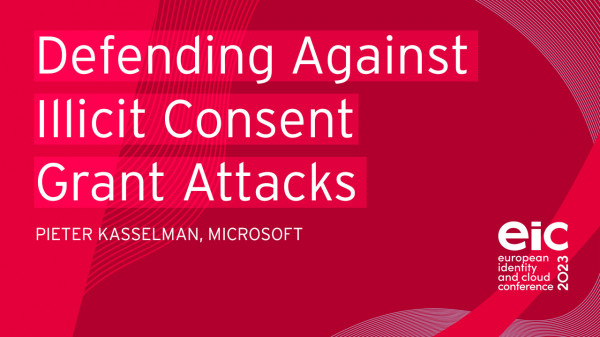
Cross device flows lets a user initiate an action on one device (e.g. a SmartTV) and authenticate or authorize that action on a trusted personal device (e.g. a mobile phone). Examples includes authorizing a smart TV to access streaming content, or authenticating to a service by scanning a QR code with a mobile phone and completing the authentication on the mobile phone. This process of authorizing an action on a separate (but trusted) device from the one on which an action is initiated is an increasingly common flow, whether used for devices with limited input capabilities, multi-factor authentication or credential presentation. A number of standards have adopted this pattern including Device Authorization Grant (formerly Device Code Flow), Client Initiated Backchannel Authentication (CIBA) and Self Issued OpenID Provider (SIOP). These flows solve important business problems, but is vulnerable to attacks where the user is tricked into granting consent to an attacker. The IETF OAuth working group has recognised this challenge and is creating new guidance that leverages zero-trust principles to defend against these "illicit consent grant" attacks. This session will discuss the attacks and how the new guidance can mitigate these threats against cross device flows.
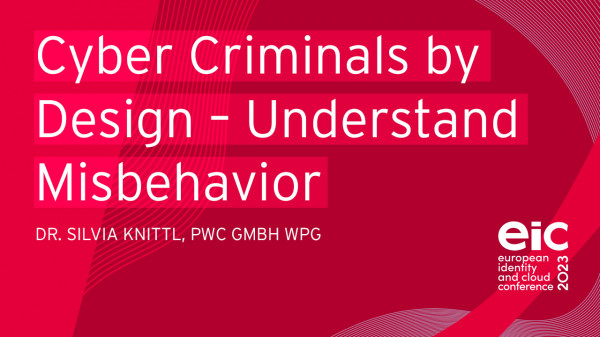
A digital twin is a virtual representation of a real-life subject. This mapping encompasses its entire lifecycle, is updated from real-time data, and uses simulation, machine learning, and reasoning to support decision-making.
Human beings and their behavior can also be copied and simulated by digital twins. During the last talk at the EIC conference, we already looked at the threats, challenges and opportunities creating digital twins in cybersecurity.
This time we want to discuss how we can dive into a world through a digital twin of a cybercriminal to change perspectives and to understand the cybercriminals behavior.
Imagine having a tool that can perform these simulations at the highest level. Why not use it to our own advantage?
A digital twin that not only simulates the approach and behavioral patterns of cyber criminals but can also predict ahead of time. What if we can turn the tables on cybercriminals by fighting fire with fire?
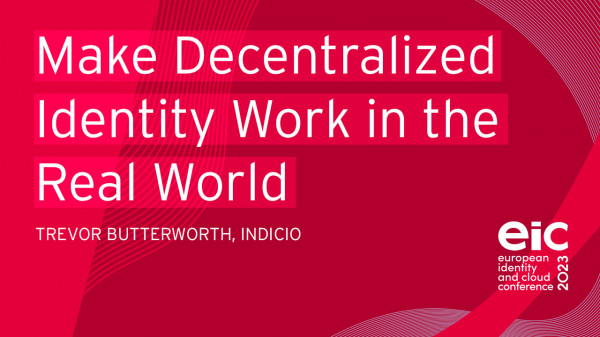
Decentralized identity has long been seen as a solution to the interconnected problems of verification, privacy, and security online, but now that it is being deployed in the marketplace, how does it manage the complex information flows and rules required by enterprises and governments? Much theoretical discussion has focused on what should happen, but in this conversation, we’ll discuss what actually happens when a customer implements a decentralized identity solution. We’ll explain why decentralized ecosystem governance is preferred to centralized trust registries, the importance of portable trust, automation, updating, and offline functionality, and why customers need to be able to choose between hierarchical and distributed governance.
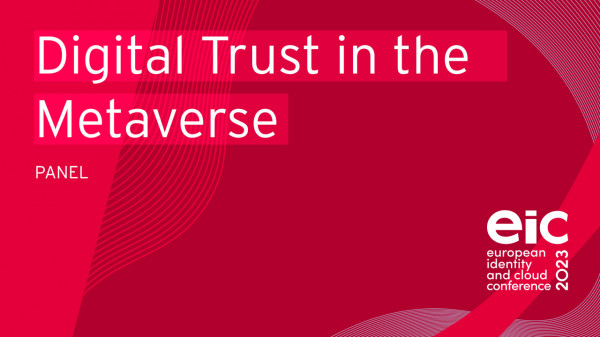
Phishing, hacking, threats, fraud, and malicious behavior online of all types all share a common root: verification. In this session we’ll go beyond identity and explain how decentralized identity and verifiable credentials can provide a complete, secure system for exchanging different types of information between multiple parties. Learn how Trusted Data Ecosystems can connect people, machines, companies or any two entities to multiple businesses and jurisdictions without sharing private information. In this conversation, long-time community contributor at Hyperledger, working group leader at Decentralized Identity Foundation, and Indicio Senior Engineer Sam Curren will share more about digital trust and describe the critical importance of digital verification to decentralized healthcare, finance, the metaverse, and to the interaction of digital objects and non-digital objects in the spatial web—the “Internet of Everything.”
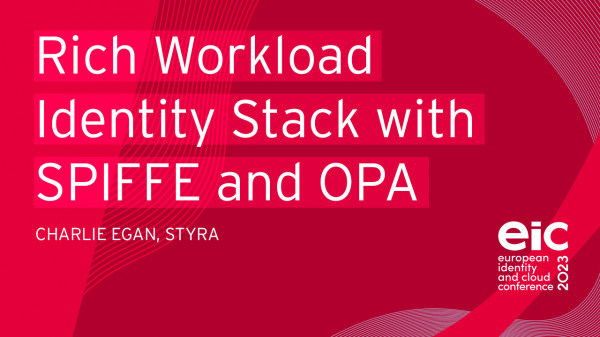
What’s the highest value platform feature you can offer your Kubernetes tenants? It might be standardizing workload identity and policy controls. In this session, we will discuss desirable properties for a workload identity and present a modern architecture built on SPIFFE and cert-manager which uses Open Policy Agent (OPA) for policy decisions. This should leave you with actionable ideas to help you re-evaluate your workload identity functionality and security posture.
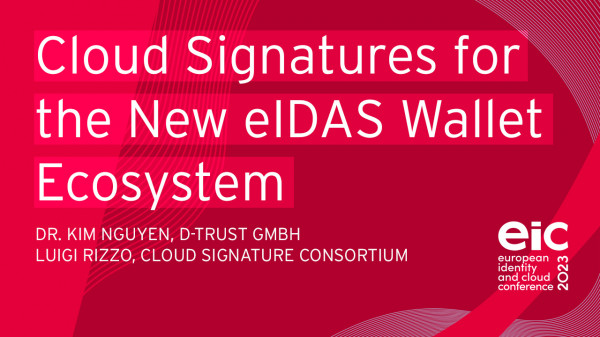
To enhance interoperability between digital identity schemes and digital trust services across borders, the eIDAS regulation provides a legal framework for electronic signatures in the EU, defining how to use them to ensure their validity across Europe. eIDAS2 now includes plans for the creation of a European Digital Identity Wallet (EUDIW). Cloud signatures are expected to play a vital role across this new ecosystem by enabling natural and legal persons to electronically sign and seal documents and transactions with high-assurance remote digital signing certificates. Cloud signatures based on the Cloud Signature Consortium (CSC) Standard can help achieve cross-border interoperability via specifications and certification for the usage of Remote Electronic Signatures and Seals in this new pan-European digital identity ecosystem.
Join us to learn about the new CSC Standard general architectural framework in specific eIDAS context (Kim Nguyen, CSC Board Member, D-Trust) and for a technical deep-dive into the recently launched CSC Standard version 2.0 (Luigi Rizzo, Chair of the CSC Technical Committee, InfoCert).
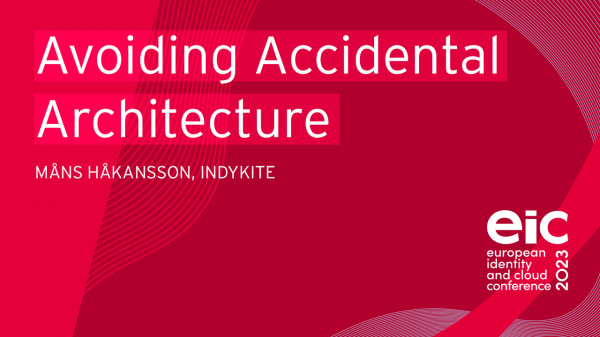
Graph is having its moment and rightfully so. Regulatory challenges, overly complex authorization scenarios and retrofitting legacy programs to meet new business needs are squeezing businesses. Implementing a graph-based approach can remove these obstacles and reduce risk.
But for many businesses, this is where graph-based implementations start and stop.
In this session, we will discuss how to turnidentity data into identity knowledge and what that can deliver. We will dive into data models that drive contextual and real-time decisions - data models which are foundational for enabling complex authorization use cases and beyond.
Finally, we will explore the benefits of graph-based deployments in your existing environments, including the value of a holistic and visually simplified data model and avoiding the accidental architecture challenge
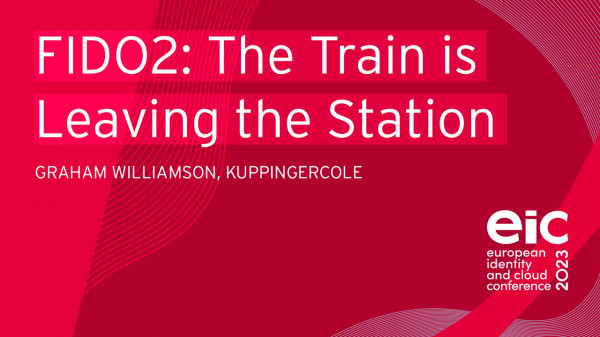
The FIDO Alliance is working to change the nature of authentication with open standards that are more secure than passwords, simpler for consumers to use, and easier for service providers to deploy and manage. While initially focused on the consumer space FIDO2 holds advantages for the enterprise willing to break the mould on legacy authentication models.
This session will look at the components of a FIDO2 environment and investigate the options for FIDO deployments. A view of the possible future of FIDO will be discussed.
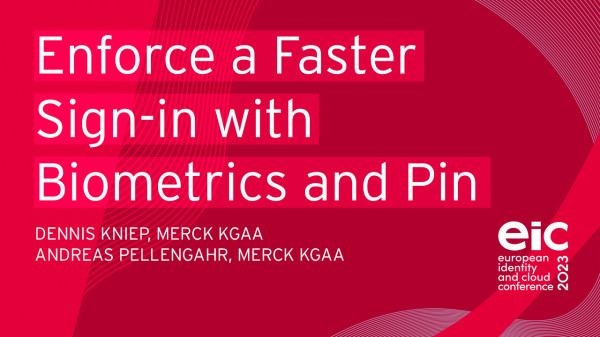
Join this session if you want to learn how a globally operating science and technology company introduced a faster and phishing-resistant sign-in – driven by the open-industry standard FIDO.
Employees use Biometrics or Pin, instead of Password & SMS, Call or App.
A “Detached Authentication” feature enables apps without FIDO/WebAuthn support and allow us to globally enforce the phishing-resistant sign-in – without fallback to other MFA methods.
Identity Verification is required for the registration and recovery of Biometrics or Pin. SaaS or self-developed identity verification methods can be used and combined.
The infrastructure for authentication and registration of Biometrics and Pin runs in a self-hosted environment. It allows us to stay true to our principles: Own Identities, Credentials and Authentication.
# What makes it unique
Passwordless Sign-in
– Biometrics of device-in-use
Biometrics sign-in available for all apps
– Detached Authentication for apps without WebAuthn
Biometrics sign-in enforced for all users
– No SMS, Call or Authentication Apps
Onboarding, Registration, Recovery, Password Reset
– Self-services secured with identity verification
Centrally stored FIDO-Credentials for multiple IdPs
– Self-hosted infrastructure with IdP plugins
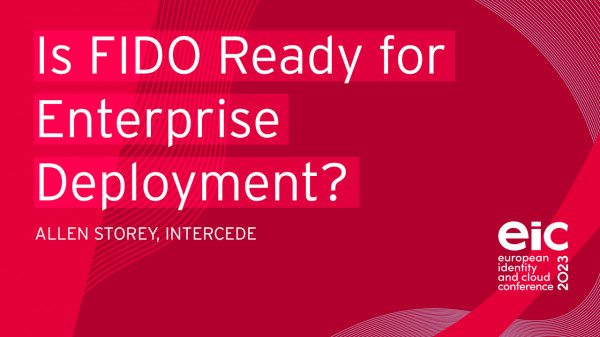
With the ever-increasing number of cyber-attacks, level of fines and unstable geopolitical climate, organizations are looking to better protect themselves against data breach by deploying phishing resistant authentication for their workforce.
FIDO combines the benefits of high security with a standards-based approach, but with its background in the consumer world, including privacy by design, how does it fit into an enterprise deployment with the increased demand for identity management?
This session will discuss:
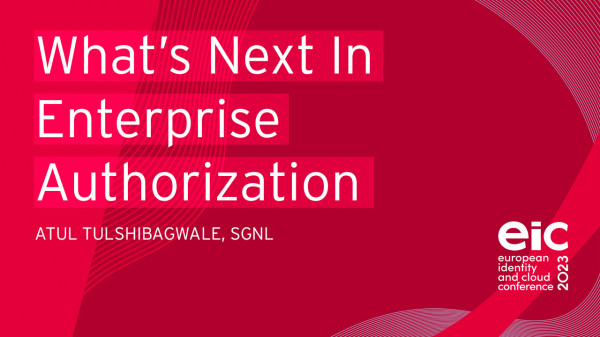
As organizations undergo digital transformation to zero-trust architectures, identity-driven security becomes a critical aspect. Beyond new authentication technologies, organizations must have strong authorization controls. Today, if and when an identity is compromised, the attacker can make lateral movements with very few restrictions and access a wide range of critical systems and information. Much of this over-permissive environment can be attributed to manual permissions management processes that are hard to maintain over time. Role-based Access Control (RBAC) and Attribute-based Access Control (ABAC), which underlie these manual processes, provide a good baseline for access security. However, their complexity grows over time and the management overhead they place oftentimes subvert the very goals of security and compliance they are deployed for. Just-In-Time Access Management (JITAM) represents a new robust and secure authorization strategy that can reduce the need for periodic access certifications and manual role administration, while providing auditability. Learn how the authorization space is rapidly changing from RBAC and ABAC to JITAM, and how it could benefit your organization.
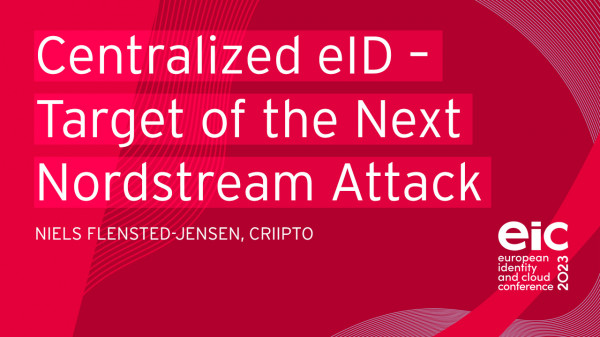
With the vast centralization of government digitization in general, and issuance and operation of Digital Identity services in particular, the Nordic countries have made themselves unnecessarily vulnerable to attacks by actors such as those with the resources to blow up the Nordstream pipelines in the Baltic Sea.
With the new Danish digital identity, MitID, as an example, I will discuss
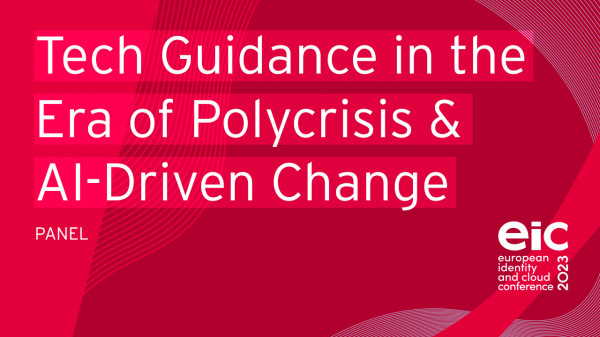
The most interesting thing about recent AI innovations in the field of LLMs (Large Language Models) such as ChatGPT is that there is not much discussion going on about the effects LLMs will have on our daily lives, the way we consume information, seek guidance and the way we create information. Will we still need Identity Governnance Tools in 5 years time or will a universal cyber-AI have taken over the task of securely running the enterprise you currently work for? What about Tech Analysts and their guidance work? Will 90% of their work be done by non-humans? In this session we will try to jointly find answers on how tech guidance and consulting/advisory will change and, at least partly, disappear.
And this is how ChatGPT would write the Abstract of this discussion:
The session on "Tech Guidance in the Era of Polycrisis & AI Driven Disruptive Change" will examine the increasing disruptive pressure on today´s business models caused by an evolving landscape of AI driven technology and the critical role of tech analysts to help organizations navigate the challenges and opportunities presented by the convergence of multiple crisis and the rapid pace of technological change.
Topics to be covered include the evolving role of tech analysts in an AI-driven world, the importance of understanding the ethical implications of technology, and the impact of technological change on job markets and society as a whole. The session will also delve into the challenges of staying abreast of an increasingly complex and rapidly changing technological landscape, as well as the importance of fostering a culture of innovation and collaboration within organizations.
Attendees will have the opportunity to engage with speakers and other participants in a lively discussion of these critical issues, gaining valuable insights into the future role of tech analysts in helping organizations succeed in an era of polycrisis and AI-driven change and disruption.
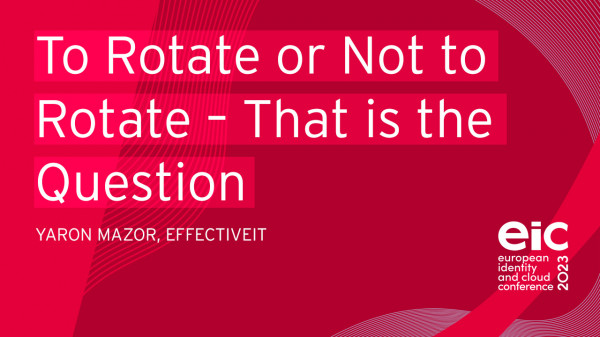
Rotating credentials of some privileged accounts is a risky task, which might lead to a business shutdown when things go wrong. But the alternative of not rotating them opens the door for attackers to take hold of your organization - thus leading to a business shutdown as well. This is a lose-lose situation.
So what should we do ? Rotate or not rotate credentials of privileged accounts ?
In this session we will discuss about the challenges and solutions.
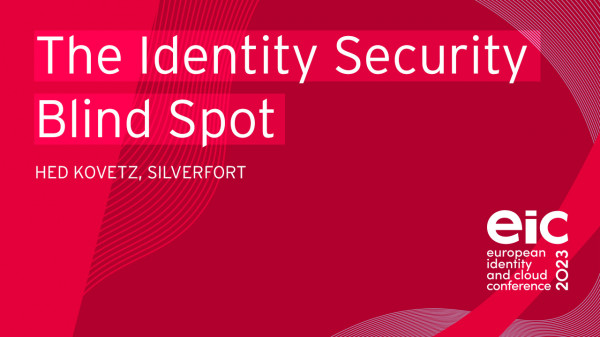
MFA and other identity security controls are very effective in stopping cyber attacks, and are widely used on modern apps, but until now they couldn't be applied to legacy apps, service accounts (non-human identities), command-line interfaces, OT systems and many other critical resources. These 'blind spots' are targeted in almost all data breaches and ransomware attacks, and often prevent compliance with regulations and cyber insurance requirements. Join this session to learn how your existing MFA and modern identity solutions can be extended to all these legacy assets using a new technology.
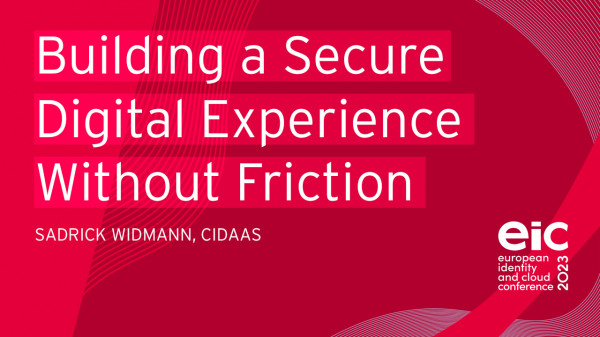
As the number of digital touchpoints in the customer journey increases, IT teams rely on customer identity to optimize security and user experience. However, ensuring one doesn't overshadow the other often requires multiple integrations and custom development, creating internal friction and slowing innovation.
In this talk, Sadrick Widmann, CEO at cidaas, will explain how to remove barriers and improve cross-functional collaboration to bring seamless, secure customer experiences to market faster.
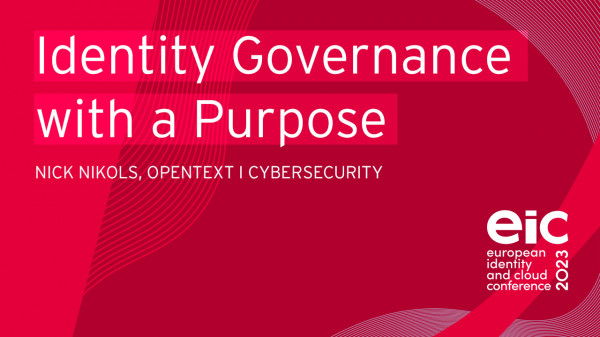
Deciding what constitutes appropriate access to sensitive information is a growing challenge for today’s enterprise. Whether it is regarding securing mission critical enterprise data or protecting the privacy of data gathered about the organization’s customers, an often-overlooked element is capturing and documenting the reasons why a given access request or entitlement is necessary and appropriate for the continued operation of the business. Organizations are required to manage the data that they are entrusted with in a secure, purpose-based, and privacy-compliant manner. Identity Governance processes can help the enterprise review the current state of access, make decisions regarding the validity of this access state, and attest to its accuracy. Identity Governance processes are also ideally suited to also document the reasons why this access state is appropriate and necessary for business operations.
This session will cover how Identity Governance processes can help enterprises refine their security, make better access control decisions, and provide much clearer accountability around why access is granted – all in better alignment with Zero Trust initiatives.
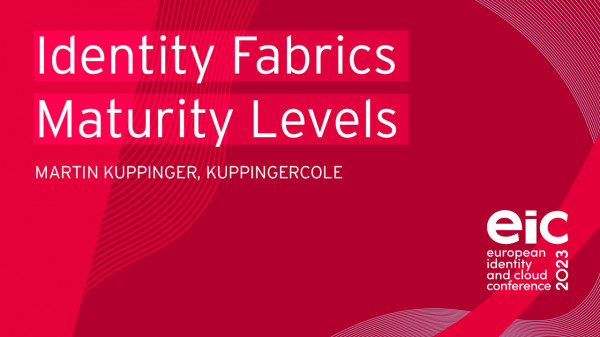
The term “Identity Fabrics” stands for a paradigm and concept of a comprehensive and integrated set of Identity Services, delivering the capabilities required for providing seamless and controlled access for everyone to every service. Identity Fabrics support various types of identities such as employees, partners, consumers, or things. They deliver the full range of identity services required by an organization.
Identity Fabrics are not necessarily based on a technology, tool, or cloud service, but a paradigm for architecting IAM within enterprises. Commonly, the services are provided by a combination of several tools and services, with up to three solutions forming the core of the Identity Fabric. Most organizations that are using this paradigm as a foundation for the evolution of their overall IAM tend to build on a strong core platform for delivering major features and complementing this by other solutions.
We will look at what must be in every Identity Fabric, and how to evolve from a foundational Identity Fabrics approach towards a higher level of maturity. The session will look at concrete capabilities per maturity level and service group within Identity Fabrics.
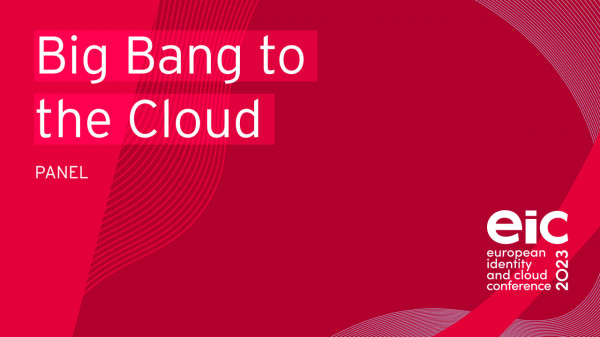
Managing access is a critical capability for the IT infrastructure of any enterprise, especially when dealing with over 6,800 integrated applications used by millions of authentication requests. Due to the increasing demand for availability, scalability, and support for market-specific customizations, as well as the migration of more products and applications to the cloud, we had to migrate our infrastructure and application stack to the AWS cloud. This stack had been introduced in an on-premises setup in 2017 and now follows modern paradigms such as GitOps, Everything as Code, and highly automated processes based on Service Layers and ForgeRock. Our main concern was ensuring that the integrated application landscape remained functional during the migration without experiencing any impact or downtime.
During this presentation, we will share our experience and discuss the key takeaways from our successful large-scale production system migration to the cloud, including:
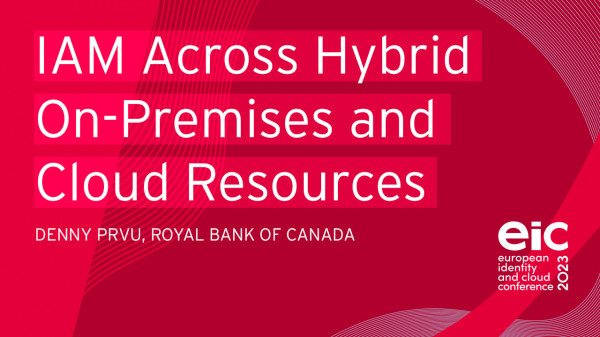
We will be discussing an identity fabric model that allow for growth, ease of integration, and a way to future proof your organization.
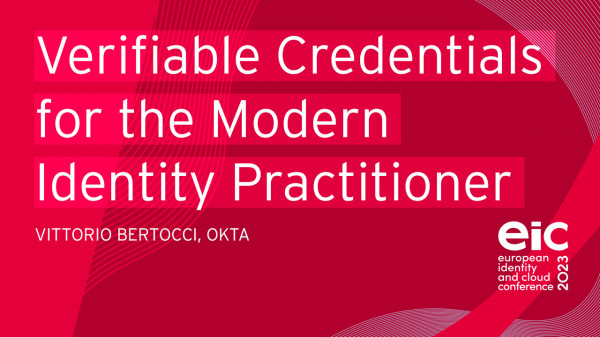
You heard about Verifiable Credentials and decided to learn more. You found some stuff online, but despite knowing your way thru identity, you still can't really tell how they work in practice (wallets? presentations?) or how the boldest claims (no more centralized DBs! Apps cannot save PII!) will play out. This session will dive into VCs and separate the hype from their true, remarkable potential.

In 1994, Italian physicist Cesare Marchetti discovered something: cities expand as a function of transportation speed. In short, “transportation is the lifeblood of a city.” Innovation in transportation has driven the expansion of cities—from small, walkable areas to the sprawling, car-based metropolises, presenting a challenge for urban planners.
Identity in the modern organization faces a similar challenge: if transportation is the lifeblood of cities, then identity is the lifeblood of organizations. And our organizations are not ancient, walkable Rome, but modern, sprawling Atlanta—with identities and resources widely strewn around the globe.
Like urban planners, we face a nearly-intractable challenge: how can we provide access to resources and data easily while still meeting the stringent demands of security and compliance?
Thankfully, there appears to be a solution for both urban planning *and* identity, albeit from an unexpected source: Ordinary slime mold. Aka, “The Blob.”
We’ll learn from this simple organism, describe how its simple actions create complex systems that solve these sorts of “unsolvable” problems, and see how the Blob might “think” about identity.
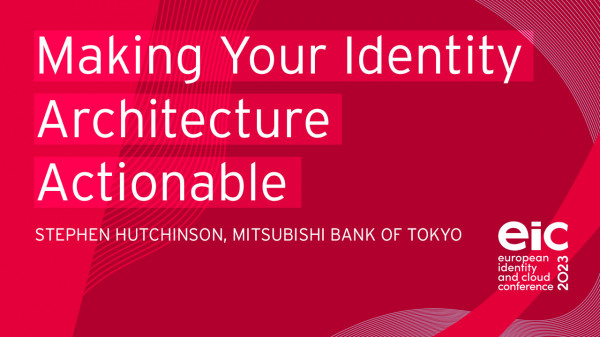
|
As an identity professional, you're constantly studying and reviewing new technologies, new protocols, and new products within the space but you struggle for the best way to extract the value of these new shiny, items to benefit your organization. You've been told that a well-developed identity architecture plan is the best way solve business challenges and produce concrete results but your research and fully-notated diagrams have failed to engage your peers. |
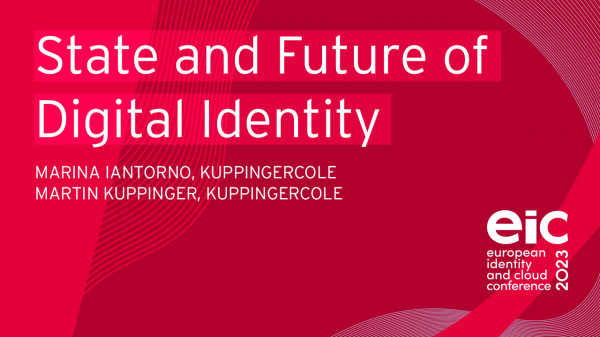
KuppingerCole conducted a series of polls over the past months, gathering data about the state and future of IAM. Together with the ongoing market sizing analysis and predictions of the KuppingerCole analysts, we’ve created a study providing insight into our assessment of the current state of the IAM market as well as where we see the market evolving. Martin Kuppinger, Principal Analyst at KuppingerCole Analysts, and Marina Iantorno, Analyst at KuppingerCole Analysts, will present selected results from that study and share their perspectives on the evolution of the IAM market.

An Identity Fabric Program program moves beyond established tooling and focuses on outcomes and the elimination of technical debt or heavy customizations that hinder the organization’s ability to deploy at scale. Identity Fabrics shift the focus from tactical or manual operations to more strategic functions that are optimized to business objectives. Identity Fabrics are key to successful digital transformations and therefore a sustainable deployment strategy will deliver recognized business value and a significant competitive advantage.
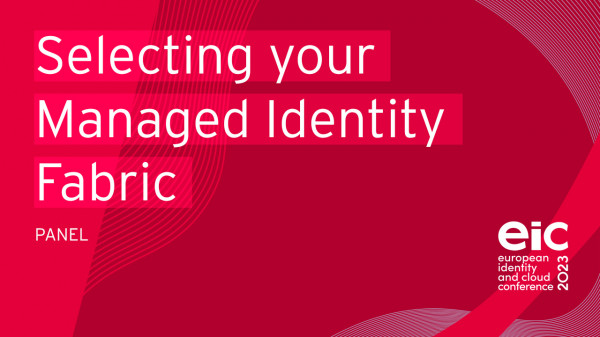
IDaaS, the SaaS-delivered IAM, helps organizations releasing themselves from a considerable part of the burden that IAM brings. They don’t need to care for software installation and running servers. However, IDaaS is only part of the answer here. Customers still must managed and run their IAM environment.
This is where MSPs (Managed Service Providers) and their services come in . They help the organizations in managing major parts of IAM, from onboarding of systems to customization and configuration, but also for a good share of the business-oriented aspects.
MSPs also can help organizations in providing a real IDaaS in the sense of customers/tenants just ordering services, without even caring about the technology below. They buy the services delivered by an Identity Fabric that is built and run by their service provider (which then again might rely on one or more SaaS services).
In this panel, we will discuss how such a “managed Identity Fabric” can look like and what this means to both the MSPs and their tenants. We’ll specifically focus on what distincts such a managed Identity Fabric from just a standard IDaaS offering, and from a MSP operating the IAM the customer already has in place. We’ll discuss the main criteria and capabilities for selecting the managed Identity Fabric.
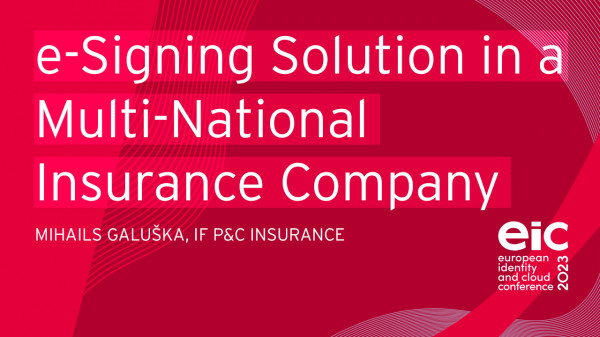
A journey of the multi-national insurance company to find and introduce a smooth corporate e-signing solution, both legally and technically well-justified. A story of considering and aligning different dimensions to find a tiny path between legal trust and protection, technical constraints, smooth user experience, global EU Regulation (eIDAS) and country-specific local habits.
It was a huge puzzle to identify and solve all the critical actual and future needs of the different business use cases for e-signing across the company to come up with a singe corporate solution and move gradually away from the very fragmented and mainly technically driven landscape of signing solutions.
Traditionally those have been introduced as the ad-hoc remedy to some local needs in isolation from other initiatives and without proper validation of both short and long term legal impact to the company.
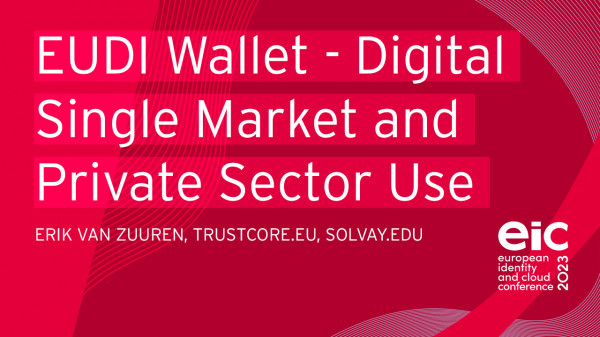
|
Why the private sector is the major milestone for the European Identity Wallet to succeed ? Let’s discuss: |
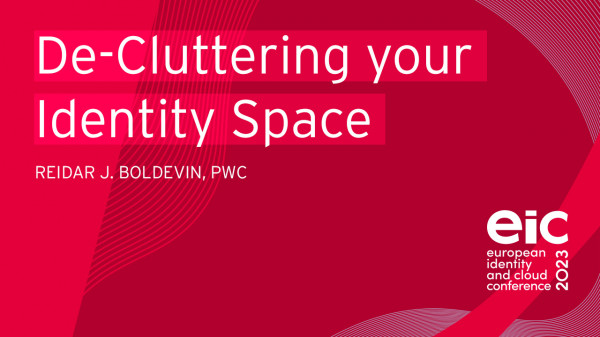
My presentation is based on a statement during the 2022 CISO panel at the European Identity & Cloud Conference. The statement claimed that undue complexity any identity and security architecture may create a security risk in and upon itself.
I'd like to present a case where I postulate what needs justify introducing a third party IAM og IGA solution, and when the current state of the Microsoft identity (Azure AD/Entra) platform is likely to cover the needs of an organization.
In my presentation I will primarily explore the needs of the SMB organization and to some degree a less complex MLE organization and try to assist decision makers in navigating the often difficult task of deciding if what you have is good enough.
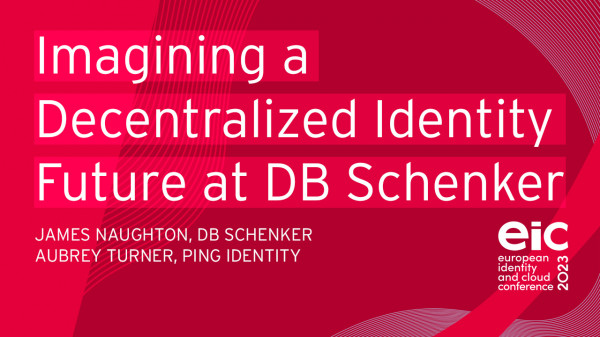
IAM is hard enough without the additional complexities that logistics companies face. Warehouses need to be secure, but it’s difficult to find an identity solution that’s suitable for short-term staff who don’t have or can’t use computers, mobile devices, or biometrics in their work environment. Until recently Decentralized Identity has been stuff of dreams, but that is rapidly changing and the lines between identity and authentication blurring even more. In this session, we’ll explore how a future powered by Decentralized Identity is offering logistics giant DB Schenker a path to stronger security while maintaining productivity in its warehouses—providing a fast, flexible and interoperable way for workers to verify their identity.
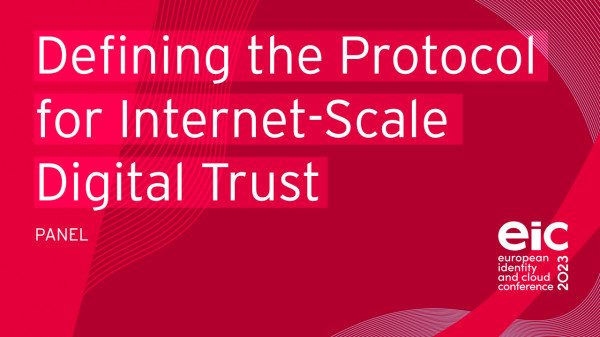
The Trust Over IP Foundation (ToIP) is focused on the centerpiece of the ToIP stack: the trust spanning protocol that will do for identity interchange what the Internet Protocol did for data interchange. This panel will explore how this will enable ubiquitous, trusted, interoperable identity exchange.
The internet was designed without a trusted identity layer to connect physical entities to the digital world. This layer is now emerging in the form of decentralized digital identity systems based on digital wallets and digital credentials. ToIP was founded by a pan-industry group of leading organizations with a mission to provide a robust, common set of standards forming a complete architecture for internet-scale digital trust. The ToIP Technical Architecture Specification V1 was completed earlier this year. Now ToIP is focusing on the keystone to ubiquitous identity, the ToIP Trust Spanning Protocol. This protocol will do for identity interchange what the Internet protocol did for data interchange.
This interactive panel, moderated by ToIP’s Executive Director, will explore the views of its member organizations for a lively and engaging debate on how we finally establish trust in the digital age. Come to this panel to understand the why, how, and when of this new protocol.
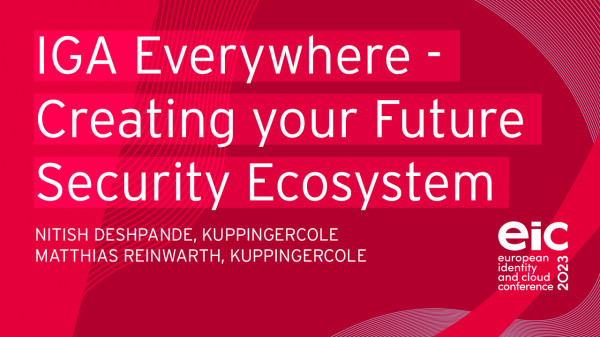
Identity Governance and Administration (IGA)is a core component of Identity and Access Management (IAM) infrastructure and refers to integrated solutions that combine Identity Lifecycle Management (ILM) and Access Governance. IGA helps to cut costs, increase security, improve compliance, and give users access to the IT resources they need.
Depending on maturity in terms of IAM, some organizations may need to bolster their capabilities in ILM while others need to focus on Access Governance. But most organizations are looking for a comprehensive IGA solution, that combines traditional User Access Provisioning (UAP) and Identity and Access Governance (IAG).
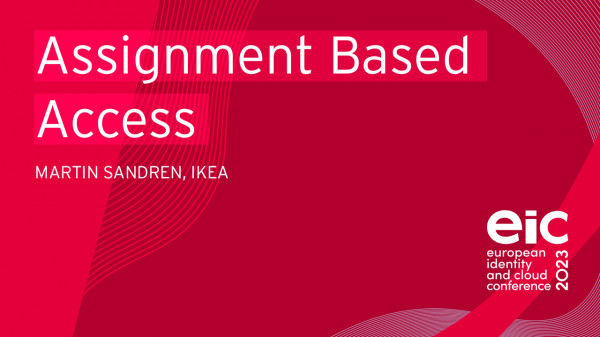
In the current economical climate many companies are facing the need to restructure the operations to ensure efficieny and profitability.
This does in some cases result in layoffs but is also means that projects are cancelled and the staff that was assigned to these projects are freed up for other efforts. In IAM terms the results is a lot of movers in the organisation which traditionally has been a usecase that has been challenging to efficiently support.
How do we help the business and support the need for assignment based access to ensure efficient usage of staff? This talk will look at the lessons learned from implementing assigned based access at a global retailer. It may also include Swedish meatballs, flatpack furniture and moose hunting towers.
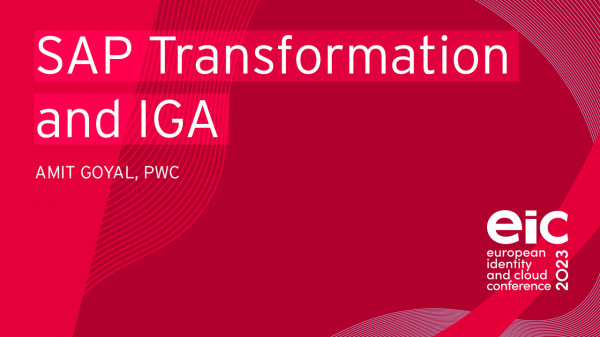
Various large organizations typically have invested heavily in SAP as well as IGA. There comes a point where the two systems start overlapping functionalities. This session will provide a viewpoint on an integrated IGA approach based on organization needs.
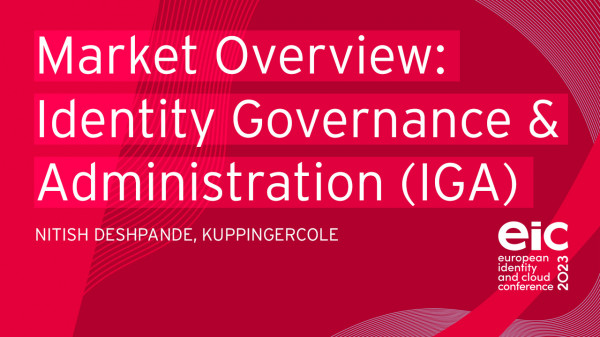
The Identity Governance and Administration (IGA) market is continuing to evolve through more integrated Identity Lifecycle Management and Access Governance solutions that are now increasingly aided by intelligent features. In this session, KuppingerCole´s Nitish Deshpande will share with you insights into the IGA market, providing you a compass to help you find the products that can meet the criteria necessary for successful IGA deployments.
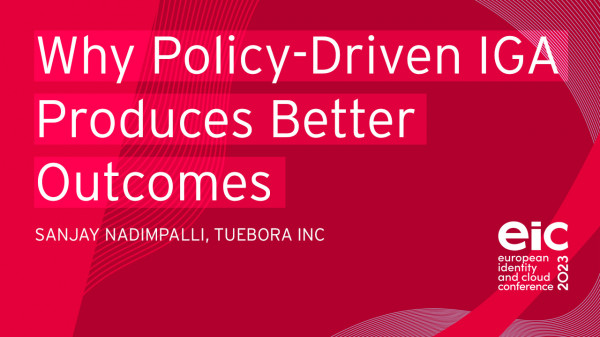
IGA activities in organizations have largely been around defining access policies manually, configuring access request workflows and scheduling periodic access reviews. Such activities require significant administration as well as continuous involvement by stakeholders. There are also delays that come with this model that could potentially cause security risk and non-compliance in the organization. An approach that is more intuitive is to discover policies, review them and apply access changes based on policies. This results in fewer IGA administrative and end-user activities for the organization while ensuring that both excess access and under access are addressed in a timely manner.
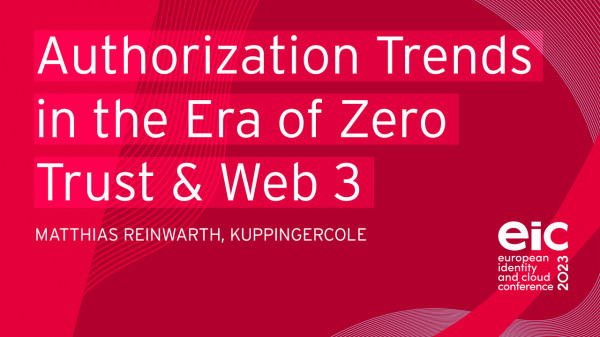
In this Session we will look at the business and security benefits of moving to policy-based access controls (PBAC), how this supports a Zero Trust approach to security, and how PBAC can be practical and scalable in hybrid and multi-cloud IT environments. We will look at some of the main authorization use cases that are driving change in enterprise architecture teams. We will also share recommendations on how organizations can improve security, enhance brand trust, and deliver better user experiences.
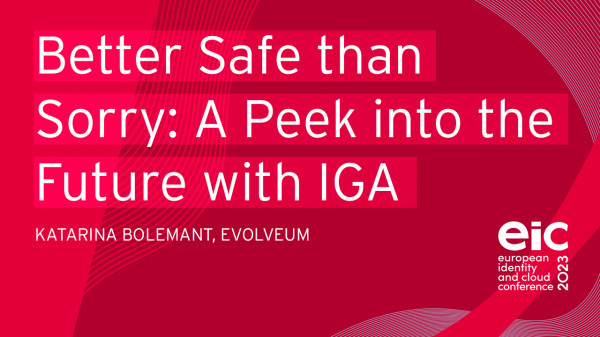
Engineers across organizations struggle with increased anxiety and stress every time they hit the push button to make complex system changes. One mistake can hinder business as usual, introduce unnecessary risks, and cause non-compliance with policies that can cripple the whole organization.
Simulations could be the answer engineers are looking for. They are used in various fields to study complex systems and help engineers create hypothetical scenarios to see the impact of certain changes before implementing them.
In this presentation, the Evolveum Development Team Leader, Katarina Bolemant, will explain the motivation and common pain points of deploying an IGA solution. She will show you the endless possibilities of using simulations to evaluate the impact of changes and how to identify potential issues and reduce the risks of errors. Using simulations will lift the burden off engineers’ shoulders, increase confidence in their decisions, and build stronger relationships with other stakeholders.
Offer a peek into the future, and both technical personnel and decision makers will appreciate you for providing the possibility to review the simulated results and make necessary adjustments before implementing changes in the production environment.
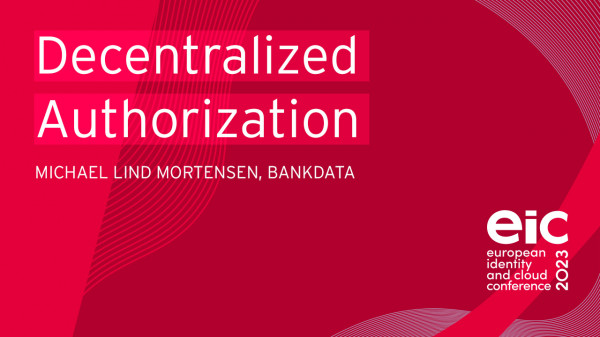
Authorization (AuthZ) and Authentication (AuthN) go hand in hand in ensuring zero-trust in your system landscape. But while scaling identity can be done by centralizing it in an IAM solution, centralizing authorization is seldom a scalable solution. Increased latency, varying requirements and maintainability are all key reasons to want a more decentralized solution that can adapt and scale.
In this talk we will describe how to use Open Policy Agent (OPA) to achieve decentralized authorization in a multi-platform API landscape, including both modern and legacy platforms, while simultanously ensuring centralized compliance controls and enforcement.
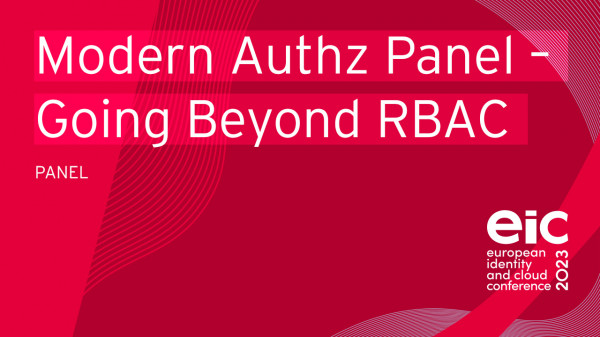
Every cloud-native application needs some form of access control. Most applications provide role-based access control (RBAC), which has limitations when it comes to enterprise scale and fine-grained access control.
Zero trust architectures require us to go further. Following the principle of least privilege, modern cloud apps can implement just in time authorization with fine-grained controls. With a fine-grained model, access rules can be defined on the application’s resources, often down to individual items. And a just-in-time model helps ensure the user has access to what they need, when they need it.
Two ecosystems are emerging around modern authorization: Policy-as-code and policy-as-data. Open Policy Agent (OPA) brings a policy-as-code approach to fine-grained authorization, and Google’s Zanzibar is the most known representative of the policy-as-data camp.
Join the panelists to discuss new developments in modern authorization, and compare the strengths and weaknesses of policy-as-code and policy-as-data as foundational models for a robust access control system.

Policy Based Authorization is becoming the new normal when it comes to identity-centric access controls. However, there is no standard approach to PBAC deployment that fits all use cases. In this session we will look at PBAC requirements for common use cases such as microservices, cloud, API, data & analytics.
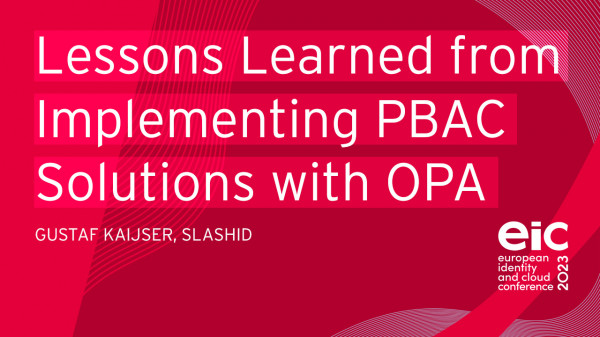
During the last 3 years we have seen a significant uptake on decoupled authorizations solutions, the main drivers behind this is a move to the cloud, micros services and ZT implementations. In this speech Gustaf Kaijser will walk you through the feedback he has been getting from the organisations that have implemented OPA based solutions the last years, and the significant gains that they have seen in:
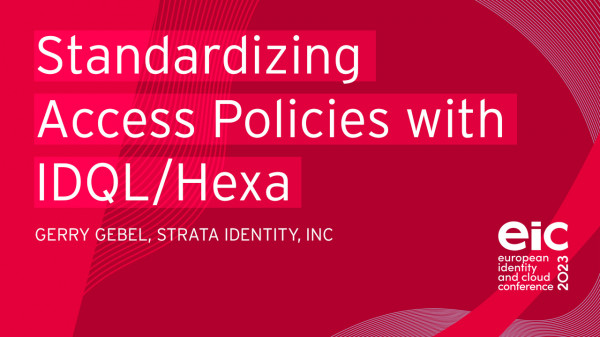
The adoption of multiple clouds is accelerating across all industries. While multi-cloud brings many benefits, it also results in new challenges. Organizations must manage platform-specific access policies in the bespoke policy syntax of each cloud.
Security and risk gaps arise between cloud identity systems due to the increased policy fragmentation and technical complexity that can obscure visibility and make it difficult to determine who has access to what.
These challenges grow exponentially when you consider the various access policies (and system languages) associated with each data, network, and platform layer (and vendor) in an organization’s tech stack.
This session will describe an open-source solution to multi-cloud access policy fragmentation: Identity Query Language (IDQL) and Hexa Orchestration. IDQL and Hexa are two sides of the same coin that together perform policy orchestration across incompatible cloud platforms.
IDQL is the universal declarative policy language that can be translated into a target system's proprietary or bespoke access policy format. Hexa is the open-source reference software that brings IDQL to life and makes it operational in the real world by connecting to target systems and performing the three main functions of discovery, translation, and orchestration.
Hexa Policy Orchestration was recently accepted as a Cloud Native Computing Foundation (CNCF) sandbox project. The session will include a technical review of Hexa plus a demonstration of current capabilities.
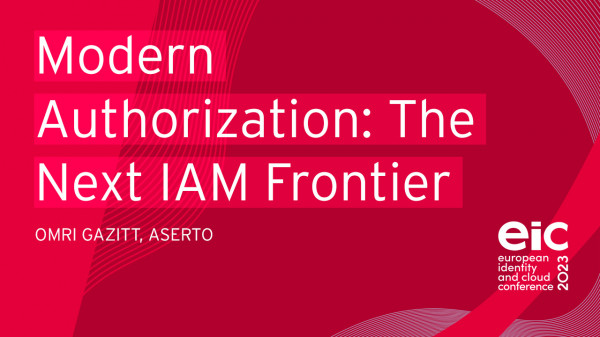
Identity and access have always been joined at the hip. In the age of LDAP, authenticated users were granted permissions based on group membership. But this mechanism hasn’t transferred into the federated identity landscape.
Instead, modern identity systems try to generalize permissions into scopes that are embedded into access tokens. But this doesn’t facilitate fine-grained authorization - a “read:document” scope doesn’t typically mean the user can access every document!
While identity has moved to the cloud, we still don’t have fine-grained, scalable mechanisms for generalizing authorization. So every application builds its own, and IT ends up administering every application differently.
Fixing this is arguably the most pressing challenge for the IAM industry. In this talk, we propose a set of principles, inspired by zero-trust and the latest work in cloud-native authorization, that should underlie the solutions we build:
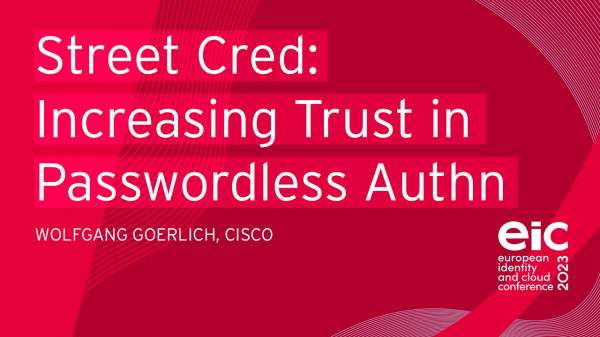
Good security gets out of the way of users while getting in the way of adversaries. Passwords fail on both accounts. Users feel the pain of adhering to complex password policies. Adversaries simply copy, break, or brute-force their way in. Why, then, have we spent decades with passwords as the primary factor for authentication?
The industry needs to trust passwordless authentication (FIDO2). Adversaries and then criminals have circumvented our authentication controls for decades. From the very first theft of cleartext passwords to the very latest bypass of a second-factor, time and again improvements in defenses are met with improved attacks.
What holds us back from getting rid of passwords? Trust. In this session, we will propose a framework of technical controls to ensure only trusted sessions authenticate, regardless of faults or failures in any one factor, and to reassess based on shared signals (CAEP). We will share a path forward for increasing trust in passwordless authentication.
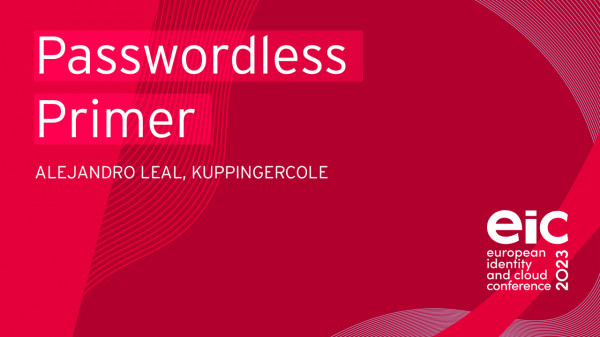
Passwordless authentication counts amongst the hot topics in IAM. In this session, the variants of passwordless authentication will be explained. Phishing resistance, device binding, secure elements, and many of the other technical aspects will be explained, put into context, and rated regarding their relevance for different use cases. The session also will discuss use cases and their specific needs, from simplified access to office solutions to a unified passwordless authentication for the entire IT environment.
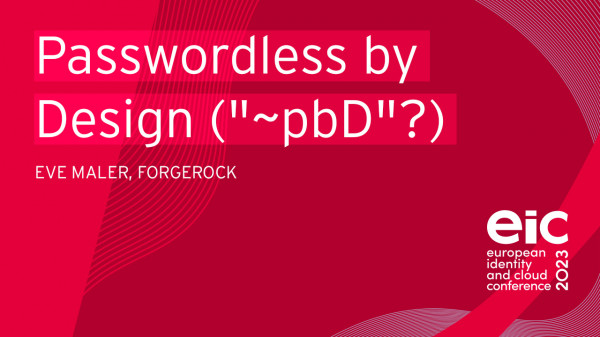
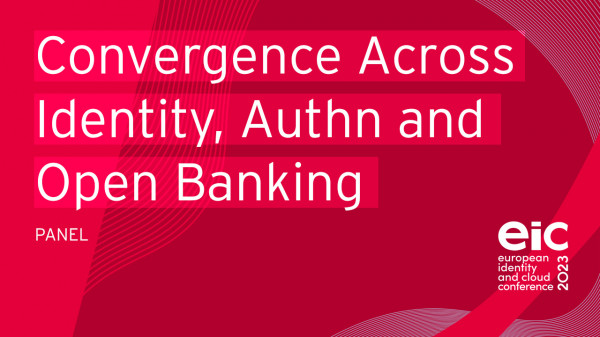
To date, the world has progressed identity, authentication, and open banking as disparate initiatives. While strengthening each of these independently has indisputably contributed to growing trust, bolstering data privacy, and mitigating the security risks that are today inherent in our every digital interaction, this ‘divide-and-conquer’ approach is unlikely to be sufficient to propel us to the best possible economic and user experience outcomes.
Join this panel of experts to understand how some of today’s most respected thought leaders suggest how convergence across identity, authentication, and open banking can accelerate our journey to a trusted digital marketplace- our collective North Star.
The whole is indeed much larger than the sum of the parts. Join us-
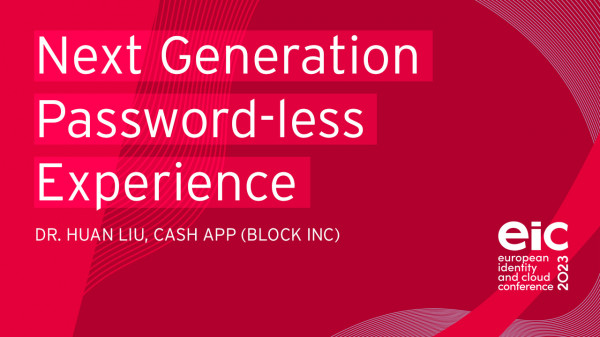
Cash.App is the #1 financial app in the US. It started out with a password-less authentication paradigm back in 2013, built around OTP verifications. We are now transitioning to the next generation password-less experience built around passkey. While the transition offers many promises, the path comes with several challenges, around security guarantees, backward compatibility and seamless user experience. We share insights we learned along the journey.
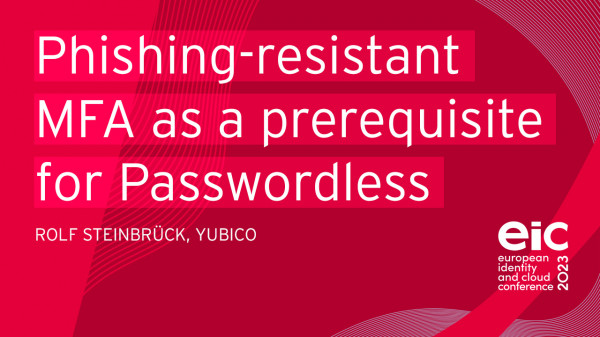
As long as passwords exist, enterprises are vulnerable to account takeover attacks –yet organizations looking to eliminate passwords may not know where to begin their passwordless journey. While passwordless authentication methods—especially those based on FIDO2—are widely available, they are not yet universally supported nor adopted. This lack of a universal approach can cause confusion and complacency—or both. Attend this session to learn why (and how) organizations should move away from passwords and legacy MFA to advance to and adopt a secure passwordless strategy centered on phishing-resistant MFA in 2023
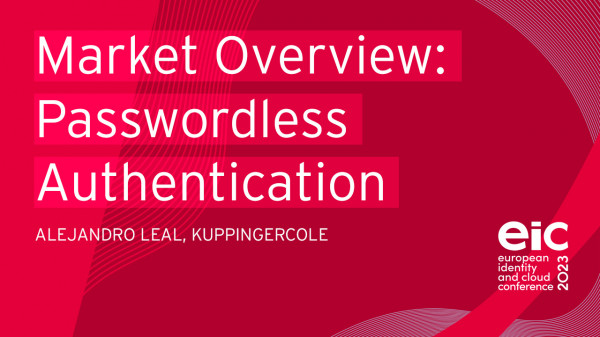
This session will provide an overview of the market for Passwordless Authentication products and services and will present a compass to help you to find the Passwordless Authentication product or service that best meets your customers, partners, or workforce needs. KuppingerCole´s Alejandro Leal recently published a Leadership Compass for Passwordless Authentication and examined the market segment, vendor product and service functionality, relative market share, and innovative approaches to providing Passwordless Authentication solutions.
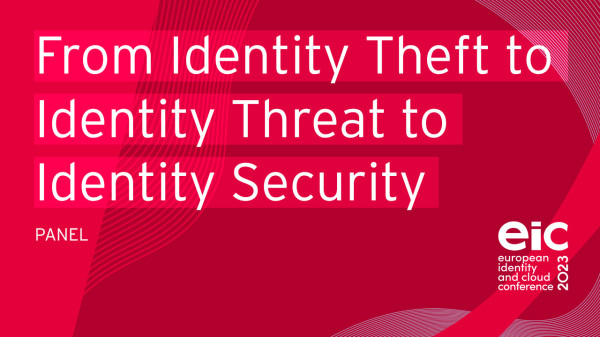
Identity has been always an ambiguous term. Identities exist in a sociocultural and organizational context and in technical ones. We have Digital Identities and eIDs and not only do individuals have identities but so do organizations and non-humans, especially in technical contexts.
Identities had been always under threat, starting with theft of individuals’ identities and credentials in the physical world, such as credit cards and passports. However, these threats have not been on a large scale. We all know that this has changed dramatically with the digitization of everyone and everything. Social engineering, phishing emails, buying credentials in the dark web have become a serious threat to businesses and individuals. These threats have reached new heights with the numerous attacks on identity infrastructures, be it corporate directories or government eID infrastructure.
In this panel, we will explore the identity threats to individuals and organizations, how they are managed, and how identity security can be achieved from a prevention, detection, and management perspective.
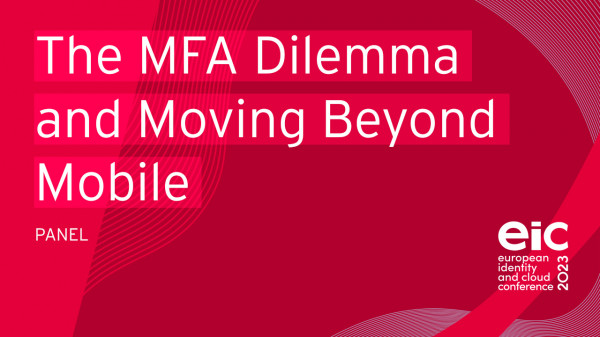
This panel will explore the current state of multifactor authentication (MFA) and its limitations, as well as potential solutions for improving the security and user experience of MFA. We will discuss topics such as the challenges of implementing MFA, the limitations of mobile-based MFA, and alternative methods for MFA, such as biometrics and behavioral analysis. The panel will also address the future of MFA, discussing the potential for new technologies to improve security and user experience, and the role of industry and government in shaping the future of MFA. Overall, the panel aims to provide valuable insights and perspectives on the multifactor authentication dilemma and the steps needed to move beyond mobile-based solutions.
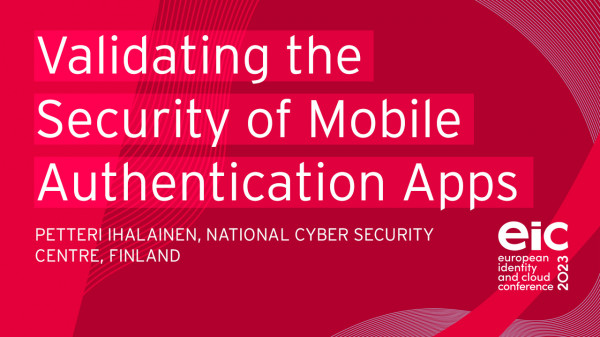
You are shifting through RFIs for a new mobile app based multi-factor authentication solution for your company. The vendors claim that their products are 100% secure and we all know that there's no such thing as a 100% secure solution, but it's marketing and you know how marketing sometimes goes overboard. How do you determine if the solution is actually fit for your appetite for risk? Can you be sure development time dev credentials have been cleaned up? Is the rooting detection any good? Does the app store plaintext credentials? Is it vulnerable or can someone build a scalable attack against the product you are about to acquire to protect your crown jewels? Let's take a look at different options out there and talk a little bit about what you can request from the vendors.
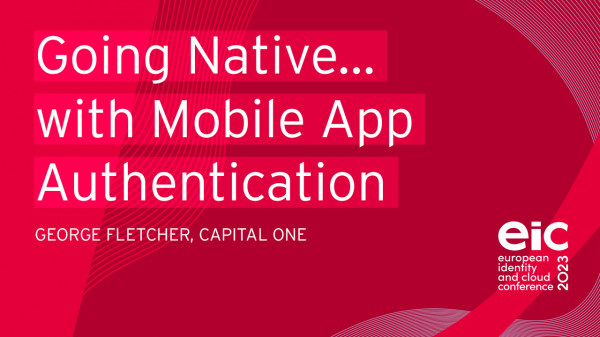
Today, industry best practice requires that the user experience for authentication and authorization require the user to use some form of browser to interact with the Authorization Server. From a product perspective, this creates a disjointed user experience and while there are good reasons for requiring the use of a browser component this is a very common discussion between product and security when designing a mobile app. This talk will propose an industry standard way to allow for native user experiences while covering the pros, cons and implications of doing so.
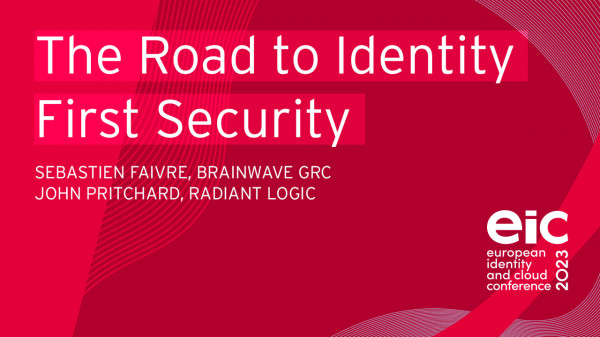
Data is foundational to business intelligence - but how do you translate that into identity governance? Today’s enterprise has unprecedented levels of real-time, rich identity data across multiple parallel sources. More data leads to more predictive power in machine learning algorithms. These runtime data driven insights can become a central component to a systematic compliance and risk management strategy. This session will highlight how identity data can be used to uncover patterns, anomalies, and outliers and radically improve decision making, supporting your Identity First Security strategy.
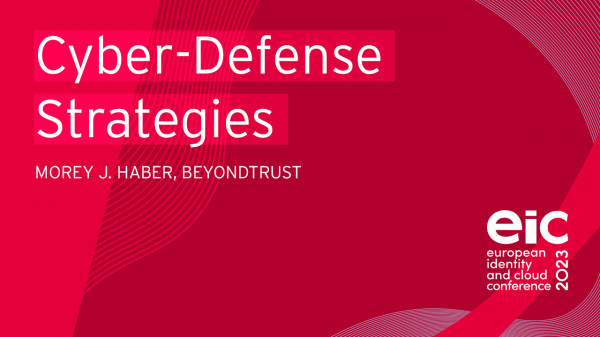
Cyberattacks continue to increase in volume and sophistication, targeting everything owned, managed, and serviced from the cloud. Attackers have also realigned their efforts, focusing on staying undetected, quickly monetizing exploitations, and publicly shaming organizations after successful breaches. BeyondTrust Chief Security Officer (CSO), Morey J. Haber will offer best practices for minimizing these increasingly exploited cloud attack vectors. Join him to learn cutting edge strategies for building the optimal cloud defense for your organizations unique cloud environment and identities.
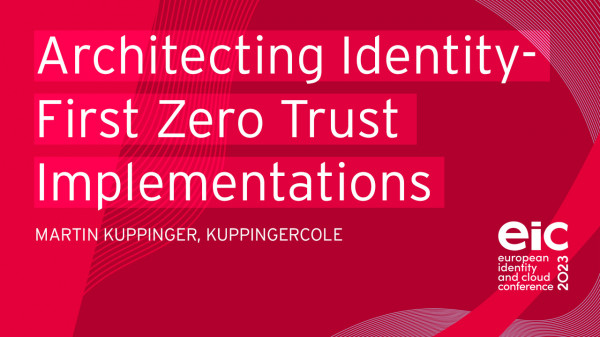
Zero Trust starts with Identity. It ends with authorization. And it is centered around policy-based controls for authentication, access, and more. IAM is ubiquitous in Zero Trust. Thus, every Zero Trust implementation must follow an identity-first approach.
In this session, we look at the intersection of IAM and Zero Trust, and provide a mapping of IAM capabilities to Zero Trust requirements. We also look at the need for modern IAM, from adaptive, passwordless authentication to continuous authentication, ITPR (Identity Threat Detection and Response), PBAM (Policy Based Access Management), but also Data Governance and the intersection of IAM and Code Security. This will help you in aligning your IAM and ZT strategies and give you a concrete understanding of technologies you will need (or not).
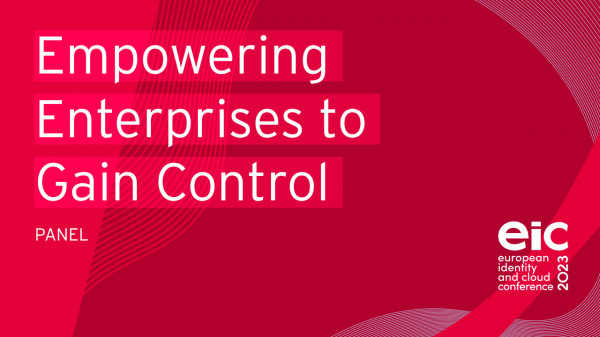
You often think service providers should build identity and API security infrastructure by themselves to have full control and flexibility so that it can fit into their business and technology stack. But it tends to be time consuming and costly due to lack of expertise to do so. Buying a heavy-weight solution is another considerable option, but it reluctantly leads dependency on the particular vendor of the solution, which may have redundant features and may not accommodate to customize in a cost-effective and timely manner. In this session, we will discuss a third option to “buy and build” that can combine the best of both worlds and give you control by building from scratch, as well as minimize the time and resource by leveraging “Identity Components as a Service.”
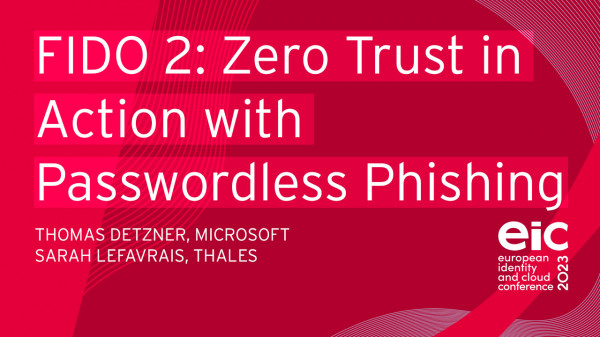
By now, organizations are well aware of the need for better protecting data and application with modern access management and authentication.
Thales and Microsoft partner to help organizations going passwordless to fight against phishing attacks. Thales and Microsoft experts Sarah Lefavrais and Thomas Detzner will talk about the role of Fido and other phishing resistant authentication methods like CBA in achieving Zero Trust approach.
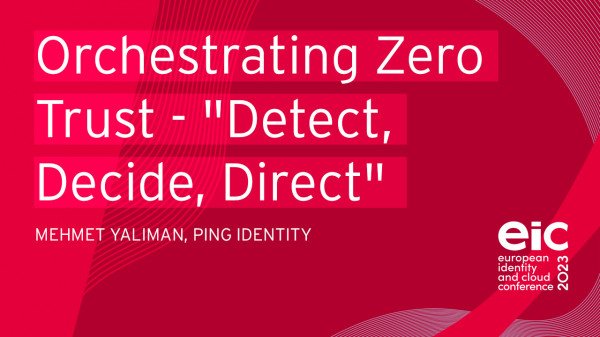
The Zero Trust paradigm, the approach of eliminating inherent trust in an IT architecture and always verifying, has been discussed for over a decade. It is well known that Zero Trust is a team sport, with Identity in the center. The many components, from IGA to Device Management, Network-segmentation to contextual awareness and beyond can be fulfilled by as many vendors, bearing the question about how to integrate these for a secure and convenient user experience. While there may be integrations available for some components, they will most likely be disjointed and/or require custom development, making it a challenge to be agile and innovative.
An alternative to the described problem would be Orchestrating Zero Trust, applying the approach of "Detect, Decide, Direct". Through Orchestration the task of gathering all signals and relevant information (Detect) for an appropriate authorization decision (Decide), and continuing with the proper next step(s) (Direct) can be fulfilled in a flexible manner, facilitating customization in a future proof manner.
In this session we will describe the "Detect, Decide, Direct" approach and see how Orchestration can be a key enabler of Zero Trust.
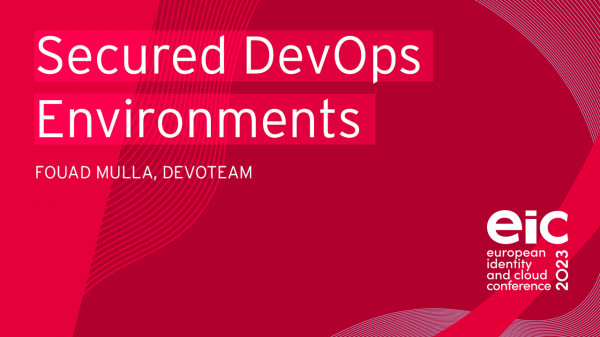
As organizations shift to agile development methodologies and the use of cloud-based platforms, they have the opportunity to leverage the cloud to improve their security practices. By adopting a DevSecOps approach, organizations can integrate security into the development lifecycle and take advantage of the scalability, flexibility, and automation capabilities of the cloud.
In this session, We will explore the benefits of leveraging the cloud for security in DevOps, and discuss the key principles of DevSecOps architecture, including collaboration, automation, and continuous integration and delivery. We will also examine the role of security tools and technologies, such as static code analysis, dynamic testing, and vulnerability management, in the DevSecOps process, and discuss how these tools can be effectively deployed in a cloud environment.
In addition, I will provide practical guidance and strategies on how organizations can implement the latest DevSecOps strategies in their cloud environments. This will include a discussion of best practices for integrating security into the development process, such as setting up security gates, implementing security testing early in the development process, and automating security checks.
Overall, this session will highlight the benefits of leveraging the cloud for improved security in DevOps, and provide practical guidance with the latest cloud technologies on how to implement DevSecOps effectively in a cloud environment.
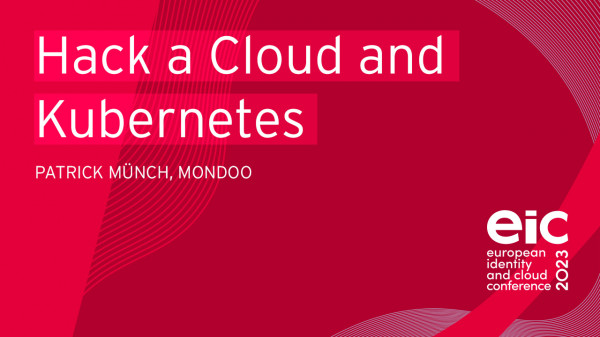
People are under the impression that when you spin up the latest and greatest AKS, EKS, OpenShift or GKE instance, that you're secure. However with K8S, now more than ever the workload underneath matters. One privileged, neglected, container can compromise an entire setup. Rather than just talking about the risks or best practices, this talk is all about showing how easy it is to do.
The talk will first discuss possible attack paths in the Kubernetes cluster, and what differences exist in the attack techniques compared to classic infrastructures. For this purpose, a web application in a container will be compromised, then the Kubernetes cluster and the cloud account. Subsequently, 2 open-source tools will be discussed how such vulnerabilities and misconfigurations can be detected in the different infrastructure layers.
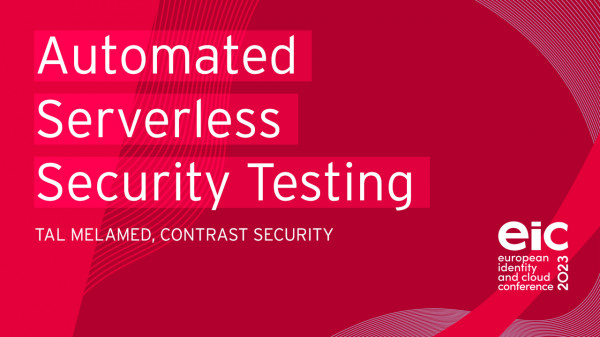
Serverless technology eliminates the need for development teams to provision servers, and it also results in some security threats being passed to the cloud provider. This frees up developers to concentrate on building logic and producing value quickly. But cloud functions still execute code. If the software is written poorly, it can lead to a cloud disaster.
How can developers ensure that their code is secure enough? They can scan for common vulnerabilities and exposures (CVEs) in open-source code. They can even scan their Infrastructure-as-Code (IaC) tool to identify insecure configurations. But what about custom code? At many organizations, the application security team struggles to keep up with the speed of development in a serverless environment. Traditional testing tools not only provide very limited coverage, but also slow development cycles unacceptably. Serverless code contains a mixture of cloud configurations and application programming interfaces (API) calls. As a result, legacy solutions lack the context that is necessary in a serverless environment, and the consequence is a lack of observability and slower response times.
Fortunately, it does not have to be this way. Organizations can leverage robust security during serverless development, automatically—if it is done properly. In this talk, we will discuss common risks in serverless environments. We will then cover existing testing methodologies and why they do not work well for serverless. Finally, we will present a new, completely frictionles
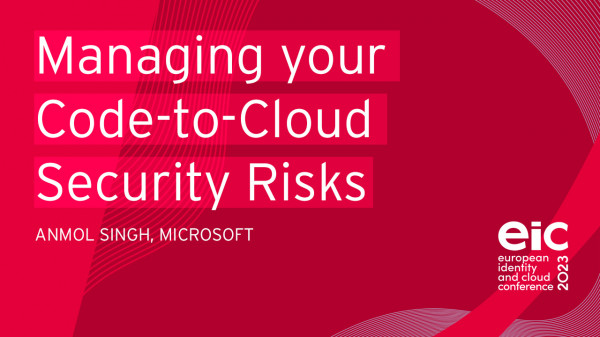
The shift to multi-cloud introduces a wide range of cloud security risks that remain unaddressed due to the siloed approach and limited focus of existing cloud security tools. Most cloud security tools offer highly focused solutions that are limited in scope and capabilities to address the growing spectrum of multi-cloud security risks. The convergence of IAM and multi-cloud security tools (CSPM, CWP and CIEM) offer a cloud security platform that takes an integrated approach to securely manage identities and their access entitlements to cloud resources for cloud-native application development, deployment and operations in the cloud. In this session, we will discuss:
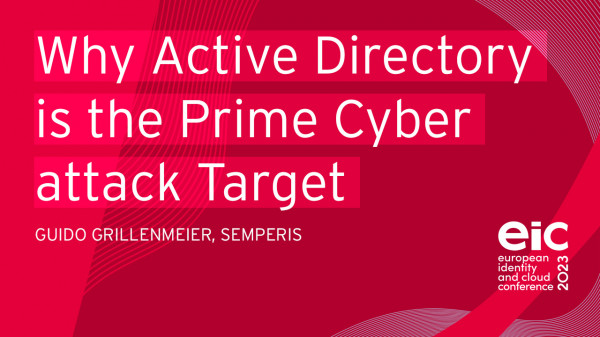
For more than two decades, Microsoft Active Directory (AD) has been the de facto method organizations use to authenticate and authorize users for access to computers, devices, and applications within a company’s network. Most companies still rely on it and have further extended its reach into the cloud by synchronizing their on-prem AD with the Microsoft Azure AD to allow proper SSO to cloud-applications by their users. AD is celebrated for its extensive compatibility with various applications and Windows editions, but that compatibility comes with security downsides.
Compromises of Active Directory can occur as an entry point leading to a further attack or can arise at various other points along the kill-chain following an initial compromise via some other mechanism. Even in cases where a compromise is gained following an attack on applications or infrastructure directly, it is frequently infeasible for an attacker to progress further without elevating privileges, making Active Directory a primary target in an overall breach strategy.
It is therefore important that Active Directory defense tools are paired with a wider Zero Trust and XDR approach to provide full visibility over organizational infrastructure, enabling security teams to accurately identify the point of origin of an attack, and to perform the containment and remediation actions required to neutralize and prevent reoccurrence of an attack.
Join Principal Technologist, Guido Grillenmeier, to discuss AD access points used in recent cyberattacks, security risks to watch for in managing AD with Azure AD, how to look for warning signs that AD has been compromised and steps to take in the event of an attack.
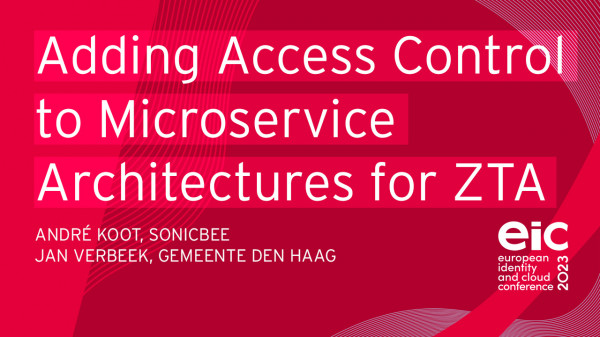
The Common Ground movement of the Dutch municipalities is developing innovative solutions for greater interoperability. An important part of this is the data landscape, where functionality is accessed through microservice API’s. In the analysis of this architecture, one aspect is barely touched upon: The Access Control aspect in API’s is not appropriately co-developed.
The Municipality of The Hague has performed a Proof Of Architecture (the POA) to demonstrate that it is possible to unlock an existing API in which access is not explicitly modeled, or that still uses traditional Role Based Access Control methods internally, restricting interoperability across contexts.
The POA is done in an effective and efficient way through innovative 'zero trust architecture' concepts, such as Policy Based Access Control. Security and privacy are thus demonstrably realized in accordance with legal requirements. The POA proves that it is technically feasible to add input-filtering of access requests to ignore the restricting RBAC method and thereby open doors for municipalities for interoperability in an autonomous and secure way.
During the presentation the working principles of API access from a perspective of Identity & Access Management are explained, but also how these principles can be applied in practice in an existing application landscape.
The presentation will be a joint presentation between the lead architect of the City of The Hague, Jan Verbeek, and access strategist André Koot.
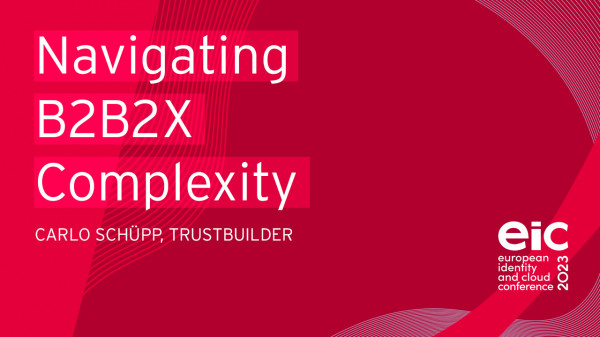
As ecosystems of customers, workforce, partners and suppliers become increasingly intertwined, companies face the challenge of managing access consistently. Companies often install different access systems for different populations, with different types of accounts and different lifecycle management.
This session presents an approach whereby different populations can be managed with a single system and a single user profile. Key in this approach is that the user profile indicates to which population (or more than one population) the user belongs. The approach also enables delegated administration and temporary accounts in a very intuitive way.
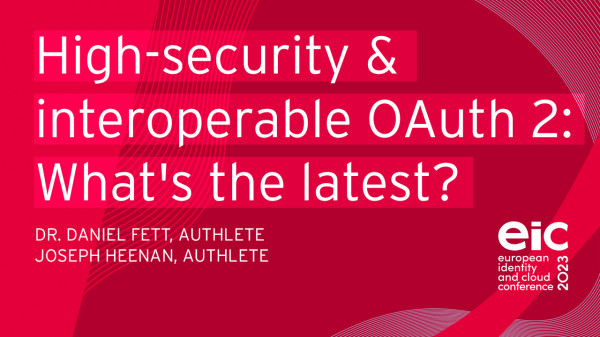
OAuth is a widely used authorization framework that enables third-party applications to access resources on behalf of a user. However, it has been historically difficult to meet very high security and interoperability requirements when using OAuth. Daniel and Joseph have spent much of the last five years working to improve the state of the art and will present the latest developments in the field.
There are challenges when trying to achieve high security and interoperability with OAuth 2: Many potential threats need to be addressed, some not part of the original OAuth threat model. To seamless authorizations, optionality must be minimized OAuth itself and also in any extensions
used.
Six years ago, the IETF OAuth working group started work on the Security Best Current Practice document and more recently on OAuth 2.1. Meanwhile, the OpenID Foundation has created FAPI1 and FAPI2 security profiles.
We will introduce these specifications and help you understand the focus of each document and when to use which. We show how to achieve on-the-wire interoperability and high security through the use of techniques like asymmetric client authentication and sender-constraining via DPoP and MTLS. We highlight the benefits for implementers and the role of conformance testing tools.
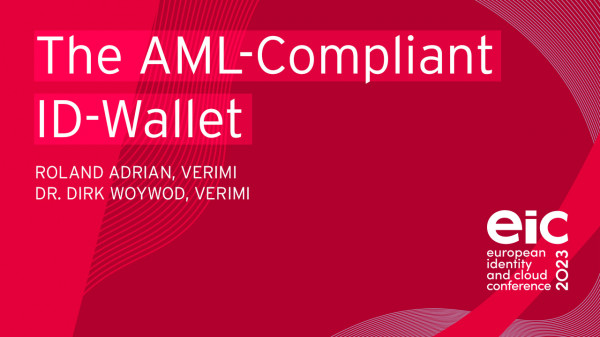
AML-compliant customer identification in the finance and banking sector (KYC) in Germany is subject to the requirements of BaFin (the regulatory authority) and the Money Laundering Act. This involves the use of both on-site and online identification procedures, which are often provided by external service providers as “critical outsourcing" and as data order processing. In the age of ID wallets, this KYC process needs to be redeveloped from a regulatory, data protection and technical perspective - especially because the regulatory framework currently does not (yet) explicitly provide for the case of an ID wallet. The presentation describes the challenges for ID wallets and ID issuers in the AML context and shows an exemplary implementation.
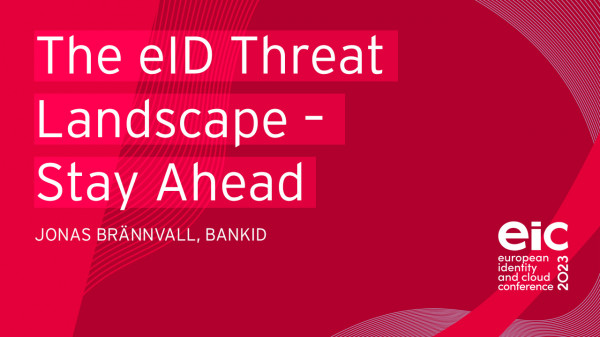
Cash grab-robberies are out, online fraud is in. When multinational hacker groups target senior and vulnerable citizens as a business model.
Learn how BankID is fighting fraud and helps you stay on top by identifying, preventing and notifying you of fraudulent usage in real time, while preserving top user experience.
The dream of tomorrows digitalized society is already a reality. Sweden is one of the world’s most digital and innovative societies. The fast and secure digital identification provided by BankID is a corner stone in this, to many, futuristic ecosystems. Many shops and stores do not accept cash and the amount of cash is low, something that inflicts digital threat. Studies shows a steep growth curve of digital fraud in several markets. In some places, fraud has surpassed drugs in turnover and profitability and fraud factories are popping up globally. Talented social engineering fraudsters and patterns with efficient crime-as-a service software, modus and tools. Fraud schemes including native and international fraud clusters targeting Swedish bank customers.
Learn more around the Risk and Anti-fraud toolset in the BankID Identity Platform. Digital identity is an area where the need for innovation is extensive. Whatever future eID scenario you discuss, security is always at the core.
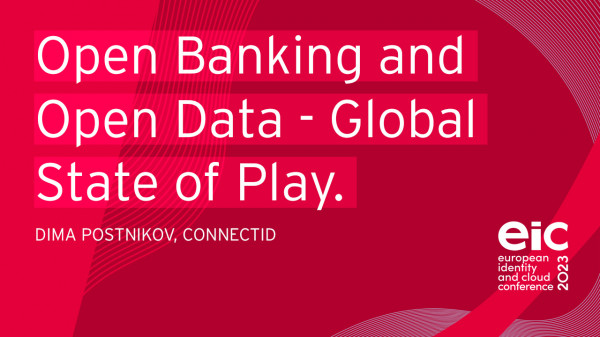
Open Banking is a true global movement that has already been implemented in many countries and being implemented in many others in the next few years. While the overall objective of Open Banking is the same, every implementation is different. This session will provide an overview of analysis of different ecosystems, different approaches to implementation, industry standards used, best (and worst) practices and potential future developments.
Identity and API security are key building blocks for any trust ecosystem supporting Open Banking. We will explore why every Open Data project becomes an identity initiative.
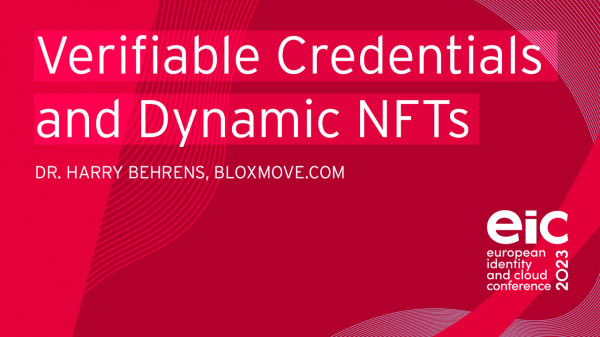
NFTicket is a protocol, which combines the identification power of cryptographic wallets with those of Decentralized Identifiers (DID). We will present that there is functional equivalence of Verifiable Credentials (anchored by a DID) and Non-fungible Tokens (NFTs, anchored by a wallet).
More that showing, we will be introducing a protocol which implements this, so that verified DIDs can issue “business facts”, such as: vouchers, tickets, membership passes, cerificates of ownership – in short anything which can be expressed by Verifiable Credentials.
NFTicket does a bidirectional translation of this VC to an enhanced ERC721 NFT, such that the DID of the holder and the owner wallet of the NFT correspond 1:1 are linked through did:ethr.
We will demonstrate the application of this protocol based on a pilot we have implemented for NRverse.io. The Verifiable Credential in this case being Renewable Energy Certificates which are used to decarbonize events with a measurable carbon footprint.
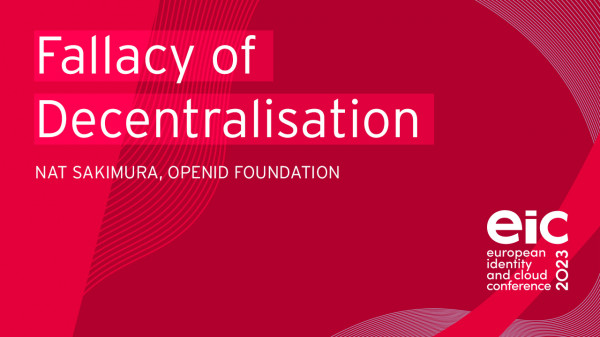
Common Web3 narratives go like this: Web1 was decentralised. Web2 is centralised and dominated by GAFAM/BigTechs. Web3 will be decentralised.
Is this real?
Let us look back. Web1 was about publishing web pages that were linked to other pages. The publishing sites were decentralised all over and were connected by links. Schematics resembled spider webs. Thus, the name “web”.
Web2 was the read-write web. In other words, API Economy. Was it a centralised architecture? Definitely not. What we imagined as Web 2.0 back in 2004 was that instead of monolithic systems, each site provides a function as REST API, and new services quickly emerge by combining these APIs like LEGO. APIs were decentralised and distributed all over the internet. API calling relationships connected those sites; the schematics resembled a spider web. Thus, the name Web 2.0.
Note, in 2004, none of Google, Amazon, Facebook/Meta, or Apple resembled what we have now.
Google just acquired Double Click, but it still had the banner word “Do not do evil.” The size of the company was 1/10 of Hitachi. Amazon still was an internet merchant. Facebook was just founded, but it still was primarily confined to Harvard and other American university students. Apple was an iPod and Mac company. Were they BigTechs? No! Big guys were IBM, Hitachi, etc., and Google, Facebook etc. were carrying the liberation torch!
Then, how come we end up here, despite the fact that the architecture was completely decentralised?
It was the combination of free market competition and technology that exhibited increasing returns. Any IT technology has decreasing cost/increasing return on investment. Under the circumstances, it will end up in Cournot equilibrium in a fashionable vocabulary - in a common word; winner takes all - monopoly/oligopoly. That’s how we ended up.
What about web3 and decentralised identity? Would the decentralisation dream finally come true?
Well, they still are IT. They still exhibit increasing return necessarily. Then, how can you believe that it will not be dominated by large players just like it happened to Web 2.0? If you let the free market play, it will certainly be. Unlike in the case of Web 2.0 where there still were 100s of thousands of IdPs, we may end up with two Wallets where the wallet provider can come in and decide to delete your verified credentials or ban your account. How decentralised!
Wait, there is more.
How can you believe that code that runs on your phone adheres to what it says?
The data stored on your wallet that runs on your phone may be extracting your data and sending it to criminals. We have seen many times that the initially benign code turns malicious with an update.
According to the Devil's Dictionary of Linguistic Dark Patterns compiled at IIW 2022b, “Decentralised” means “We run our code on your machine at your own risk”. Yes, at your own risk. If it is completely “decentralised” and there is no “provider”, then there is nobody to go after from the point of view of a regulator. Having a “centralised” provider is much better from a consumer protection point of view in this respect.
Is there no light? Are we going to live in the darkness of decentralisation?
Let us briefly think about what web3 was supposed to be. Forget about something that is found between A and Z. I am not talking about that. I am talking about cypher-punks' idealistic dreams.
Many people believe that blockchain is just an immutable ledger. No, it is not! That’s not the innovation of blockchain. Chained immutable records were there long before Satoshi’s invention. It is called Hysteresis signature and was invented in 1999.
Then, what was the innovation? it was the committing of the code into the it to make it immutable and executing it by multiple machines to exclude the result from changed code. In other words, it was the establishment of trust in the running code.
The light could be diminishingly small, but it still is light. That’s the light that I see in web3 that’s not between A and Z.
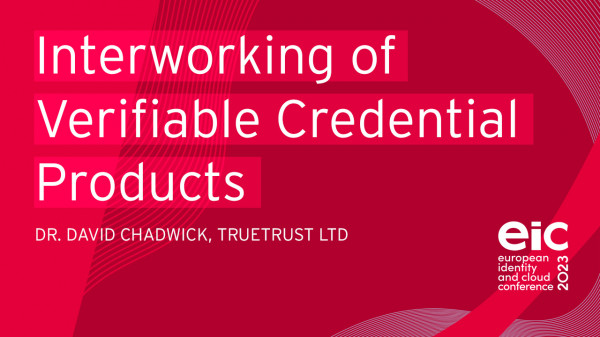
The EU funded Next Generation Internet (NGI) Atlantic project "Next Generation SSI Standards" and the Walmart funded Jobs for the Future (JFF) Plugfest, both have the same aim of fostering wide scale adoption of Verifiable Credentials. They are doing this by funding global interworking of Verifiable Credentials products from many different suppliers located in Europe, the USA and Asia. The NGI Atlantic project is committed to using the OpenID for Verifiable Credentials (OIDC4VCs) draft standard specifications, whilst JFF is allowing the 30+ participants to decide amongst themselves which protocols to use. Three protocol suites have been chosen: OIDC4VCs, VC-API with CHAPI, and DIDComm.
This presentation will provide an overview of the two projects, will provide an overview of the 3 protocol suites that have been chosen, and will present the results of the interworking trials.
The NGI Atlantic project will finish in December 2022, and besides interworking trials, will deliver an open source test suite that suppliers can use to test their implementations for conformance to the OIDC4VCs protocol suit for both credential issuing and verification. Some tests are being added to the W3C CCG Traceability test suite (written in POSTMAN) and some are being added to the Open ID Foundation's existing OpenID Connect conformance test suite (written in Java).
The JFF Plugfest will finish in 1Q2023. In November 2022 each VC Issuing software supplier must demonstrate the issuing of a verifiable credential to the wallets of at least two different wallet software providers, whilst each wallet software provider must obtain a verifiable credential from at least two other VC Issuing software providers. In February 2023 VC wallets must demonstrate the presentation of a Verifiable Presentation/Verifiable Credential to at least two different verification software suppliers, and each verifier must demonstrate that it is capable of accepting a VP/VC from at least two different wallets.
The success of these projects should catapult the acceptance of inter-workable verifiable credential products to the market.
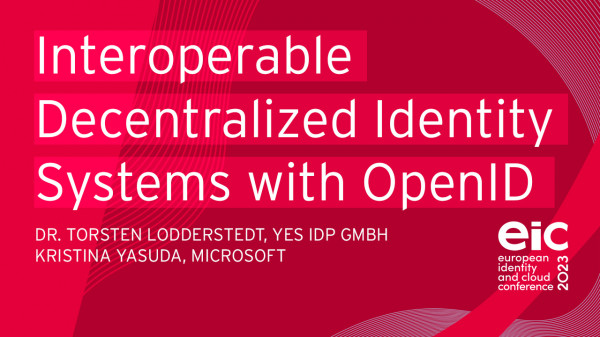
OpenID for Verifiable Credentials (OID4VC) is a set of protocols that enables issuance and presentation of verifiable credentials expressed in any format including but not limited to W3C vc-data-model and ISO/IEC 18013-5 mDL. The power of the protocols lies in its demonstrated simplicity, security, and the implementer's ability to make choices across the tech stack - not just for credential formats, but also entity identifiers, trust model, crypto suites, revocation mechanism, etc. However, this also means that to be interoperable and enable certain use-cases(s), implementers need to agree on the sets of choices across the tech stack, usually referred to as interoperability profiles.
In this talk, we will share implementation experience of OID4VC specifications, and introduce existing interoperability profiles based on OID4VC. Of course we will also provide updates to OID4VC specifications, how they have evolved from the last year based on an overwhelming amount of implementation feedback.
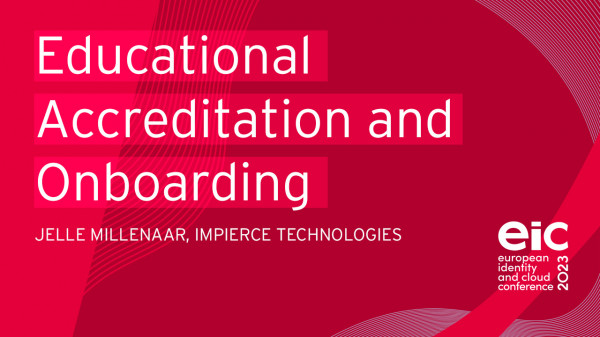
Skills not degrees are what matters in today's job market. Using SSI and OpenBadges standards, people can gain micro-certificates based on skills acquired during their studies, work, or volunteering. We will discuss what it takes for educational institutions and employers to adopt a privacy-friendly, frictionless, and more secure onboarding process for students and employees based on this technology. We will explore the new paradigm for IDaaS, an eIDAS 2.0 compliant process, and how we enable Life Long Learning.
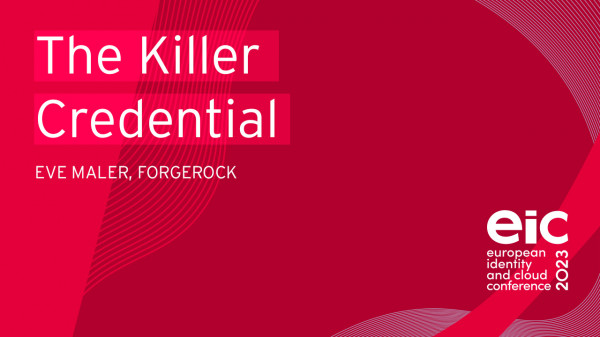
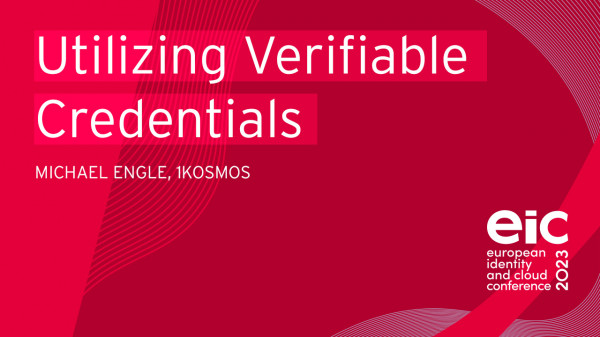
The W3C Verifiable Credential standard is getting traction in many circles. How can you use this today to help contractors and partners access your systems? It's easier than you think. See how this is an amazing alternative to federated authentication.
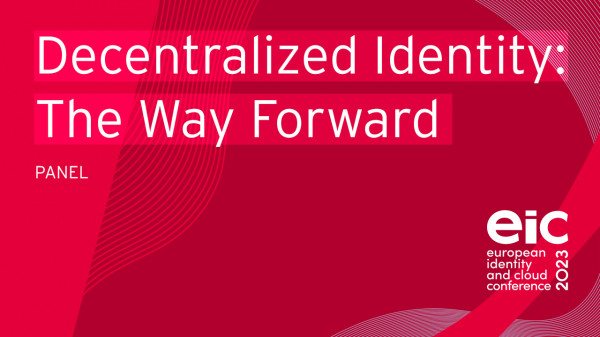
Decentralized Identity is enabling individuals and organizations to have control over their own personal data, providing self-sovereignty, privacy and security. But, is a relatively new concept with high development and standardization dynamics. In this session we will look into what we should do today to take full advantage of this promising concept.
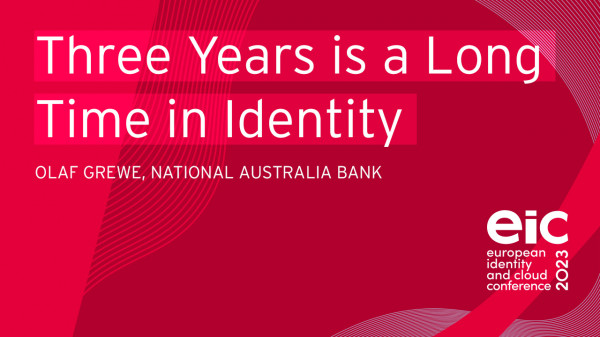
Landing in a new organisation with a declared objective to transform the way customer identity was done but no mandate was daunting. Being able to look back three years later and tick of an infrastructure consolidation, the deployment of a central authorisation solution, being on the precipice of participating in a Digital ID scheme, and having the Chief Digital Officer shouting from the rooftops about a universal login is priceless. Come along to hear me talk about some critical success factors, calculated risks, fortunate circumstances, and the incredible support of some incredible people helped make this happen. I’ll also touch on my personal journey from an engineering role to a product person to illustrate the increasing maturity levels we went through.
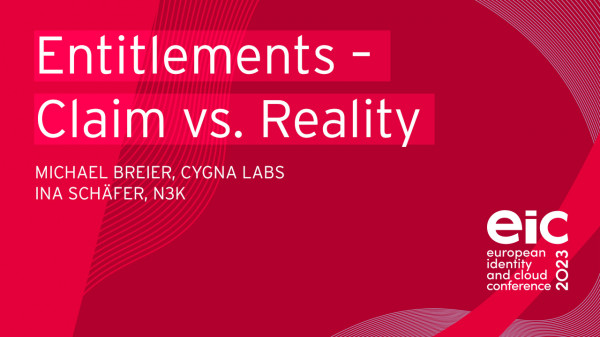
The claim or desire for authorizations, permissions and the rights set in practice often have a wide divergence. Typically, more rights are assigned unconsciously than were actually required.
The resulting vulnerabilities can have significant consequences therefore, it is essential to be able to monitor the true permissions at any time, regardless of how the permissions have been set. It is almost impossible to manage monitoring manually, even in small environments. Therefore, independent automatisms that can automatically explore, analyze and report the real settings are becoming a requirement.
In this session we will show you how Cygna Labs can support you in these challenging tasks and thereby ensure and improve security in your company.
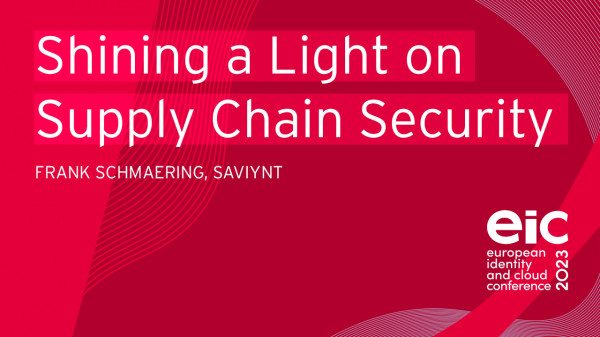
How do we control what we do not see?
Supply chains are like that. The problem is that while you may have sight of your nearest third-party relationships, if you look further out to their relationships, things start to become a bit obscured. And that is where the risk lies.
In recent years Okta, Toyota and Morgan Stanley have all suffered data breaches that originated with an attack on the supply chain.
In this presentation, we explore the complex nature of supply chains/digital ecosystems and all the parties involved. We’ll look at the pattern of some recent third-party attacks, examine their root cause and what lessons we can learn.
Finally, we'll explore the critical capabilities that are needed as the foundation for a solid third-party strategy; one that provides active, continuous monitoring while reducing the overhead for compliance.
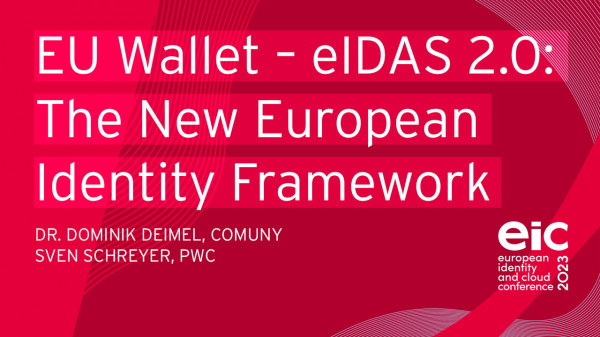
The existing eIDAS governance framework for digital identity is fragmented for different regulated markets in different EU countries. Today identity provider solutions for finance, healthcare and other regulated markets follow central approaches for the management of identities and consent in high secure data center environments and using legacy standards (e.g. OIDC, central public key infrastructure).
eIDAS 2.0 creates a EU wide identity ecosystem with adapted new standards, new stakeholders and a focus on using mobile devices. The existing roadmap allows to anticipate three to five years (or more) transition. For banking, insurance, healthcare or the public sector it is time to adopt these standards in their digital transformation strategy.
Based on the Gematik requirements for a federated identity provider with central OIDC compliant resource and authorization server Comuny shifted relevant identity provider functions (data storage + token generation) on the mobile device.
The speakers will describe challenges and solutions for this regulated market. They also discuss the chance to combine existing central OIDC flows with mobile decentral, wallet based principles as a bridge into the new eIDAS 2.0 governance framework. The audience will get a clear understanding about requirements, opportunities and practice details to create the transition into eIDAS 2.0 identity ecosystem.
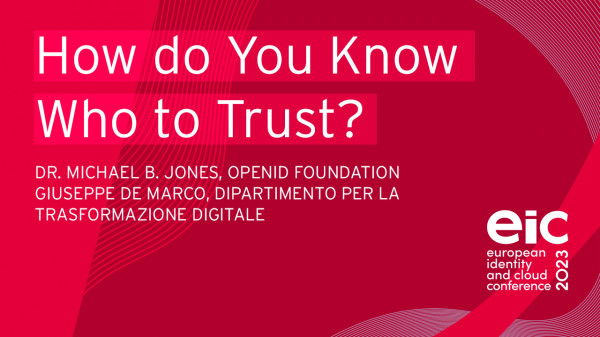
OpenID Connect Federation enables trust establishment at scale and is being deployed to do so in Europe.
A key question when granting access to resources is “Who do you trust?”. It’s often important to know who the party is that you’re interacting with and whether they’ve agreed to the terms and conditions that apply when accessing a resource.
OpenID Connect enables identities of participants to be securely established but doesn’t answer the question of whether a participant is trusted to access a resource such as your personal data. A complementary mechanism is needed to do that. In small-scale and static deployments, it’s possible to keep a list of the trusted participants. However, in large-scale and dynamic deployments, that doesn’t scale.
This presentation will describe how the OpenID Connect Federation protocol enables scalable trust establishment with dynamic policies. It does so by employing trust hierarchies of authorities, each of which are independently administered. Examples of authorities are federation operators, organizations, departments within organizations, and individual sites.
Two OpenID Connect Federations are deployed in Italy, enabling secure access to digital services operated by Italian public and private services with Italian digital identities. This presentation will also describe why OpenID Connect Federation was selected for them and how it meets their needs. OpenID Connect Federation is being used by the GAIN PoC. A public deployment is also being planned in Sweden.
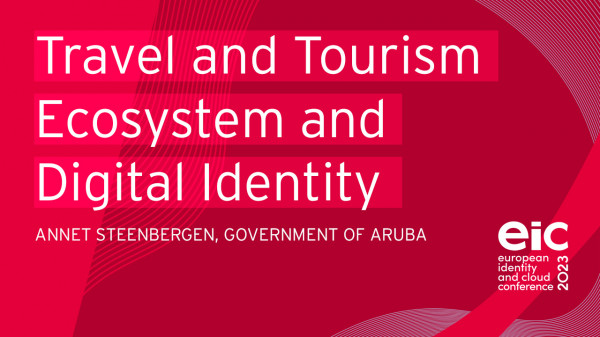
The ICAO DTC Type 1 and de mDL standard are currently being used/prepared to be used in several pilots. What are lessons learned, what impact do the panellists see and or expect. Also the EU Digital Wallet will have an important role in these developments. The travel ecosystem connects public and private parties around a traveller. Using a digital identity in an ecosystem that crosses international borders and legal systems is complex, for passengers ànd stakeholders, and requires international standards for technology, data privacy and trust frameworks.
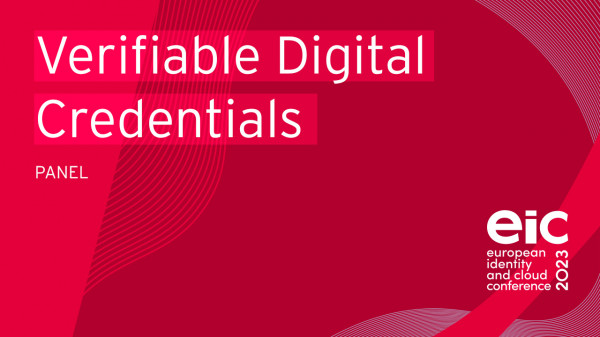
In 2022, several standards organizations and open source groups made great progress defining protocol specifications and code for the issuance of digital credentials. In this session, learn about and discuss some of the emerging issuance protocols, and compare their features, capabilities and trade offs.
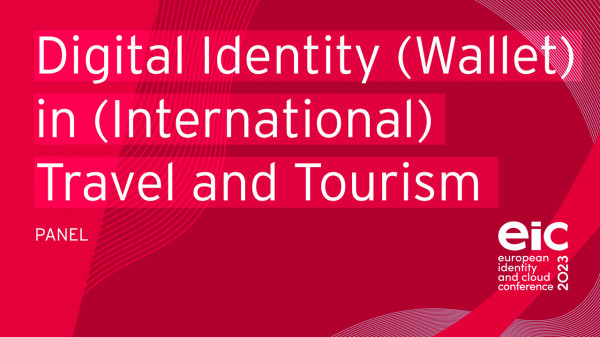
This panel discussion is addressing what is currently happening to make the travel and tourism ecosystem ready for the use of a digital identity that has the level of assurance to cross an international border, board a flight and sign in to a hotel. The travel ecosystem still revolves around a physical passport/ID card or drivers licence and this is about to see incremental, but pivotal changes. The digital wallet will also ad to the way we get ready to travel and add verifiable credentials that travellers can share in advance of their trip.
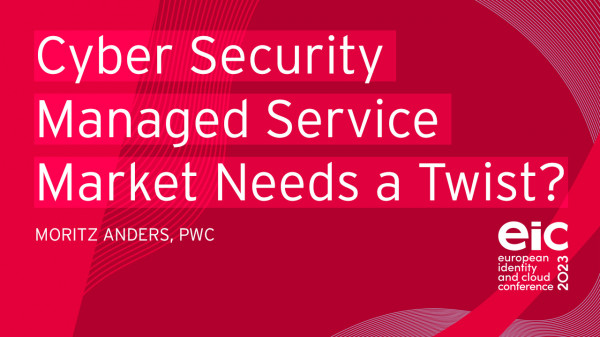
The Cyber Security Market has developed quite significantly within the last decade. The scarcity of expertise in the market, the increased number of attacks, the lack of leverage of product implementation ROI are a number of topics we will shortly address in this session. Why it is going to be key that companies should consider an outcome-based managed services going forward.
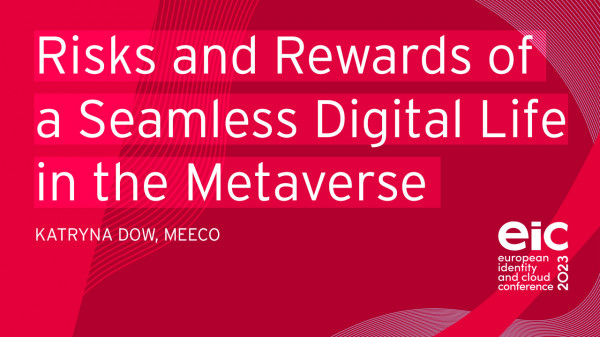
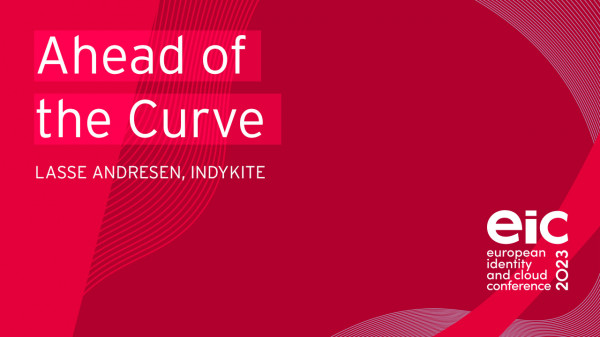
Companies today are being faced with business-critical yet seemingly conflicting topics; how to build trust, loyalty and personalized experiences that fuel growth in a world of fading cookies and GDPR. There has never been more urgency than now to focus on strategy and technology to meet the demands of the privacy-conscious consumer. The collection of data and its management is core to this challenge, but current identity methods are missing the opportunity to solve it with legacy approaches and risk-based thinking. At IndyKite, we believe that facing this mounting challenge requires us to make leaps in both our thinking and technology implementations. Join us as we challenge the current operating state and discuss what the world might look like when we have the tools to power a truly customer-centric ecosystem - one where consumer data ownership and personalized services that fuel growth are no longer at odds.
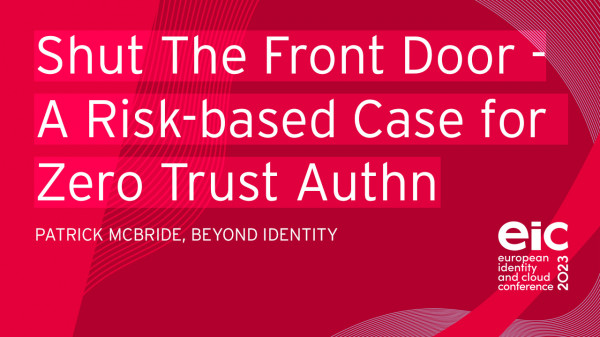
Authentication is broken, and longer, stronger passwords combined with first-generation MFA will not save the day. Hopefully, this is no longer controversial. We have over a decade's worth of data showing how most successful breaches involve stolen credentials. Now we are witnessing a rapidly rising number of breaches bypassing existing MFA. It is beyond time to address this problem head-on, but what are the key requirements for MFA that is up to the task? While the situation is dire, this will be a very hopeful view of the path forward. Help IS on the way!
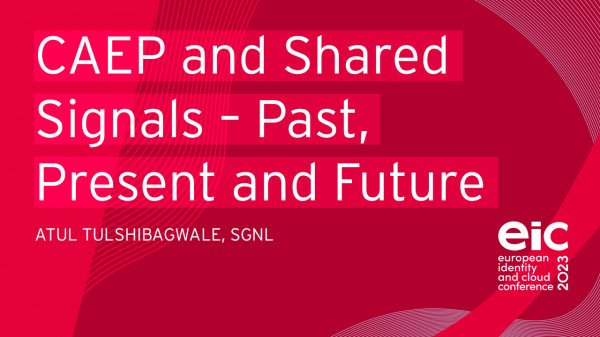
What started as a simple blog post from Google has rapidly ballooned into an industry movement. Major vendors have implemented the Continuous Access Evaluation Protocol / Profile (CAEP) and analysts, practitioners and decision makers agree that it is critical to the future of zero-trust. This keynote, by the inventor of CAEP, goes into the pain points that led to the development of CAEP, the process to recast it as a part of the Shared Signals working group in the OpenID Foundation and the trends that make it an indispensable component of any zero-trust architecture. CAEP’s non-prescriptive nature makes it easy for anyone to implement their own policies and the Shared Signals Framework makes communicating changes efficient and nearly instantaneous. A future powered by Shared Signals and CAEP enables enterprises and vendors to break information silos to create a highly secure outcome.
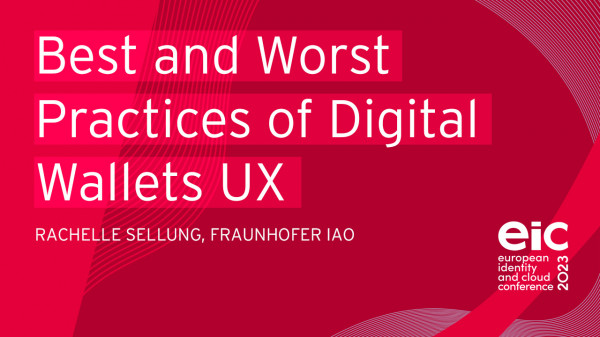
Digital identity wallets are central components for Decentralized and Self-Sovereign Identity (SSI) approaches. They are the interface for users to manage their identities and gain access to services. Hence, the usability and user experience of these wallets is pivotal for the adoption of those popular and privacy friendly identity management concepts. This talk will summarize research findings into naming some of the Best and Worst Practices to be considered in the further development of the user experience of Digital Wallets.
This talk would highlight multiple studies, publications, and projects that I have done on this topic. However, if you would prefer another topic, I could propose another talk idea that would be related to other identity topics in either the Digital Wallets, mGov/eGov Services, or Trust Management.
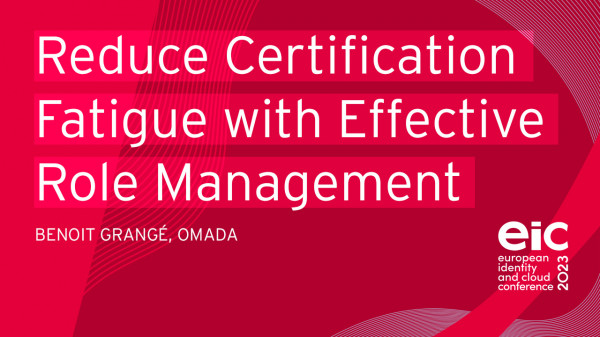
IAM and security leaders end up certifying far more access than necessary, owing to a failure to classify business resources. Furthermore, business users pay the price because they must spend an inordinate amount of time filling out these lengthy surveys. Benoit will show how to reduce certification fatigue through robust role management, which helps business users achieve better results while taking less time out of their day.
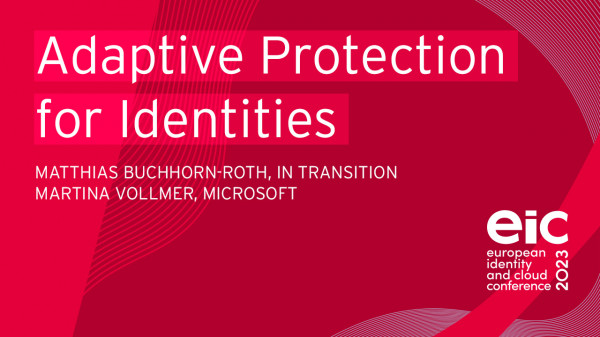
Decentralized Identity protection is important in data collaboration because it helps to protect the privacy and security of individuals and organizations involved in the supply chain. By ensuring that only authorized individuals have access to sensitive information, identity protection helps to prevent data breaches and other security incidents. A chain of trust establishes a series of checks and verifications that ensure that the data being shared is accurate and trustworthy. This is critical in the context of supply chain regulations, where inaccurate or incomplete information can have serious consequences for compliance and risk management.
In the second part of the talk, we will explore the concept of adaptive protection for identities in Microsoft Purview. By using a combination of machine learning, behavioral analysis, and risk-based decision making, we can create a dynamic system that adapts to new threats in real time. This approach offers a more proactive and effective way to safeguard identities, and can be applied across a range of industries and contexts. Together, we can work to develop a more robust and resilient digital identity ecosystem that protects individuals and organizations alike.
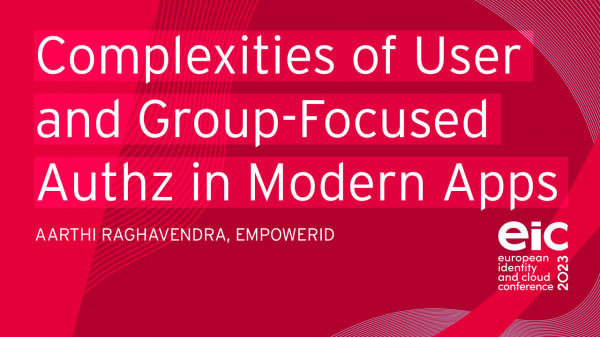
Authorization in modern applications is becoming increasingly complex, particularly when it comes to managing access to resources at the individual user and group levels. OAuth has become a widely-used standard for granting access to resources on behalf of a user, but it is not well-suited for these more nuanced use cases. In this talk, we will explore the confusion surrounding the use of OAuth for user and group-focused authorization in applications. We will discuss the standard meaning of authorization in OAuth, which is to grant access for an application to call APIs on behalf of the user, and how misusing OAuth for this purpose can lead to bad architecture and bloated JWT tokens. We will also introduce alternative standards like UMA (User-Managed Access) and GNAP (Group-Based Nested Access Protocol) as potential solutions for user and group-controlled resource delegation. These standards provide a more fine-grained and dynamic approach to access control and can be integrated with policies created by a PBAC (Policy-Based Access Control) server for a more comprehensive solution. Attendees will leave with a better understanding of the limitations of OAuth for user and group-focused authorization, and with a clear understanding of the potential of UMA and GNAP as solutions for these use cases.
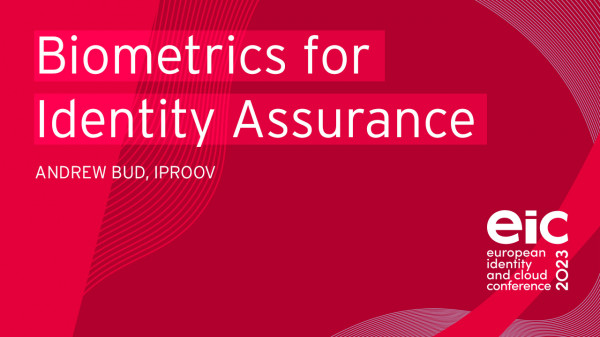
In many respects, identity programs are inherently vulnerable because they often rely on something that is shareable; something that a person knows or something that they have.
Join iProov to hear how biometrics can improve security for both digital and physical access. Included in this presentation will be guidance on: aligning biometrics to high-risk inflection points in the identity lifecycle; important considerations for inclusivity; and how to mitigate the risk of generative AI in modern attack methodologies.
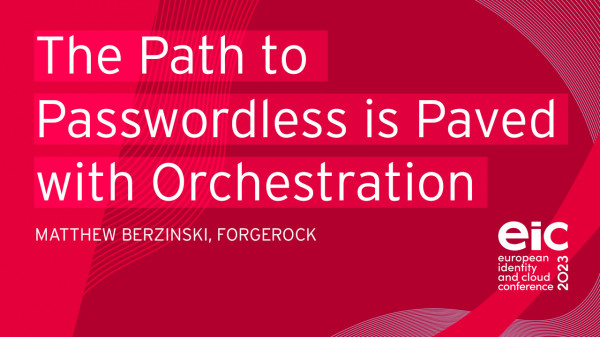
End-users have become accustomed to shopping, dining, traveling, learning, and caring for their health in an ever-more-digital fashion. Unfortunately, bad actors have put personal data at greater risk by perfecting a loop of using previously breached data to drive new data-rich breaches. We’ll examine:
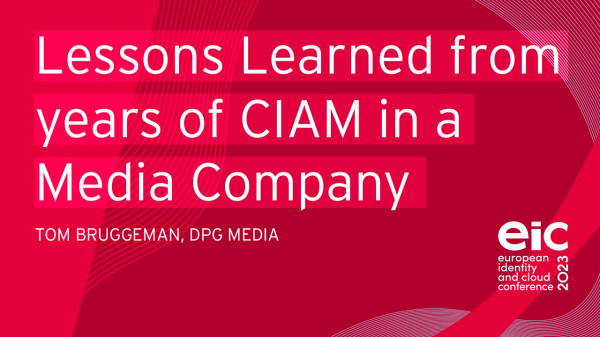
As an international media company we’ve been dealing with rapid digital transformation for a bunch of years now. One of the corner stones of our strategy is identity & access management for millions of users and customers. Over the last 6 years we’ve gone through many iterations of our Identity platform; from a fully managed SaaS platform to our own custom built solution. In this talk we’ll share our journey with you and highlight some of the challenges we’ve faced, how we’ve dealt with them and why we believe our homegrown platform has been the right choice for the company.
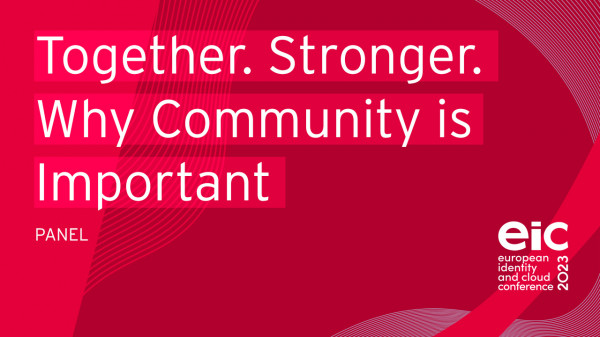
There are many benefits when we cross over the silos of vendors, clients and service providers
In this panel discussion, we will talk with community leaders in our industry about the benefits of community, how the power of community extends beyond peer-to-peer support, and accelerates business innovation, grows market share, and increases customer retention.
We will also talk about how they work to foster and engage the greater community, and why you should get envolved.
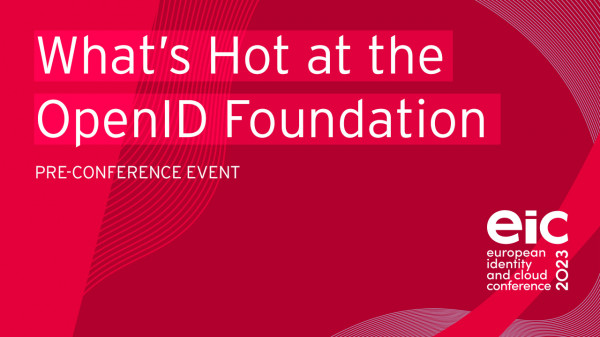
OpenID Foundation leaders and contributors will brief the EIC community on the latest progress and outlook for the OpenID Foundation. As part of this workshop we will cover:
Please join us early to be part of the conversation. Workshop presenters include Nat Sakimura, Gail Hodges, Kristina Yasuda, Torsten Lodderstedt, Tim Cappalli and others.
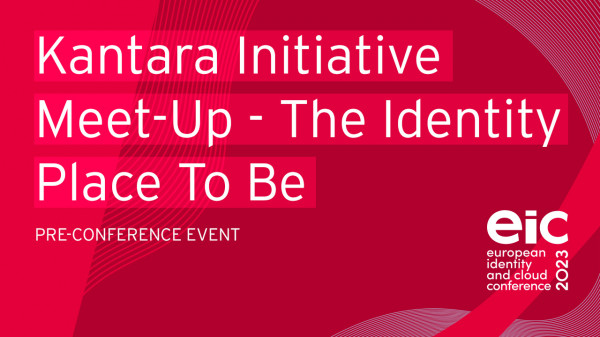
This workshop will feature the innovative and strategic initiatives underway at the Kantara Initiative. Where do you fit in and how can you benefit from all that Kantara has to offer? Key takeaways:
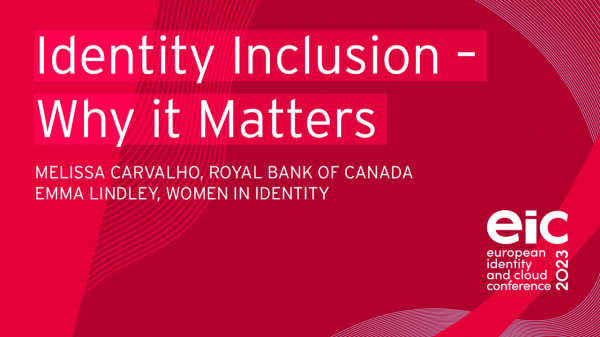
The cornerstone of the digital world is trust and key to that experience is a secure and verifiable digital identity. More than one billion people worldwide lack a basic verifiable identity. Without recognizable and consistent proof of identity there can be no financial, health, citizen, or digital inclusion. Women in Identity is a not-for-profit organization championing diversity and inclusion in the identity sector. Women in Identity enables change through awareness from our research projects (such as the code of conduct) and through our sponsors and members. In this keynote the chair and vice chair of the Board will share insights on the impact of identity exclusion and provide practical and pragmatic ways organizations and individuals can help drive Identity inclusion.
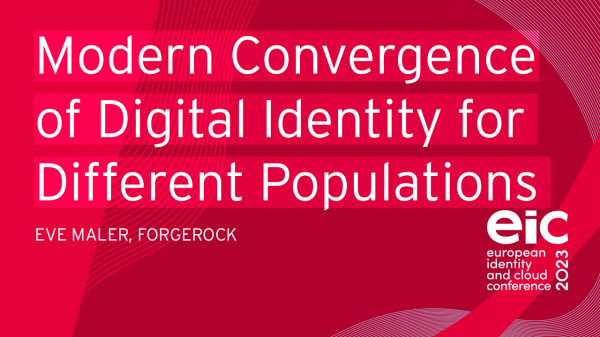
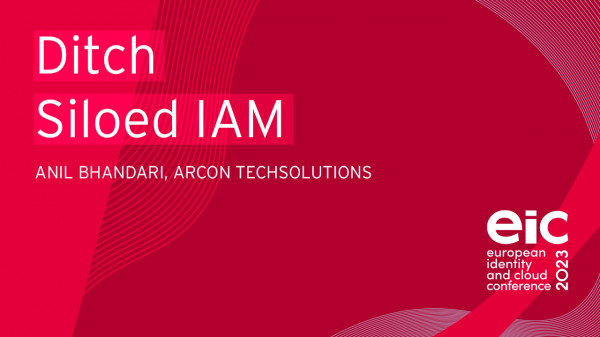
An increase in the types of digital identities, coupled with multi-cloud adoption, has added complexity to managing identities and privileges. How does one get future-ready, to address these new-age challenges? An Identity-centric security strategy centers on effective governance with zero trust, that simplifies and unifies critical aspects of Access Management (AM), Identity Governance Administration (IGA) and Privileged Access Management (PAM). Join us to explore the benefits of a Converged Identity security approach that is outcome-driven, and looks to ditch the silos of key IAM components.
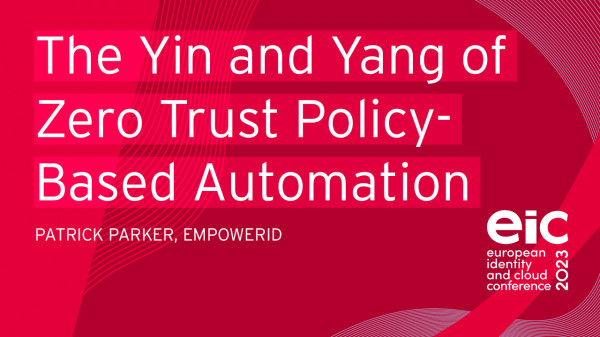
Today’s IT leaders are challenged to secure their complex multi-Cloud hybrid organizations while dealing with a severe cybersecurity skills gap and record levels of burnout and dissatisfaction from existing team members. The only way to overcome this challenge is more intelligent and pervasive automation to enforce policies governing access and behavior. IGA traditionally focuses on positive policies to grant access where appropriate, while Risk Management, as the other side of the coin, defines the negative; access, behaviors, and configurations to be prevented or at least identified and mitigated. In this talk, we’ll review how policies for granting and preventing access are complementary and form a balanced Yin and Yang for automation toward a Zero trust model.
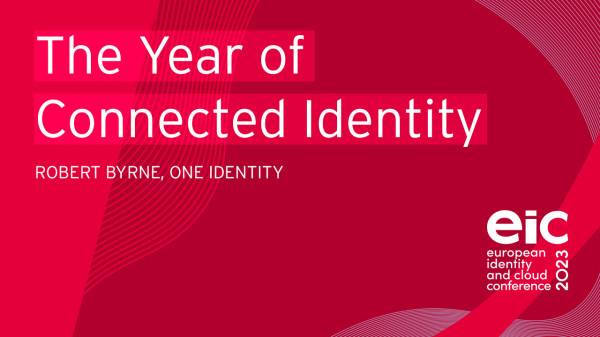
Cybersecurity practitioners agree that Identity is now at the heart of everything we do. A variety of inescapable forces have brought us to this point and our success in the next years depends critically on how well we exploit the strategically placed Identity center piece. Rising to this challenge requires our accumulated business analysis and deployment experience as well as the power of modern Identity platforms. Critical to realizing this vision is an integrated set of connected identity services that communicate seamlessly within the identity fabric but also across the wider Cyber security ecosystem. One Identity lives and breathes connected Identity, and we are happy to share our experience helping organizations achieve value from connected identity security models. Whether you are struggling to integrate your existing Identity silos, wondering what Zero Trust means for identity or looking to new Identity services like PBAC and decentralized identity, One Identity's innovative approach and design patterns shared in this session will be of interest.
Takeaways:
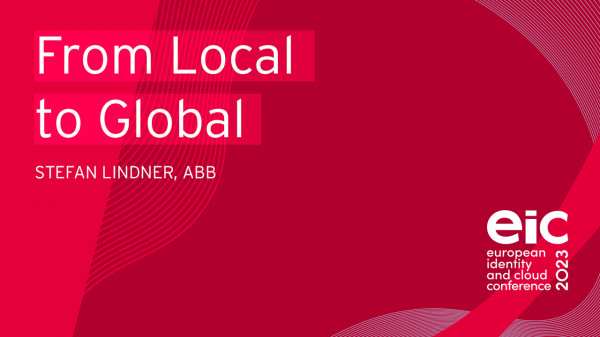
Identity governance and administration (IGA) is a mission-critical part of every business as it relates to security, compliance, and operations. For large, global enterprises like ABB, finding the right identity solution is especially important—and especially complex. With operations in over 100 countries, 180,000 employees and contractors, 13,000 servers, 6,500 applications, more than 100 HR systems, and a complex Active Directory implementation, this was a challenging undertaking.
In this session, attendees will learn how ABB leveraged its existing IT Service Management (ITSM) provider, ServiceNow, and Clear Skye, an identity governance and security solution built natively on the platform, to overcome the business complexities of implementing IGA. By aligning once locally managed systems across the business in one platform, ABB saves time, money, and frustration often associated with new tech integrations and onboarding processes. Stefan Lindner, Global Identity and Access Manager, will discuss how a strategic, platform-first approach to identity enables ABB to:
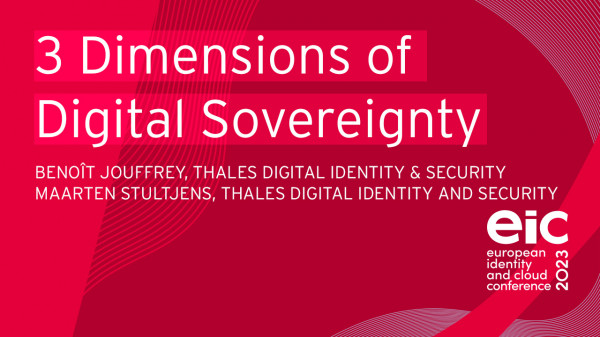
Digital sovereignty has become an important topic for individuals as well as a strategic issue for countries and businesses, allowing them to operate in an environment that they trust and can control. This necessitates technology that is not overly reliant on third parties, where there is a risk of misuse of trust or non-compliance.
In this session, we will explore 3 dimensions of digital sovereignty related to identity:
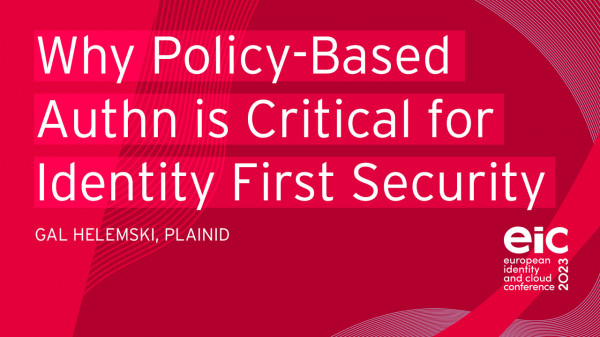
The enterprise perimeter is now its data objects, APIs, applications, and its users are now the workforce, customers, partners and in many cases, machines. In this new, decentralized, and highly segmented world, CISOs and IAM leaders find themselves struggling with multiple systems and interfaces that control the most basic question: Who has access to what and when?
In this session, we will present a new architecture for Identity First Security based on Centralized Access and Authorization Policy Management Platform, and discuss pro and cons, specific real-world implementations.
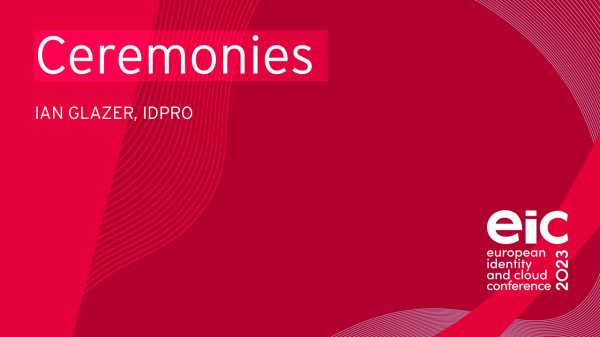
The act of identifying oneself to a website or service is a ceremony so common that we don’t often pay attention to it. The muscle memory we have built up over years of performing this ceremony over and over, day after day, obscures both potential changes to this not-always-so-simple act and ways we could make these ceremonies easier and more effective.
In this talk, Ian Glazer, will:
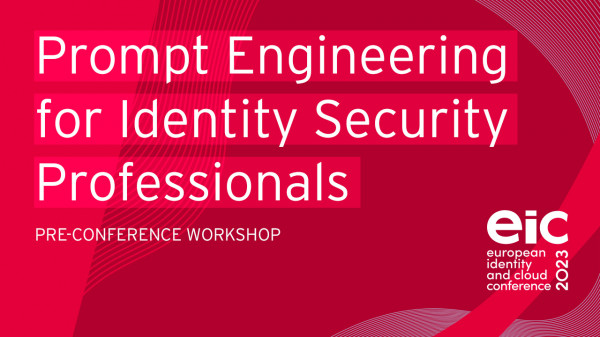
ChatGPT mainly is what you make out of it. If you are an author it will help you writing. If you are a tech analyst it will help you create a list of critical capabilities for a certain species of software tools. And if you want to hack into a network it will help you writing code that can be used maliciously.
A prompt guides language models like ChatGPT to create meaningful and useful output. This workshop will teach you the best practices for crafting prompts that result in meaningful and accurate responses. You'll learn how to structure your prompts to elicit specific information, as well as techniques for fine-tuning the model to suit your needs. Whether you're a developer, researcher, or just a curious individual, this workshop is designed to give you the skills you need to unlock the full potential of ChatGPT. Join us and take the first step towards creating truly intelligent conversational systems..
When we asked ChatGPT to create a workshop abstract for Identity Security Professionals, this was the output it provided:
"Prompt Engineering is a powerful tool that can enhance the abilities of identity security professionals to perform their job more effectively. The workshop will equip attendees with the skills they need to engineer AI prompts and leverage AI tools to research, communicate, understand new technologies and threats, understand malicious code, detect or scan for vulnerabilities, generate countermeasures, and summarize their findings and communicate status and results effectively.
Attendees will learn how to use natural language processing techniques and machine learning to improve the efficiency and accuracy of their work, and gain a deeper understanding of the most recent trends and developments in the field of identity security. Additionally, by providing an in-depth examination of the latest methodologies and tools used in prompt engineering, attendees will be well-equipped to stay ahead of emerging threats and secure their organizations' sensitive data."